Public Personality JEAN KITTSON and best selling author, shares her experience as carer for both her parents






Public Personality JEAN KITTSON and best selling author, shares her experience as carer for both her parents





Australian chef, restaurateur food author, and food manufacturer
Jean Kittson
Author, public speaker, actor, comedian and scriptwriter for stage, television, theatre and radio. Jean is the Patron of Palliative Care
Maree McCabe AM Chief Executive Officer Dementia Australia
Rachel Lane
Principal – Aged Care Gurus and Co Author of Aged Care, Who Cares
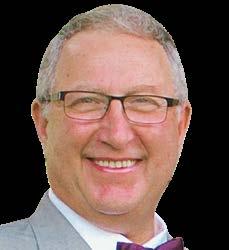
Paul Koury
Founder – Publisher Australian Carers Guide
Gemma Poole Australian Government Department of Health
Senior Media and Content Officer
OPAN: Older Persons Advocacy Network
Will Richardson Puzzles supplied by Richardson Publishing Group
Since the last edition, the ACG team and I have been up in Queensland for the Care Expo, where we met and spoke to hundreds of our loyal readers. This was our third expo in as many months, and I think we must have met more than 5,000 of our readers and many new carers that subscribed at the shows. It was fantastic to hear how many of you were also big Jean Kittson fans and were thrilled to see her on the cover of the Spring editions. We are so pleased to have Jean join us as a regular ACG contributor. Make sure you check out her article in this edition
Care & Ageing Well Expo 11–12 February 2023
ACG will also be exhibiting at the Care & Ageing Well Expo at Melbourne Convention Exhibition Centre from 11-12 February 2023. All visitors will receive a free subscription to our printed guides. So, if you happen to be in Melbourne at that time, come over to stand 107 and say hi!
As you may have noticed, one of Australia's well-known and much loved cooks, Maggie Beer, appears on the cover of this issue of our publication. We are so excited to have Maggie join us on two fronts. One is to help support and promote The Maggie Beer Foundation's innovative online training program for the chefs in the Aged Care sector. Maggie is on a mission to improve food and nutrition across aged care facilities around the country. The second is to bring you some of her mouth-watering recipes which Maggie will be supplying recipes for our Live well, Eat Well, Age Well food section of our magazine.
ello everyone! Welcome to the Summer 2022 edition of the Australian Carers Guide. We hope you've all been keeping well. A big thank you to all of you who write, email and call us to share your experiences, ask questions and also express your appreciation for the magazine. www.carerssa.org.au
Carers Week took place over 10 days in October. Carers of all kinds were engaged in a variety events and activities. Carers Week is a time when our Carer associations put aside time to acknowledge and give back to all informal carers for the wonderful and selfless work you do.

Along with Carers week came the release of the Carers Australia National Survey. Carers Australia conducted an in-depth survey of more than 6000 unpaid carers from a variety of caring roles. We have handpicked some of the results which you may find interesting. These insights will give you a good idea of the sentiment, habits and trends that have been developed by carers over the past couple of years.
We've been hearing and receiving a lot of reports on the positive results of Medicinal Cannabis. Elderly who has been suffering for a long time with chronic pain, report to reduce chronic pain have reported a dramatic decrease in pain since taking medicinal marijuana. We decided to take a deep dive into its true effectiveness and after talking with Dr Suzanne Graham, discovered its other major benefits in treating other ailments and unwanted side effects of other medications and treatments.
As our influence and readership grows, so does the demand for more information on a variety of issues that affect the carers of their elderly and
access to resources and practical support. To that end, we have overhauled our website and invested in offering our visitors any and all the information they want to know and need to know. As people enjoy consuming information in a variety of ways, we have been mindful of delivering our content in written, visual and audio formats. Under Free Stuff, we've included all our back issues and as a string of helpful videos as well as a comprehensive number of podcasts for those that prefer to listen. Check out our new website at: australiancarersguide.com.au
Sign up to our newsletter!
While you're on our site, don't forget to sign up to receive our weekly newsletter directly to you inbox every Tuesday. Our newsletter is jam packed full of practical information, offers from our advertisers and news you can use. We will keep you updated with everything of significance that happens in between editions Can't wait? Then Join our Newsletter HERE.
The Australian Carers Guide




The Australian Carers Guide is produced four times per year in Print, Digital and Online formats. Subscription offers are inside.

If you would like to put forth your suggestions, ideas or any feedback, please send emails to:
Editor@acguide.com.au or write to us at: PO Box 6155 Wantirna VIC 3152

Paul Koury – Publisher
Please be part of our community and stay in touch with us on Facebook. australiancarersguide.com.au facebook.com/Australiancarersguide
Whether you’re new to caring or have been providing care for many years, you will find something interesting, meaningful, and entertaining in every edition. Enjoy
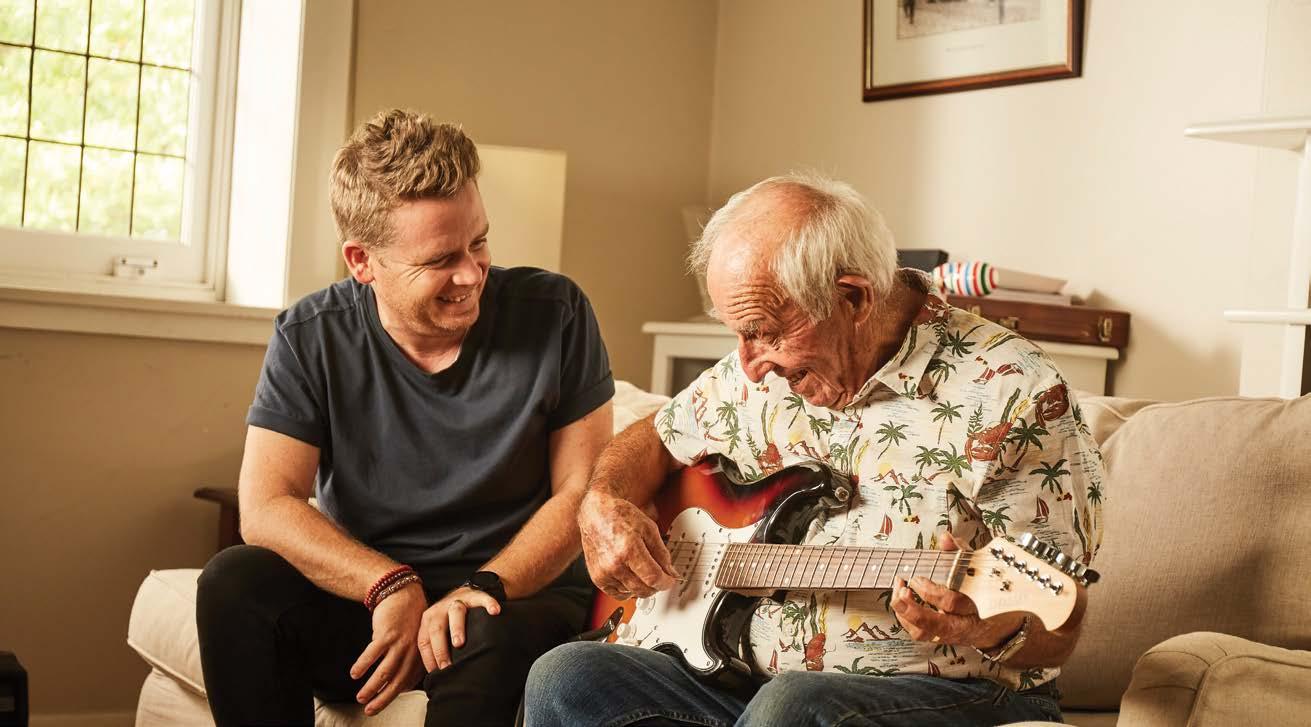
You can't turn on the TV, listen to the radio or read a newspaper without hearing about someone being scammed. Unfortunately, seniors are the most vulnerable. In this article, we'll reveal the most common tricks scammers use on the elderly and how to protect yourselves


Australia’s much loved comedian, Aged Care advocate and public speaker and carer for her parents ,Jean Kittson shares personal stories from her best-selling book 'We need to talk about mum and dad'. In this issue she shares about sibling personalities as carers. Which one are you?
We all feel stressed from time to time but if stress is a constant, its consequences can be unpleasant. We help you to learn way to live in the sweet spot between stretched and stress.

Since its legalisation in 2016, medicinal cannabis has been gaining more and more popularity. The reason is because of its ability to drastically reduce chronic pain and the side effects of other treatments.
What is transition care and are you prepared? When your elderly loved leaves hospital or respite care, there is much to consider. Are you prepared.? This article will tell you the process and all the things you'll need to know

T he Australian Carers Guide is a valuable resource for everyone who is caring for an ageing parent, spouse or an elderly loved one.
Out of the 2.7 million informal carers in Australia, 1.3 million care for their elderly family members or a loved one.
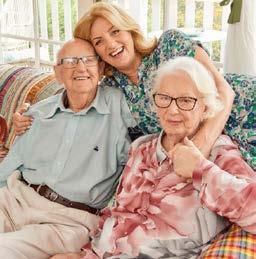
Until now, there has never been anything in the mainstream market specifically for our family carers. Our guide delivers useful and practical information, all geared toward the carers and their well-being.
We get so many questions about what to do if your elderly loved one that you are caring for is angry, negative and always being difficult . It's not easy but we share a few ideas and provenstrategies that have helped other carers better manaeg.
As the years roll on, our elderly loved ones can sometime forget common everyday things. One thing can has helped many carers manage the loved ones is to make it visual and place signs and notes in the common problem areas.
At Lite n’ Easy, we believe the secret to ageing well is to simply eat well.
Lite n’ Easy is more than just a weight loss solution. We also offer affordable, tasty meals (there’s over 235 to choose from) designed to promote healthy eating, well-being and a better quality of life. There’s no need to shop, cook or clean as our meals are delivered to your door so you can enjoy more free time and independence.
We have even introduced a new range of ‘My Choice’ dinners, soups and desserts designed for people who have a reduced appetite or find it difficult to eat normal sized meals. They provide the same energy and protein as our standard dinners but in a smaller portion, making them easier to finish.
Lite n’ Easy also partners with most Home Care Package providers across Australia, so that seniors can have affordable access to healthy, delicious meals. If you’re eligible, you could save 70% off the cost of your meals.
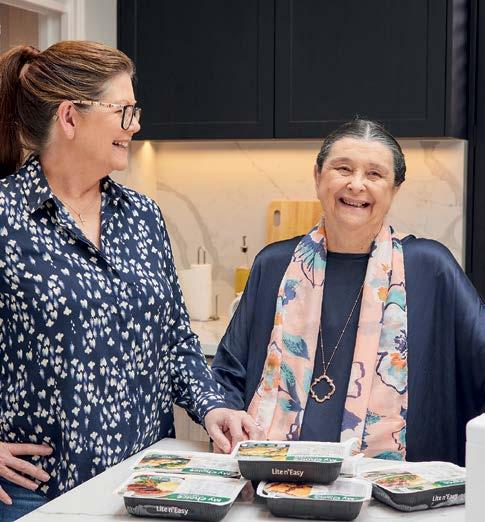
Lite n’ Easy’s service is flexible with no lock-in contracts or subscriptions, so customers are free to order week-to-week as required. Think

10
Two colorful pages dedicated to a variety of variety of useful tips, wise advice and helpful tips.
Publisher
PAUL KOURY paul@acguide.com.au
Advertising Sales
MARYANNE SCORRINGE maryanne@acguide.com.au
Design
SUZ MISSEN suzanne@acguide.com.au
Production Assistant
KRISTY HATTON production@acguide.com.au
Content Advisor
JUDYTH GLANVILLE Highlandmarketing.com.au
Distribution/Circulation
STEVE BISSETT
Are Media Pty Ltd
PAK Allied Media ACN; 34 611 117 303 Suite 3/13 Elm Street Bayswater Victoria 3153 Tel: 1300 717 515
The Australian Carers Guide acknowledges the Wurundjeri People as the traditional custodians of the place we now call Bayswater, where this magazine is published. We pay our respects to their Elders past and present and emerging.
13 42 70 80 84 90 98 108
This is where we answered your letters. We love receiving your feedback on articles that touched you and reading all your with us and share anything that’s on your mind.
DEMENTIA – It's OK to lie?
One of the symptoms of Dementia can be believing things thatyou know are untrue but it is very real to them. Maree McCabe CEO of Dementia Australia shares some strategies on how to respond effectively.

In this edition we provide an overview of some of the changes the new Government are making to improve aged care in Australia.
FINANCE – Retirement cost explained Rachel Lane founder of Aged Care Gurus looks at retirement options and explains the cost associated with the various options available.

If you need a laugh or just want a shift in mood, the comic corner is for you. Here youll find a few jokes that are carefully selected and sure to brighten up your day.
If you're considering a granny flat for your loved one, there are important thing to consider. This article will inform you on what are the important things to consider.

One of Australia's most well-known and much loved cooks, Maggie Beer, has been on an important mission. A food mission for older Australian's that is. Maggie shares her delicious summer recipes sure to delight your soul and your taste buds.
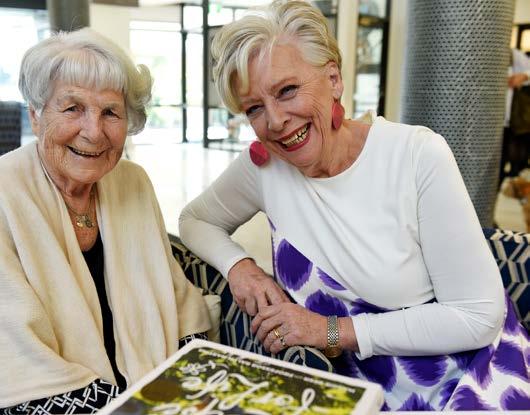
TIME-OUT – When you need a break

SURPRISING HEALTH BENEFITS OF GARLIC

One of the outcomes of a Home Care Package is to help you keep your independence as you age and to keep you in your own home as long as possible. To help you maintain the lifestyle you want and to meet all your physical and social goals. From social outings to maintaining your home – but how do you do it and most importantly maintain your independence.

CARROTS

Source healthline.com
Managing your Home Care Package yourself can be a way that you continue to exercise your independence, choice, and control. After being approved for a home care package, your funds belong to you, and you can spend them wherever you wish. Therefore, it’s beneficial for you to become knowledgeable about exactly how and why your package funds are spent. And since no one understands your aged care needs better than you, in many ways, no one is better qualified to manage your care.
THE WORLD’S POPULATION IS RAPIDLY
The number of people aged 60 years or older will rise from 900 million to 2 billion between 2015 and 2050 (moving from 12% to 22% of the total global population).

Population ageing is happening more quickly than in the past.
AGEING
For example, while France had almost 150 years to adapt to a change from 10% to 20% in the proportion of the population that was older than 60 years, places like Brazil, China and India will have slightly more than 20 years to make the same adaptation.

When it comes to health, there is no 'typical' older person Biological ageing is only loosely associated with person age in years. Some 80 year-olds have physical and mental capacities similar to many 20 yearolds. Other people experience declines in physical and mental capacities at much younger ages
Source: World Health Organisation

people using aged care are females.
Source: Australian Bureau of Statistics
1 Loss of muscle mass and decreased core strength, leaving your spine and joints vulnerable to injury.
2 Loss of elasticity in tendons and ligaments, which reduces flexibility and range of motion in your joints.

3 Loss of cartilage in your joints and spine, which results in less cushioning.
4 Deterioration of balance, which increases the risk of accidental falls and decreases your athletic performance.
Source head2toeclinic.com
Awesome news for yogis: centering your chi greatly reduces stress, fights off anxiety, and can lower your risk of depression.
Exercise your brain while you exercise your body! Breaking a sweat can improve your ability to multitask and boost productivity.
Even just 20 minutes of exercise helps your brain process information and improves your memory functions. In another study, exercising boosted women’s performance on memory and problem-solving tests by 20%.
Plus, it’s great for your career: employees who exercise regularly are 15% more efficient and 23% more productive! Fitness is also important for older adults. You may have heard about the hippocampus, the part of your brain that forms long-term memories, it shrinks with age. Good news: seniors who exercise for 45 minutes, three days a week can actually reverse that age-related shrinkage by one to two years.
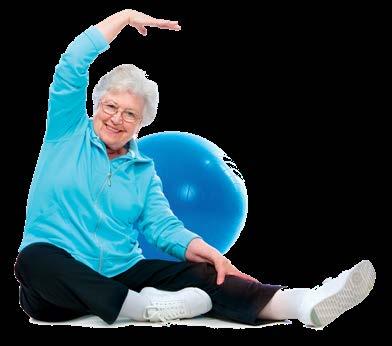
Source: National Library of Medicine
YOUR BRAIN NEVER STOPS GROWING: WE GROW NEW NEURONS WITH TIME, AND THE BRAIN IS CONSTANTLY RESHAPING ITSELF IN RESPONSE TO LEARNING.
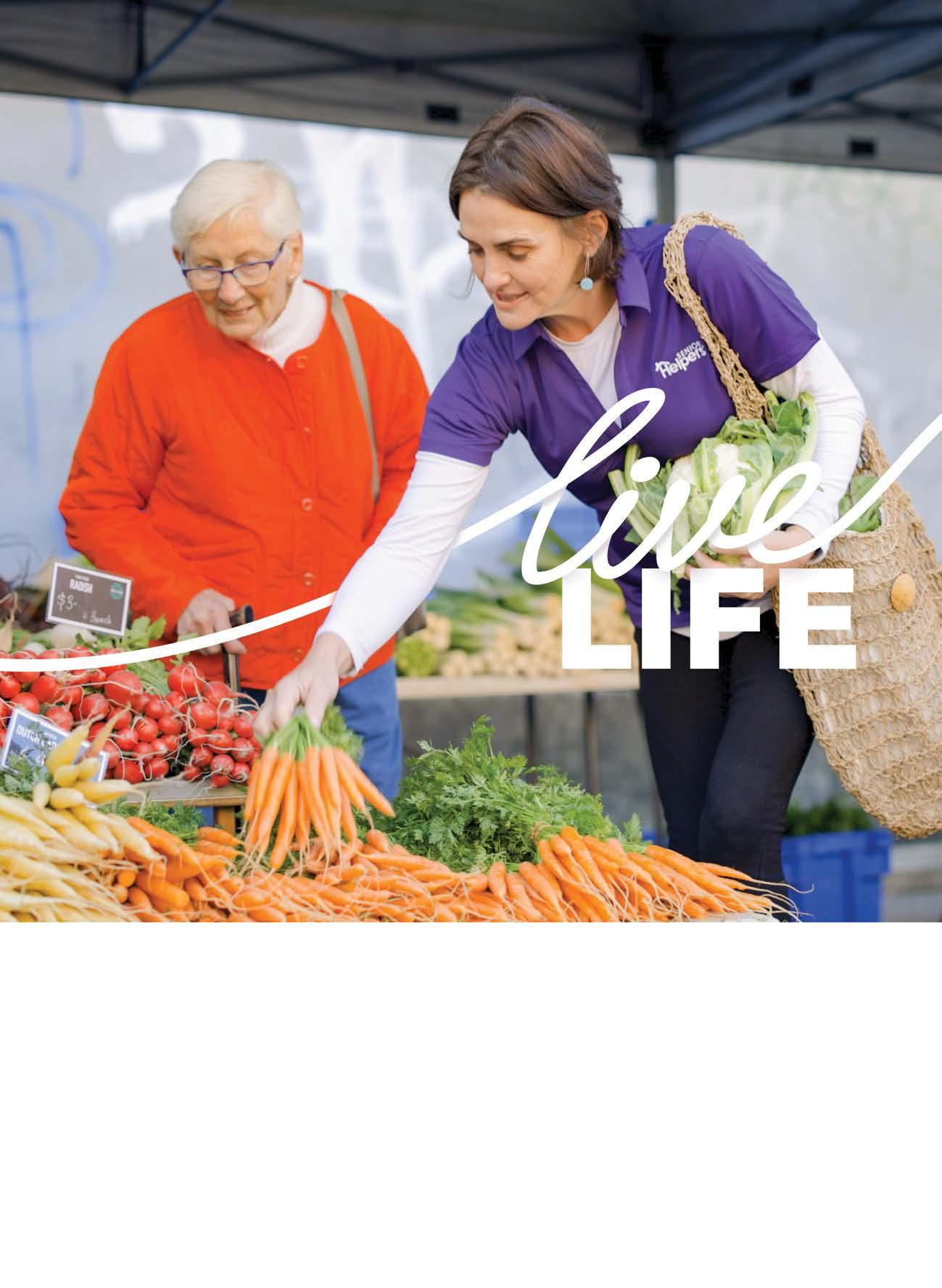


Hello fellow carers, �� We continue to receive so many emails and hand written letters with your feedback and stories. We enjoy reading them and again it was hard to choose which ones to publish. I think we might have to allocate an extra page to add more of the wonderful feedback we receive.

Your article on ways to improve your balance was fantastic.
I now know how mobility decreases and ways to help my 94 year old father be safer. How easily you explained things.
Dad is moving around more and is stable on his feet again.
David Bentleigh VIC� Knowing what to do about changes of balances is an important part of caring for your aged loved one. We are really glad our article helped you and your father.
I took your sleep assessment from your last issue and it helped me to identify some of the issues that have been interrupting my sleep. I do breathing exercises every night and it really helps me to sleep.
Eileen Hawthorn VIC� Sleep is so important for all of us especially when we care for others. My favourite sleep tool is soothing music and I listen to soothing ocean sounds with dolphins each night. I always try to make sure my sleep environment is peaceful and not chaotic.

Yum! We tried the quiche recipe from and wow it was so delicious. Thanks for helping us to add some new meals to our menu. Finding easy meals is difficult when you are caring for someone and it is hard to find something new to put on the menu.
 Rebecca Rosehill NSW
Rebecca Rosehill NSW
� We loved the quiche too. We understand how hard it is to come up with new ideas each day when you have been busy caring. We’ve been busy finding new recipes. Hope you enjoy the recipes from Maggie Beer in this edition.

Laughter is a form of stress relief; having a laugh “doesn’t just lighten your load mentally,” the Mayo Clinic explains, but “actually induces physical changes in your body. In the moment, laughing can help:
❶ Boost your immune system. Laughter and humour are serious stress relievers. Without this relief, stress can take a serious toll on your body’s ability to fight back against diseases.
❷ Enhance your intake of oxygen rich air. This can help stimulate your heart, lungs and muscles.
➌ Release endorphins. It is a brain chemical associated with feelings of happiness and well-being.
❹ Decrease your heart rate and blood pressure. This helps you feel more relaxed.
❺ Relieve some of the physical symptoms of stress. This does include muscle tension.

� Improve blood flow and circulation. Studies have shown that people watching comedies may experience easier blood flow than those who are taking in drama; research has also indicated that laughing can help lower blood sugar levels in patients with diabetes
Source: health.gov.au
To give us your feedback, please write us at Australian Carers Guide P.O. Box 6155 Wantirna VIC 3152 Or email at Editor@acguide.com.au
Scammers target people of all ages and backgrounds, however, some scams are more likely to target older people.

THE
Technology can be challenging but to older Australians it is also confusing and often they take the easy option which could open the door to scammers.
According to ABC News $2 billion was lost in scams last year across all sectors and ages.
Often older Australians have more money and accumulated wealth than younger people, making them an attractive target for a scammer.
Scammers will also scour dating sites and social media for older Australians who have recently divorced or lost a long term partner, taking advantage of their inexperience with these sites and their often vulnerable emotional state.
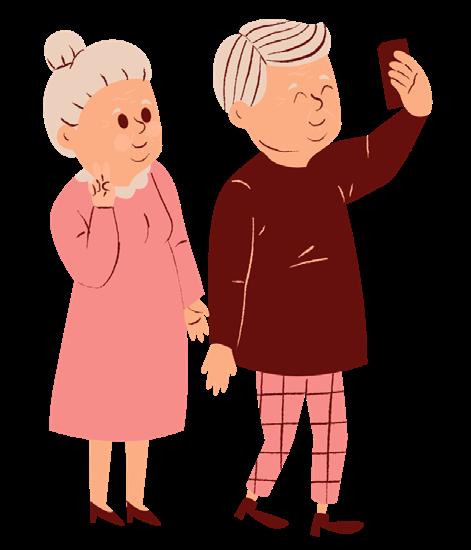
Older Australians may also be seen by scammers as generally less internet and computer savvy or familiar with new technology.
Scammers often prey on older Australians who are lonely and are housebound.
Scammers take advantage of people looking for romantic partners, often via dating websites, apps or social media by pretending to be prospective companions. They play on emotional triggers to get you to provide money, gifts or personal details.
Investment scams involve promises of big payouts, quick money or guaranteed returns. Always be suspicious of any investment opportunities that promise a high return with little or no risk – if it seems too good to be true, it probably is – and is highly likely to be a scam.
Unexpected prize & lottery scams
Unexpected prize and lottery scams work by asking you to pay some sort of fee in order to claim your prize or winnings from a competition or lottery you never entered.
These scams offer you the false promise of an inheritance to trick you into parting with your money or sharing your bank or credit card details.
Rebate scams try to convince you that you are entitled to a rebate or reimbursement from the government, a bank or trusted organisation.
Door-to-door and home maintenance scams
Older Australians may also be more susceptible to door-to-door and home maintenance scams. While many legitimate businesses sell things door-to-door, scammers also use this approach. These types of scams generally involve promoting goods and services that are of poor quality, or not delivered at all. Scammers may try and sell you gardening or roofing services, and then bill you for additional work that you did not agree to. Sometimes they may pretend to conduct a survey so they can get your personal details, or to disguise their sales pitch until they have been talking to you for a while.
Some of the warning signs you may be dealing with a scammer include: they visit late at night, or visit you again after you have said they don’t show you any identification or give you any contact information, written quotes or receipts
� they might demand that you decide to accept their offer on the spot
Scammers often prey on older Australians who are lonely and are house bound.
� you may be asked for a deposit or full payment and can only pay by cash or credit card
� they fail to tell you about your legal rights, including rights to a cooling-off period.
Tips and hints to stop the scammers
� Don’t be pressured into making a decision. Scammers often try to create a sense of urgency through short deadlines, fake emergencies or threats of legal action.
� Be suspicious of requests for money – even if they sound or look official. Government departments will never contact you asking for money upfront in order to claim a rebate.
� Scammers will often ask you to use an unusual payment method, including preloaded debit cards, gift cards, iTunes cards or virtual currency such as Bitcoin.
� Be suspicious of unexpected emails or letters advising you how to claim an inheritance or competition prize. Never give out your personal details and seek advice from an independent professional.
� Be aware of and understand your consumer rights.
Another scam that is popular at the moment is the ‘Hi Mum” scam Scamwatch is urging the public to be wary of phone messages from a family member or friend claiming they need help, following a significant rise in “Hi Mum” scams in recent months.
More than 1,150 Australians fell victim to the so-called “Hi Mum” scam in the first seven months of this year, with total reported losses of $2.6 million. The vast majority of these scams were reported in June and July 2022.
Known as “Hi Mum” or “family impersonation” scams, victims are contacted – most often through WhatsApp – by a scammer posing as a family member
� Verify the identity of the contact by calling the relevant organisation directly – find them through an independent source such as a phone book or online search. Do not use the contact details provided in the message sent to you.
� Don’t respond to phone calls or emails offering financial advice or opportunities –just hang up or delete the email.
� Always do your own research before you invest money and check the company or scheme is licensed on ASIC’s MoneySmart website.
� Be wary of people you meet social media or online dating sites who after just a few contacts profess strong feelings for you and try to move you away from the site and communicate via chat or email.
The scammer will claim they have lost or damaged their phone and are making contact from a new number. Then, once they have developed a rapport with their target, the scammer will ask for personal information such as photos for their social media profile or money to help urgently pay a bill, contractor or replace the phone. These requests continue the ruse of a lost or broken phone with the justification that the funds are needed because they can’t access their online banking temporarily.

Some messages will simply say “it’s me,” while in other cases the scammers appear to have contact information and use the name of the person they are impersonating.

“We have seen an explosion in the number of ‘Hi Mum’ scams in the past couple of months, and so we are warning Australians to be very wary of messages from unknown numbers claiming to be from their children, parents, relatives or friends,” ACCC Deputy Chair Delia Rickard said.
“Scammers will stop at nothing to get your personal details or money and this particular scam is designed to pull your heartstrings. It’s important to stop and think if you get a message, especially on WhatsApp, because chances are it’s not your family member or friend – it’s a scammer.”
Scammers will stop at nothing to get your personal details or money
The ACCC is urging people who receive suspicious messages from a number they don’t recognise, to independently verify the contact. Being online is a great way for our aged loved ones to be engaged and included however it is also the perfect way for a scammer to get their details.
Tips to keep your aged loved ones safe online:
� Talk to your aged loved ones regularly, explain what a scammer is and how easy it is for them to target people not just older Australians.
� Ask them to check with you first if they are unsure.
� If it seems too good to be true it usually is.
� Know what their online activity is – who are they talking to, what sites are they accessing.
Some things you can talk to your aged loved ones about are:
� Ask them to Know who they are dealing with. If they don’t know them don’t engage with them.
� Do not open suspicious texts, pop-up windows or click on links or attachments in emails – delete them: If unsure, verify the identity of the contact through an independent source such as a phone book or online search. Don’t use the contact details provided in the message sent.

� Don’t respond to phone calls about their computer asking for remote access – tell them to hang up – even if they mention a well-known company such as Telstra. Scammers will often ask people to turn on their computer to fix a problem or install a free upgrade, which is actually a virus which will give them your passwords and personal details.
� Keep their personal details secure. Scammers can use your information and pictures to create a fake identity or to target you with a scam.

� Keep their mobile devices and computers secure. Always use password protection, don’t share access with others (including remotely), update security software and back up content. Protect your WiFi network with a password and avoid using public computers or WiFi hotspots to access online banking or provide personal information.
Make sure you know your aged loved ones passwords so they can come to you if they forget it.
� Choose passwords carefully. Choose passwords that would be difficult for others to guess and update them regularly. A strong password should include a mix of upper and lower case letters, numbers and symbols. Don’t use the same password for every account/profile, and don’t share your passwords with anyone.
� Review their privacy and security settings on social media. If they use social networking sites, such as Facebook, be careful who they connect with.
� Beware of any requests for their details or money. Remind your aged loved one to never send money or give credit card details, online account details or copies of personal documents to anyone.

Have you been scammed?
We encourage you to report scams to the ACCC via the report a scam page. This helps us to warn people about current scams, monitor trends and disrupt scams where possible.
Knowledge is power and when we share the knowledge it takes the power away from the scammers and gives it back to us! ACG
Southern Cross Care offers a range of Community Respite options that provide high-quality short-term care to clients while giving carers peace of mind and a period of rest to focus on their own health and wellbeing. Our compassionate and capable team offers quality care that caters for each client’s individual needs, including those living with dementia.
We offer a wide range of activities including;
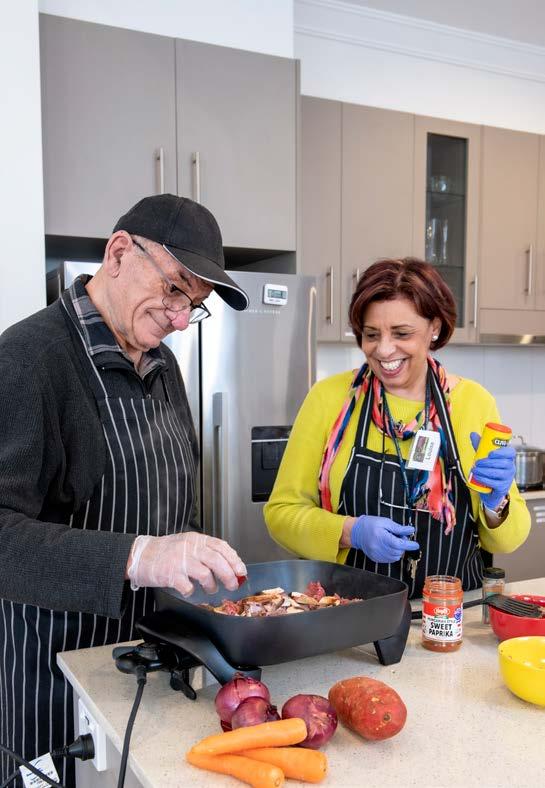
• Quizzes, trivia, games and brain training
• Preparing and enjoying meals together
• Sensory and productive gardening
• Regular bus outings, plus more Call 1800 852 772 to find out more.
southerncrosscare.com.au |
Southern Cross Care (SA, NT & VIC) Inc, ARBN 129 895 905, South Australia, liability limited
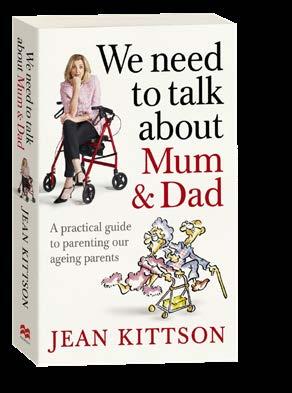
Our elders should be at the centre of all discussions and decision-making. It may sound obvious but many of us make decisions about parents without involving them, even if they are in the same room. Don’t, or they will form a resistance movement. Whenever a course of action is suggested as to the best management of our elders’ affairs, it should always be considered and decided by them.
Most importantly, listen to your parent. Delivering an ultimatum is neither nice nor fair. Having said that, the best way to make sure your parents are at the centre of all discussion is to get in early. As the saying goes, today is the youngest you and your parents will ever be. Or, as my mum warns, the last five years of your life is like the first five years – everything happens really quickly. We grow from a newborn who can’t do anything to a person who can walk and talk and think and do and be in the blink of an eye.
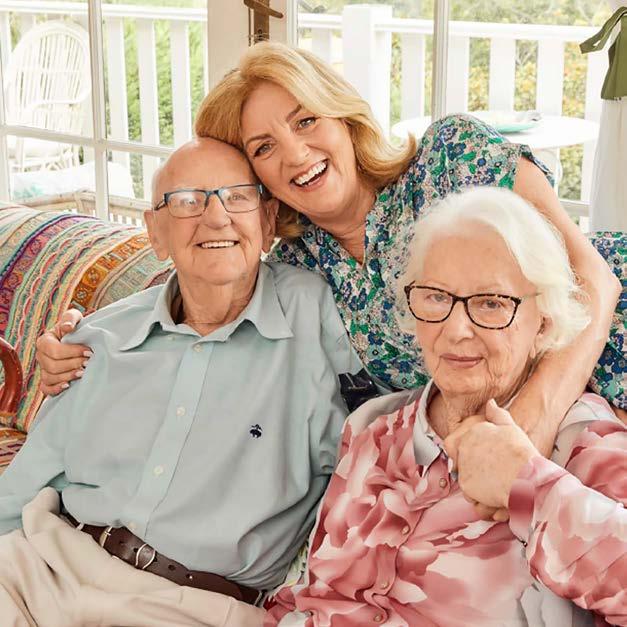
With the elderly it is the same, only backwards, and at the other end. Mum hasn’t even seen Benjamin Button.
They must be at the centre of all discussion. If you feel your parent is being manipulated or coerced by anyone (other members of the family or in-laws or anyone else – and sometimes they can be way outside the family circle) and you need help to manage the situation, you can apply for your parent to have a public guardian or financial manager appointed. This person should make sure that any vested interests do not overwhelm the interests of your parent. Remember, in the very best conversations, everyone contributes a little, everyone learns a little, everyone reveals themselves a little, all without fear of judgement or censure. Like exchanging recipes, only more comforting.
Birth families are not easy, except for mine, which is pretty well perfect. We all have a great relationship with each other, possibly because we live nowhere near each other. We occasionally check in to see who has how many children and who is married to whom, and whether we are in the same state or the same country. At Christmas we generally get together and are surprised at just how many of us there are, and the variability of our dietary requirements, which include nothing you personally have put on the table. If you talk to anyone who deals with the families of someone in aged care they will tell you that family members assume distinct roles. I have summarised them here.
The CFO (the Chief Family Officer)

This is the person with all the bravado, normally a daughter who does all the hard work. Who organises everything. Makes sure everything gets done.


The FIFO (the Fly In, Fly Out)
The family member from interstate or elsewhere who comes in, bangs all the drums, ‘Mum’s got to have the best’, ‘I can’t believe what you guys are thinking’, and blah, blah, blah, and then just disappears.
The Bad Sibling
There may be a bad sibling. Well, not always, none in my family, of course, but often there is a bad sibling, and there are lots of stories about the bad sibling. I love bad sibling stories. They make me feel better about myself. Like the bad sibling who rang the executor of his mother’s will and said ‘Mum has died, I want to see the will, can you email it to me?’
The executor was very close to the mother; he had been her accountant for years, and he had no idea she had died, and he was very saddened. But he also doesn’t hand out wills without a little due diligence, like checking to see if his client was actually deceased. So he rang her daughter to extend his condolences. He said, ‘I am so sorry to hear your mum has passed away’, to which she replied, ‘She died five minutes ago. We are still in her room.’ Bad sibling. Richard III type sibling. Mwahahaha!
This is the sibling who, in the presence of parents, becomes a child again. One of these people said to me, ‘Growing old as your parents grow old is not good. I am still animating the relationship I had with them when I was a child. I still have the usual responses and behaviour and haven’t had a chance to grow into my own maturity. My inner child is still active. I think you have a chance to grow up after they die. You can then change things, observe things.’
And at first I thought, Oh, yes! I get that. That is my problem. That is why I keep doing embarrassing things – I am still animating my inner child and, hallelujah, I can now blame it on my parents for staying alive. Win, win, win! But then I realise this is a reaction from my inner child, and so, after I have controlled my inner child by kicking her in the shin and saying, ‘I am not playing with you anymore’, my adult self takes over.
The One We Don’t Talk About Then there is the aloof, cold, non-empathetic sibling. Better known as the psychopath.
The one who, when the family says, ‘Shall we call Voldemort and tell him what’s happening, has anyone heard from him this decade?’ we all decide not to bother him. ‘He won’t want to know anyway. Remember when he sold our bicycles?’ And everyone has a little silent moment of relief.
Walkie Talkie Family member (The WTF)
I am pretty sure this is me. I like to think I am the CFO, but I am really the WTF.

On a good day this is simply a matter of communications. I talk the walk and walk the talk. Often with emotion and drama and hand gestures and phone calls overheard by everyone else in Aldi. I don’t always walk the walk. But

this is not walk avoidance. It is not because I don’t want to do whatever has to be done, it is simply because I know something needs to be done but I don’t know how to do it, and sometimes, true confession, I wish someone else would do it. And that is why we are now here. With this book. This is a self-help book for me to learn how not to neglect my parents, because I am ‘busy’, or because I think they can do everything for themselves. Hey, they did when they were in their thirties, why not in their nineties? The corollary to this is to compensate with a frenzy of over- involvement when I still don’t know exactly what to do. My sister, who really is the CFO (even though she is younger than me, how does that work?) said to me when I was getting upset about some home care details and paperwork and the whole, deranged, here-be-dragons aged care landscape:
‘Take a step back, Jean, everything is going fine. Mum and Dad are happy. Don’t rock the boat.’ When this sort of thing happens, my inner child wants to sulk. My bad sibling wants to say, ‘Well you can all bugger off and do it yourself, excuse ME for caring!’ And then pour myself a drink. My inner CFO wants to ring up other members of the family for support.

These multiple personalities must be shown the door. Looking after your folks, when the time comes, is not about ME or, if there are siblings, about US and our sibling rivalries that began with one particular sibling being far too gorgeous and popular at school, and certain sisters picking on the younger brother (we pinned him to the wall of the garage with a car, why does he still flinch when he remembers that?).
It is about THEM, Mum and Dad. Otherwise we will just be random people out of their comfort zone, trying to work out who to trust, doing dangerous and stupid things they have never done before, navigating the hospital system for example, based on watching every episode of House.
Who they are, and what they want?
Surprisingly, I have found that many siblings have very different perceptions of their parents – who they are, and what they want. When I talk with my siblings about our experience of childhood, we might have been brought up by completely different people.
If there is any argument within families as to the right course of action, bring in an independent professional, a good one, an MMA (that’s mixed martial arts) referee if necessary, whose primary motivation will be the interests of your parents, and who will put your parents first, and who says ‘I think this is really an excuse. Shut up. Grow up. It’s not about you.’
Because yes, it is a comfort to know that Mum and/or Dad are still available to soothe and counsel and be the grownups, and, yes, many people spend much of their emotional lives still seeking their parents’ approval, seeking, seeking, seeking, but it is better we know and appreciate that we are also the grownups now, ask any shrink. Because sooner or later, ready or not, we really will have to be the adult, making decisions for our parents, just as they once did for us.
Discussions, conversations, chats and meetings are essential in caring for our elders. They are not interventions; they are a team effort, a selfhelp strategic meeting with a support group.
The elders set the agenda. They provide a vehicle to discuss how to best manage getting on. They are the start of making
plans. Pre-plans. Rough sketches. Planning is good. Planning can help us in a crisis or in a gradual unravelling to make the best of all situations.
Ask the elders what they hope for, and what they fear. Talking with your elders about their wellbeing should be a constant check-in process. If your elders seem not to be coping, or are unhappy or unwell, it may be time for a family hug. The elders must not feel ambushed. Avoid distractions from family dynamics.
Make a list of what needs to be discussed, in consultation with the elders. Think about what they want to talk about. Always put your elders at the centre of all discussion. Listen to them and give them time. Listen to each other.
Never, ever let your elders feel that they are a burden, or an embarrassment, or helpless or mute.
It is time for selfless family co-operation, and good luck with that. We should try family empathy once. ACG
Kittson, Jean: We Need to Talk About Mum & Dad Pan Macmillan Australia Kindle Edition
We hear that word stress thrown around a lot however What is stress… do we really know what it is.

Stress is when you feel pressure of a difficult situation, a state of mental or emotional strain which often leads to physical symptoms. Being overwhelmed by the situation.
Just like John Farnham’s song…. We need to take the pressure down. I’m going to share some ways you take the pressure down or if you like reducing the stress in your life.
Reducing the stress in your life and knowing what triggers the stress will bring back the feeling of control. With the added bonus of eliminating some of the physical symptoms which will bring back enjoyment and happiness. Freeing the mind body and soul to live a happy and joyful life and not be dragged down by the constant pressure of stress.
A little stress is a good thing – we’ve heard this many times before and well to be honest with you it can be. You know how it feels – heart is racing you are in fight or flight mode and it feels ok. However, too much of a good thing is never good and this is exactly the case when there is too much Stress.
What started out as heart racing becomes a thumping so hard that it takes over your whole life and you can’t function normally.
It is just like a rubber band… a bit of stretching is good, feels comfortable. Easy to move around. Yes stretched but feeling good it is only when we stretch too much that it becomes uncomfortable. There is even a school of thought that too little stress and we become bored and that isn’t good for us either

I want you to think about a rubber band –it stretches and stretches until it breaks and then snaps either you or those around you. You don’t know when it will snap, you know it’s coming you can see the strain, feel the strain and the pressure. And then SNAP! However I’d like you to think about it a bit differently – you don’t need to eliminate all stress but what you need to do is keep it in control. Some stress is good actually some universe studies recommend that we have some stress in our lives or it becomes boring. And whilst I think this is a bit extreme I do believe we need to be challenged so we grow.
I heard an interesting report recently - PTSG - Post Traumatic Stress Growth that can also occur. We’ve heard of PTSD
Post Traumatic Stress Disorder
however there is another school of thought that talks about the growth that comes from traumatic stress. Could this be the same for chronic or acute stress too?
When we work our way through things we grow. No, It’s not getting over it. It is working through it to learn and grow.
According to the government website, healthdirect.gov.au, the following are common feelings of stress: feeling overwhelmed, unable to cope, feeling on edge or unable to stop worrying, feeling exhausted, changes in sleep patterns, changes in appetite, headaches, aching muscles, upset stomach, difficulty concentrating, changes in mood including irritability or anger, withdrawal from friends and family, reliance on alcohol or other substances to cope, and even throughs of self-harm or suicide.
However, it does effect people in different ways, some more physical and some more mental. How does stress affect you? Nothing is right, nothing is wrong. Each person’s “limit” is different, and we don’t know what has happened to make then snap.
Some ways to ease Stress

Steps towards easing stress can be divided into immediate actions and planned actions. Immediate actions you can take when something stressful happens include:
• Breathe – take several deep breaths
• Don’t react straight away
• Take a sip of water
• Plan your response
Planned actions you can take are when you know a situation is or could be stressful you can then plan around it. Planned actions you can take include:
• Plan your response

• Exercise
• Mindfulness
• Meditation
• Yoga
Don’t put yourself in the situation if you can help it • Speak to your GP or a Mental Health professional, if the stress persists
We all have situations that we don’t like however if we can plan them and do them our way then they will be less stressful.
Stress is a part of our every day lives however stress doesn’t have to control our lives. ACG
What are you going to do today to reduce the stress in your life?
Life is demanding and as carers, even more so. You are responsible for your own family and now have the added responsibility of being the primary carer of your elderly parent(s). Wanting to please and appease everyone can easily lead to being out of balance. Either you're going non-stop trying to do it all, or you're done and can't get out of bed. Being wellbalanced is also known as living in the sweet spot. A sustainable place between optimism and pessimism is called realism. To illustrate this the best, I use a rubber band
The intention of a rubber band is to stretch, so it can do its purpose, which is to hold things together. When you pull it too far, it is stressed, so it will typically break.
The sweet spot between stressed and stretched is the place you want to be to live your purpose, without breaking. Here are examples of stretched and stressed:


Stretch Learning something new Train for a marathon Lose 10 pounds in a year Save for a vacation to pay in advance
Stressed
Having it be perfect yesterday
Unrealistic goal with no plan Try to lose 10 pounds in a month Pay off vacation after it’s over
How do you find that sweet spot?
You partner optimism with realism.
An optimist is someone who consistently lives in a place of hopefulness and confidence that things will work out the way
they want them to. Optimists will experience disappointment in not achieving the desired outcome when they do not add in a healthy dose of realism. Without a reality check, stress can take away the fun of stretching and growing into living your potential.
Over the years, I have stretched myself on a regular basis – I have started not one, but two companies, I have done a sprint triathlon and rode a century bike ride. I love a personal challenge!
And, I can overindulge, forgetting the realism and letting the optimism take over with my audacious goals. The evidence – I put too much on my plate, try to get it all done yesterday, have to have things be perfect and have no plan or a lack of focus.
Then I break down…
When that happens, I experience feelings of overwhelm and do nothing. I can cut corners, and experience a lack of energy and/or low-level depression. My “rubber band” has broken.
Finding the sweet spot between stretched and stressed is a practice.
In a world where we all have a lot to do, overwhelm happens to people on a regular basis.
I travel in a circle of people that have big missions and are accomplishing important things. They often ask, “How do I find and sustain the sweet spot?”
It’s a dance, two steps forward and 1 step back.
Here are three things that will help you to stay in the sweet spot.
Under commit and over deliver. This statement is typically used in customer service; however, I invite you to use it to take care of yourself. It’s wonderful to have a clear vision and lofty goals, but best to have realistic goals. You can always “do more”, but when too much is on your plate, and you try to eat it all, you get sick and fat. Have 1-3 things to accomplish on your list. Add more as you go.
Physical
Drink more water or walk 30 minutes per day Emotional Gratitude attitude Mental Read something inspirational Spiritual Meditate or spend time in nature. Weaving these activities into your day will keep you in the sweet spot.
Spend more time in the moment. You can learn from your past and visualize your future, but checking in in the moment allows you to make conscious choices for your next steps. It could be that you’re afternoon schedule is full of important tasks, and you can barely keep your eyes open. When you take time to check in, you can choose a few options to support your success – you can close your eyes for 20 minutes, take a few minutes to refresh your body by dancing or stretching or have a cup of coffee. If you don’t take care of you first, it won’t matter how busy you are. You’ll be so exhausted, you‘ll have a hard time performing quality work anyway.
If you are ready to flourish, take the time to integrate one or more of these tips to find your sweet spot between stretched and stressed. Otherwise, you may snap like a rubber band, and that won’t help you, or those that rely on you. ACG
Keep your fountain full. Make sure you do things that feed your spirit. I use the PEMS (Physical, Emotional, Mental & Spiritual) four realms method to fill my fountain. A little bit every day will help keep you in the sweet spot.

Medical cannabis continues to be a hot topic, with an increasing number of Australians swearing by its medical benefits.
In 2016, the cultivation, production and distribution of medicinal marijuana was legalised in Australia. The decision allow the prescribing and dispensing of medicinal cannabis products.
For many, medical cannabis remains a bit of a taboo topic. Are there side effects? Is it addictive? How do I find out who is eligible to get a prescription?
As a carer, seeking solutions and strategies for your loved one’s health and wellbeing is always a constant.
Can medical cannabis be one of those answers?
Deriving from the cannabis plant, (or more commonly known as marijuana), medical cannabis can relieve the symptoms of some medical conditions. While the cannabis plant contains 80 to 100 cannabinoids, most medical cannabis has two of these cannabinoids – tetrahydrocannabinol (THC) and cannabidiol (CBD).
THC is also the chemical that gets people high while CBD has no intoxicating effects and can treat a suite of symptoms including arthritis and lower back pain.
In Australia, the term medicinal cannabis tends to be favoured to help draw the distinction between the medicinal aspects of the plant and the use of marijuana as an illegal recreational drug.
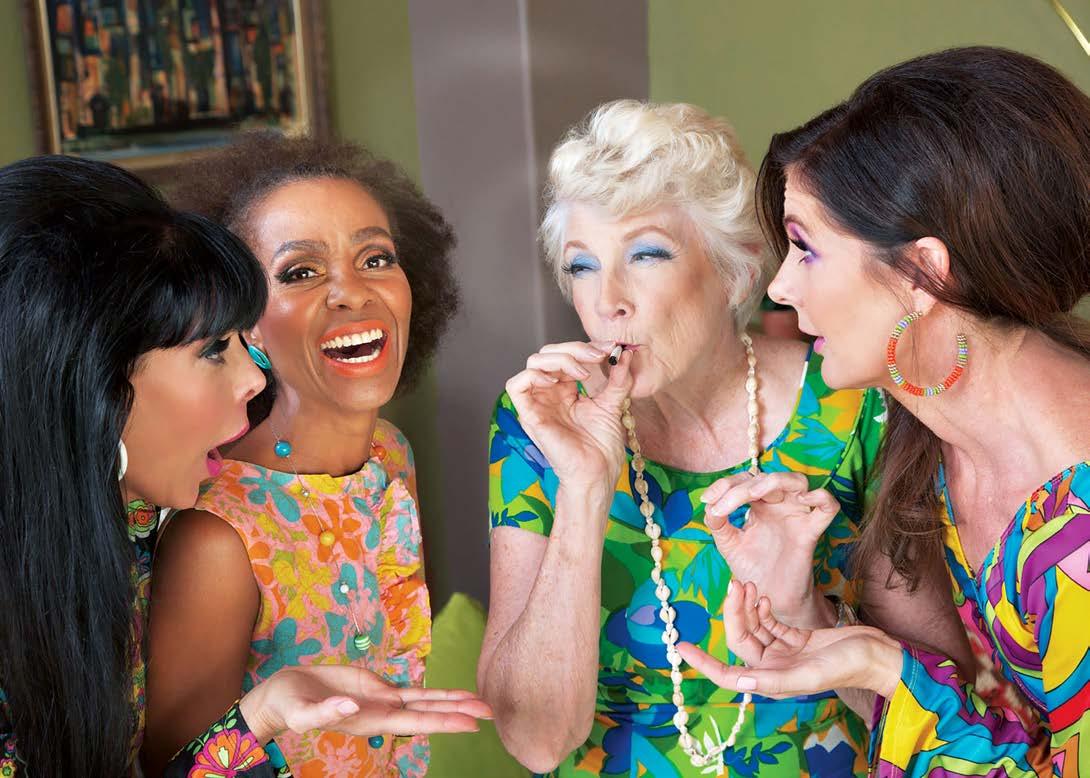
Medicinal cannabis and marijuana –what’s the difference?
Recreational cannabis (marijuana) is a drug which is illegal in most states and territories.
Marijuana is not a medicine. The amount of active ingredients in marijuana are unknown and it may also contain other impurities.
What are the different types of medicinal cannabis products available
With more than 100 different types of medicinal cannabis products on the market, most are taken orally. They include oils, pills and dried flower products. Medicinal cannabis products contain THC and/or CBD.
So why take cannabis?
Medical cannabis is usually used for the treatment of chronic pain (not related to cancer). This might include arthritis pain, lower back pain, neck pain and neuropathic or nerve pain. Solutions containing THC and sometimes also CBD are used to treat these conditions. You take this medicinally cannabis orally (by mouth).
Medical cannabis can also treat anxiety, cancer-related symptoms, epilepsy, insomnia and multiple sclerosis.
People with epilepsy and anxiety most often use CBD-only products. Research into uses for medicinal cannabis is happening both in Australia and worldwide.
What are the side effects of using medicinal cannabis?
Continual research is being undertaken to look at the possible side effects of medicinal cannabis. They may include difficult concentrating, dizziness, drowsiness, challenges with balance, thinking and memory. There also could be an increased or decreased appetite and impairments to cognitive function.
What are the potential benefits of medicinal cannabis?
While there isn’t enough research to prove that medicinal cannabis works, there are promising signs which show people with chronic or terminal illnesses report experiencing much less pain who don’t get relief from other medicines.
In addition, medical cannabis also helps people with the side effects caused by other medicines.
There is also continued research being investigated around the use of medicinal cannabis for several other conditions including epilepsy, multiple sclerosis, nausea and vomiting due to chemotherapy, non-cancer chronic pain and palliative care.
You can only get legal medicinal cannabis products from your doctor, specialist, or by taking part in a clinical trial.
Your first step is to discuss medicinal cannabis with your doctor. Your doctor will decide if medicinal cannabis will help you and which medicinal cannabis product to prescribe.
Your doctor will also need to complete forms to get the necessary government approvals.
Once approved, your doctor can write you a prescription. You can take this prescription to any pharmacy to have your medicinal cannabis product dispensed.
The Pharmaceutical Benefits Scheme (PBS) doesn’t cover medicinal cannabis. The cost of medicinal cannabis can vary from $50 to $1000 per week. This depends on your illness, the product and dose.
In 2016, the Australian Government legalised access to medicinal cannabis.
Australia’s Therapeutic Goods Administration (TGA) regulates the supply of medicinal cannabis.
It is important to understand the risks if you don’t follow the law.
Most medicinal cannabis products are unregistered drugs. This means that they have not gone through the same regulatory process as other prescription medicines. More information is available on the TGA website.
To prescribing these products your doctor must have approval from the TGA. This can be via the Special Access Scheme-B or Authorised Prescriber Scheme.
Some medicinal cannabis products are registered for use in Australia, including nabiximols and synthetic cannabinoids.
The laws are different in each state or territory. This may affect whether you can get access to medicinal cannabis.
You can check the laws in your state by visiting:
• ACT Health
• NSW Government
• Northern Territory Department of Health
• Queensland Health
• SA Health
• Tasmanian Department of Health
• Victoria Department of Health
• Healthy WA
Can I drive after using medicinal cannabis?
The simple answer is no. THC will impact your driving and can increase your risk of having a car accident. This risk can last for up to eight hours after taking oral THC products.
You should also not operate heavy machinery.
You may test positive for THC on roadside drug testing and must face the associated legal sanctions. There is no evidence that CBD effects driving. However, CBD can cause drowsiness, fatigue and low blood pressure.
You should discuss the impact of CBD on your driving with your doctor.
Can I grow my own medicinal cannabis?
Growing cannabis for your own use is still illegal except for in the Australian Capital Territory (ACT). In the ACT, the laws governing the growing, possession and use of cannabis have changed.
In other states, you will face a fine or prison sentence if you are caught using, growing, selling and/ or supplying cannabis.
Other things to remember:
• Don’t buy marijuana products from overseas.
• Don’t smoke ‘street’ marijuana to try and your symptoms as this is illegal and you don’t have any control over the dose or what is in the product.
• Smoking cannabis allows cancer causing substances (carcinogens) into your lungs with smoked cannabis containing at least 50 of the same carcinogens as tobacco.
If you want to know about medicinal cannabis, talk to your GP. Be armed with lots of questions which may include:
Can medicinal cannabis help my condition? Is it safe for me to use?
How will the benefits from medicinal cannabis differ from my other medications?
Can medicinal cannabis replace any of my current medications? Will it affect the other medications I take? If so, how? Are there any side effects or risks? Which medicinal cannabis product is right for me?
How will medicinal cannabis affect my ability to do everyday tasks?

Can I get funding or financial support for medicinal cannabis?
For further information, please visit the TGA website. ACG
Did you know that medical cannabis is legal in australia?

Prescribed in oil, capsule, cream and flower form, there is a multitude of conditions that medical cannabis can help with, Dr Suzanne Graham explains.
You may have heard about medical cannabis when it was legalised in Australia in 2016, or maybe you even know someone who uses it. However, have you ever thought about how it may help you or someone you care about? The receptors that it works on are found throughout the body, meaning that it can help in so many different conditions, including some that you never may have guessed.
The use of medicinal cannabis products including oils, capsules, creams and flowers has increased rapidly in Australia since 2016

and have been available in places such as America and Canada for even longer. A lot of people have found medicinal cannabis to be a game changer for their medical conditions and are advocating for a reduction in stigma and increase in awareness of what it can do. From anxiety to sleeping issues and chronic pain, find out how medicinal cannabis may be able to help you.
How does medical cannabis work? Before we move on to how it can help, it’s important to understand why medical cannabis may help. Throughout each person’s body, is a system called the endocannabinoid system which is responsible for maintaining homeostasis (balance) in the body. Many people with
health conditions will be in a heightened state, meaning that their body is in a state of overactivity which can lead to their symptoms. The body produces natural molecules (endocannabinoids) similar to those that are found in the cannabis plant, that help to decrease this heightened state by binding to receptors throughout the body. This encourages the body to relax and decrease the nerve signals that are causing the patient to experience symptoms - for example pain or anxiety. Some experts believe that some people may not be able to produce enough of these natural molecules and thus this is where the molecules in medicinal cannabis can help this system to work better to maintain balance and decrease unwanted symptoms.
Finding it hard to get your beauty sleep? You’re not the only one! A recent study from the Sleep Health Foundation showed over half of Australians report at least one chronic sleep issue. Sleep is a critical to our health and wellbeing, studies show that lack of sleep can affect how we think, how we feel and can even increase our risk of physical conditions such as high blood pressure and diabetes. Insomnia even increases mortality from heart attacks and strokes compared to those who have a good night’s sleep.
Sleep issues are one of the conditions that medicinal cannabis can help with. Research has shown that medicinal cannabis can improve sleep quality with minimal side effects.

At least one in five Australians struggle with their mental health, with conditions such as depression, anxiety and PTSD. Struggling with mood can affect many different areas of an individual’s life including personal relationships, career and physical health.
Many people have found cannabis products helpful for managing mood and improving their day to day life.


Medicinal cannabis can help with painful periods, menopause symptoms and endometriosis. Did you know about 1 in 9 women in Australia will be diagnosed with endometriosis at some point in their lives? It can lead to a lot of pelvic pain, discomfort during sexual intercourse and bowel issues.
A range of products have been developed specifically with women’s health in mind, including pessaries and creams. Many patients report improvement in a range of associated symptoms.
Arthritis, old injuries, migraines, fibromyalgia, irritable bowel, muscular issues, nerve problems, cancer –the list of things that can cause pain seems endless sometimes. Many people suffer with chronic pain due to many different reasons, which can often be very difficult to get on top of.

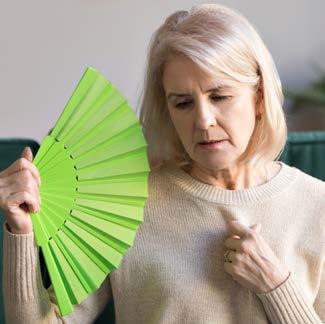
Painkillers can have unwanted side effects and sometimes aren’t enough to stop the pain.
Many patients report an improvement in pain control with medicinal cannabis. This is due to the important part that the endocannabinoid system plays in modulating pain and inflammation.
Did you know that the receptors that cannabis works on are even found in your skin? This means that cannabis products may be able to help you with acne, psoriasis, eczema, dermatitis, and even itchy skin. There are so many factors can cause a flare in skin conditions – including stress and inflammation.

There are oils that work throughout the body to decrease stress and inflammation, as well as topical creams which can decrease pain, itch, redness and inflammation directly at the site of the skin problem.
Several studies have shown a significant reduction in various symptoms reported by patients, including the conditions we have discussed, as well as others that we don’t highlight in this article.
These include seizures, nausea and vomiting, autism, weight control, aggression, muscle spasms plus many more.
They have also shown that patients using medicinal cannabis report an improvement in their quality of life.
Dr Suzanne Graham first became interested in medicinal cannabis after seeing its effect on palliative and cancer care patients. ACG
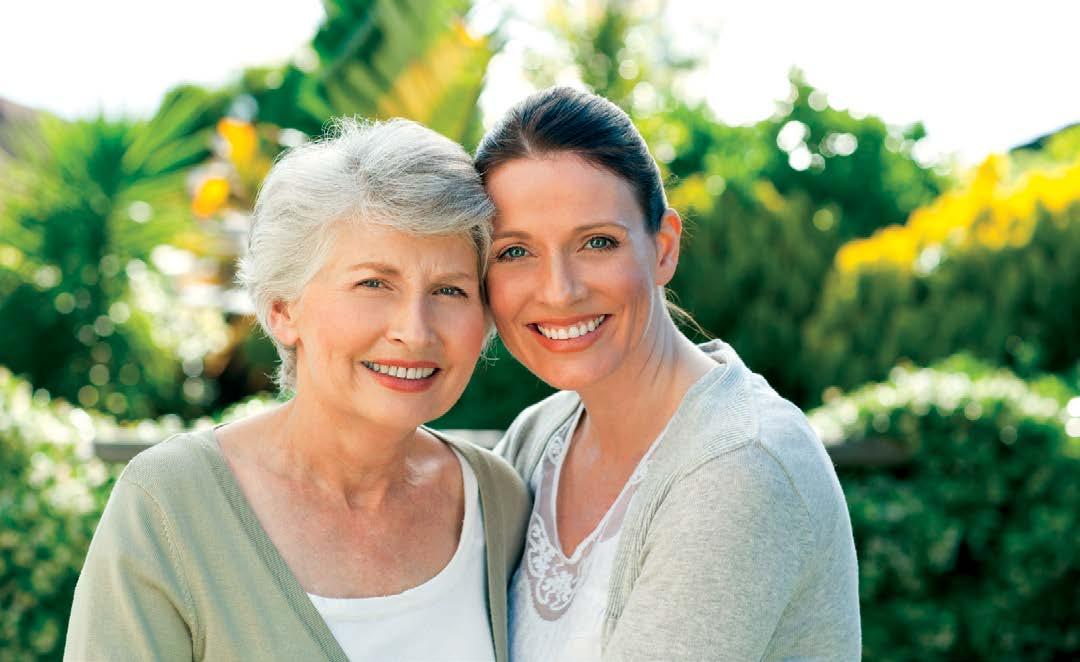
Speak up for – not over – your loved one Advocating – or speaking up – for a friend or family member doesn’t mean doing “what’s best for them.” It means asking that person what they would like to happen and listening –really listening – to what they tell you. You might not agree with the choices your friend or family member makes, but age doesn’t disqualify them from the right to make mistakes and to learn from them.
If you think something they have chosen to do – or not do – might cause them harm, it’s important to talk to them about the potential consequences of that decision. And substitute decision-makers – for example,
a guardian or power of attorney – have obligations to act in the person’s best interest. Service providers are required to take reasonable steps to prevent foreseeable harm which is known as “duty of care“. But
duty of care must be balanced against the older person’s right to dignity of risk.
It’s too easy for families and others to come in and take over because they think they know what’s best for you – especially when you have a diagnosis of dementia
says Gwenda Darling, a member of the Older Persons Advocacy Network’s National Older Persons Reference Group.
“If I lose my voice, if I am not heard, I feel like I am passed my useby date."
"I might as well give up, because I am no good to myself or to anybody else.”
For Ms Darling, the ability to make her own decisions is integral to her sense of self-respect.
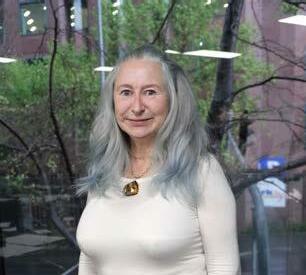
“It’s about maintaining your own power; the power you have had all your life,” she says.
“To maintain my independence, I need to be allowed the dignity to take the risks that I believe are safe for me."
“People assume you don’t have wants and needs when you don’t have a voice.
“It's a way of creating a space for yourself to age well.”
In Ms Darling’s case, that means living in a rainbow-coloured house in rural NSW. A cleaner, a social support person and a gardener are some of the services that enable her to do so.
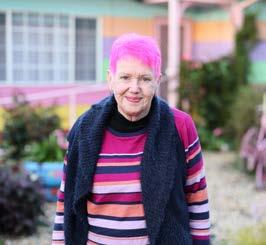
Most people retain the ability to make their own decisions for their entire life.
But as we age, almost all of us will need varying degrees of support.
It would be hard to find anybody who didn’t struggle with the challenges presented by the aged care funding system.
And a lot of people need help with information technology – often from children or grandchildren.
People with cognitive conditions, such as
dementia, need more formalised assistance.
But it’s rare for anyone to be incapable of making any decisions for themselves.
While someone may not have the capacity to understand the extent of, and manage, their assets, for example, they can still make decisions about where they want to live and who they wish to spend time with.
Supported decision-making, which is endorsed by the UN Convention on the Rights of Persons with Disabilities, enables them to do this.
Meadbh Flavin, whose mother, Theresa, was diagnosed with early on-set dementia in 2017, is an old hand.
To me it means helping and supporting another person to make a decision without doing it for them by showing them different options and the consequences
she says.
Theresa Flavin, who is also a member of OPAN’s National Older Persons Reference Group, explains supported-decision-making from her perspective.
“Sometimes I need some help … reminding me of all the little things my brain no longer takes into consideration,” she says.
“Gradually we just embedded [supported decision-making] into our lives so that all the decisions are more cooperative now.
“The decision may need to be broken down into discrete parts to help us to make it.”
One of the added bonuses of the supported decision-making model is that it relieves the carer of some of the responsibility of making a decision on somebody else’s behalf.
Advocating – or speaking up – for someone you care for To speak up for yourself and others about aged care services, you need to know what you can reasonably expect from those who deliver them.
Information about your rights – and the rules and regulations that apply to service providers – is key.
Professional aged care advocates frequently use tools like the Charter of Aged Care Rights and the Aged Care Quality Standards to resolve problems. You can, too.
Aged care services should:
• give you what you need
• give you the right information
• help you understand that information
• let you make your own choices
• listen to you
• make you feel safe
• have staff who know how to do a good job. When something is not right, or not working for you, it’s okay to speak up. Most service providers will want to find a solution.
OPAN’s Self-advocacy toolkit provides the tools and resources you need to speak up.
It’s important to involve the person you support in decisions about their lives. It’s a basic human right. It also enables that person to maintain their dignity, independence and self-respect.
in which you focus on what the speaker tells you (through words, tone of voice and nonverbal cues) and communicate that back to them to confirm you understood their message correctly. “What I heard you say …”.
5 You might not agree with the decision of the person you support. Try to be aware of your own bias. Discuss the possible consequences of their chosen course of action. Duty of care means taking reasonable steps to protect someone from foreseeable harm but that must be balanced against dignity of risk. The right and choice to take risks is an important part of maintaining someone’s dignity and self-respect.
6
For further information, or to speak to an advocate, call 1800 700 600 or go to opan.org.au
2 It’s easier to make a decision if you break it down into parts – particularly for people with conditions that cause even mild cognitive impairment, such as Parkinson’s disease. You might need to explain things more than once. Make sure they have the information they need to make an informed decision – this will include benefits, risks and likely consequences of making a decision, or of doing nothing.
3 Pick your moment! That means identifying patterns of behaviour such as energy troughs. Don’t try and make big decisions when the person you support is likely to be tired.
4 To be clear about the wishes and needs of the person you support, practice reflective listening. This is a communication technique
6 Do your homework. To effectively advocate for the person you care for, you need to understand their rights. You also need to know the tools you have at your disposal to ensure those rights are being upheld. For example, how to make an effective complaint. It helps if you can “speak the same language” as the people who provide aged care services. Once you understand the funding rules and regulations, you can identify what services you need in a form the age care system can provide.
Leona’s, husband, Bill, lives with dementia. As his enduring guardian, Leona was concerned by Bill’s rapid weight loss after entering residential care (he dropped two trouser sizes in almost as many months). A regular visitor to the aged care home, she often sat with Bill at mealtimes. She observed his indifferent reaction to the food he was served. She also noticed Bill’s enthusiasm for any treats she brought with her, such as fruit. Leona raised the subject with the clinical care manager during a review of Bill’s care plan, suggesting bland food and small portion sizes were a major contributing factor to his weight loss. The clinical care manager arranged for Leona to meet with the aged care home’s chef. The















chef asked Leona and Bill what sort of food he liked to eat and promised to increase Bill’s portion sizes. Bill’s menu has been adapted accordingly. He now eats his dinner with relish. And he is back to a healthy weight.
Case study two
Ama became socially isolated following a health setback. While medication alleviated her symptoms, her confidence was severely shaken. She stopped attending exercise classes and going out for coffee with friends. She began to experience anxiety attacks. Ama’s daughter Roni felt her mother would be better off in residential aged care, but when she talked to Ama about it, Ama became distraught. They decided to call an advocate who had supported Ama in the past. The advocate told Roni about the ShortTerm Restorative Care Programme (STRC) which is designed to help people regain the ability to carry out the activities of daily life. The daily physiotherapy visits funded by the
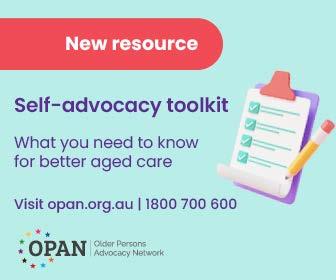
12-week rehabilitation program provided regular social contact for Ama outside her immediate family. The regular exercise further improved Ama’s physical and emotional well-being. She slowly regained her confidence, first with visits to the supermarket, then social engagements with old friends. ACG












Communicating effectively with a person who has dementia can become an increasing challenge if the person progressively loses their memory and their ability to organise and express their thoughts. For many, the loss of recent memory means that the past begins to merge with the present which can result in difficulties for families and carers of the person living with dementia.
It is important to always communicate respectfully with someone who lives with dementia and experiences things differently to you. There are many different strategies and ways you can respond in a caring way.

Crucially, what works for one person may not work for another so please call the National Dementia Helpline on 1800 100 500 if you’d like to talk to one of our expert team about how to best care for your loved one. Dementia Australia services include information and education, peer support, psychological support, respite, social support and more.
Below are some options to consider when communicating, using two scenarios. Scenario One
What if the person living with dementia insisted their car was missing when it was sold decades before and they can no longer drive?
Acknowledge the concern, sometimes it is the feelings behind the questions that are more important to focus on, than the question itself. The loss of a car may mean the loss of control over their life as they can’t come and go as they please. Sometimes enabling a person to increase their sense of control can overcome these issues. This can be achieved by hanging a set of ‘car keys’ on the key rack or enabling the person to have keys in their pocket. Suggest an alternative option such as "I'm not sure where your car is at the moment but was there somewhere you wanted to go?" Or take your loved one out for a drive to ‘find their missing car’ and during the ride
change the conversation topic. You could also stop off for a coffee or take them to do their favourite activity.
Provide reassurance by saying something like, “sounds like this car is really special for you, I would love to know the story about where you bought it, how fast did it go, and the adventures you had.”
Steer the conversation into a different avenue, possibly the younger days of the person living with dementia. If possible, it can be helpful to get some photos of the person in their youth. The conversation may then flow in another direction, which can distract the person living with dementia from their concern or distress.
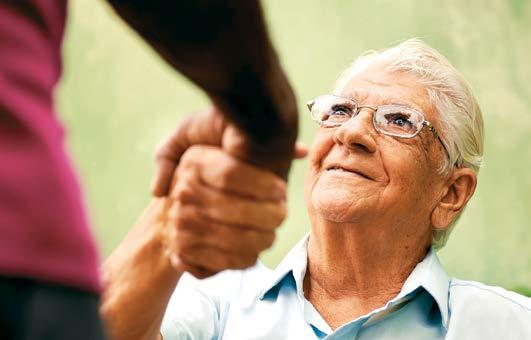
Scenario Two
When a loved one with dementia can’t recall painful events from the past, such as the death of a parent or spouse, reminding them may result in significant distress. Instead, consider using these tactics to respond.
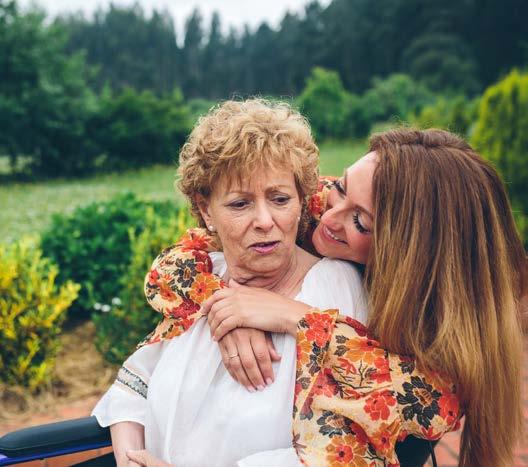
Acknowledge the concern, with a comment like “Your mum can’t be here right now, and it seems like you are missing her.” It can also be good to empathise with the person by acknowledging you miss your family members as well when they aren’t with you.
Suggest an alternative option, such as saying their mother is unable to visit rather than informing the person living with dementia their mum passed away years ago.
Provide reassurance, for example when asked why the person isn’t there, reassure your loved one that their mother is doing well or by saying “I know it’s disappointing for you that your mum isn't here right now, but I am here because I care about you. There are lots of people who care about you." Then redirect to looking at family photos (if easily seen) and asking about who the special people are in the photos and redirecting them that way.
Redirection to shift focus. For instance, you can distract your loved one by engaging them in an activity or changing the conversation to another subject, preferably to an activity or hobby the person with dementia enjoys. For example, let’s go outside and have a cup of tea.
It is important to keep track of what works and what does not, to help yourself and others care for the person living with dementia. It can be useful to foster a sense of curiosity when dealing with dementia, being reflective and adaptive, fine tuning constantly, keeping a journal to document what things are effective and what exacerbates situations.
Dementia Australia can support you with timely, reliable and expert information, advice and a wide range of programs to live well with dementia. Call us on 1800 100 500, 24 hours a day, seven days a week, 365 days a year or visit dementia. org.au. ACG
1800 100 500
Triston cares for his wife, Rachel, who has bipolar disorder, and for his daughter Caitlin, who has Attention Deficit Hyperactivity (ADHD) and autism.
Triston never considered himself to be a carer. “The person I love needed help and I only did what I was meant to do” Triston explains. “It wasn’t until 5 or 6 years into us being a couple that I was introduced to Carers SA and I realised that I was a carer.”
Triston described how becoming a carer changed who he was and made him reflect on life. “You start to realise what is important and what is not,” he said.

When Triston had a cancer scare 14 months ago, his family and support network enabled him to get through. “If it wasn’t for the people I have met through my care situation, I wouldn’t have had the support in place to make sure I’m still here today.”
“I became a carer out of necessity.”
“I ended up becoming good friends with Rachel and the friendship evolved. She needed some help and support and I was there for her. Now, she is my wife,” says Triston.
If there’s one piece of advice Triston could give to other carers, it would be to look after yourself. “There are too many of us burning out too quickly,” said Triston.
Triston thinks of himself as incredibly lucky to have his wife and daughter who check in on him and make sure he doesn’t burn out. He also tries to make sure that each day he has a portion of time set aside for himself. “Sometimes I only have 5 minutes to sit down and have something to eat but, whatever it is, that small amount of time allows me to blow off steam,” said Triston.
“I do it because I know the difficulties and pressures of being a carer. If I can help someone who is new to caring and help alleviate a bit of their stress, or give advice and make their caring role easier, then it’s well worth the time,” he said.
Triston has been a carer for more than 10 years and describes how navigating the health and support systems over the years has been really tough. “You do everything you can to find support for the person you care for, but trying to find help can drive a carer to a point of breaking.”
Carers SA is the local Carer Gateway provider in South Australia. The Carer Gateway is an Australian Government initiative which provides services and support to unpaid Carers across Australia.
For over thirty years now, Carers SA has been providing support to unpaid Carers across South Australia. Carers SA offers a wide range of personalised services, packages and information to support Carers from all backgrounds and cultures at no cost to you. Some of the services available:
• Carer support - assisting Carers to determine what they need.
Triston found Carers SA – his local Carer Gateway service provider – to be a valuable source of support. He received a Carer Gateway tailored support package and has been able to access equipment that was desperately needed.
• Tailored, carer-directed support packages - to give Carers practical assistance.
“There are times when the person you care for has a bad day and it can be draining to balance their needs with your own. Sometimes you don’t want to go out or you just don’t want to deal with something today. Looking after your own mental health helps you deal with those days.”
• Professional counselling - provide one-on-one support for Carers and their caring situation.

• Peer support - where Carers can meet with people in similar caring situations.
Through Carer Gateway, Triston has accessed online counselling and personal coaching, which has allowed him to explore and move towards his own personal goals.
• Emergency respite care - to make sure the person cared for will be looked after if an urgent or unplanned event occurs and stops the Carer from being there.
• Coaching - one on one support to help reach individual Carer goals.

For further information please contact Carer Gateway on 1800 422 737 or Carers SA on 8291 5600 www.carerssa.com.au
• Advice - providing information on services and support available.
For further information please contact Carer Gateway on 1800 422 737 or Carers SA on 8291 5600 www.carerssa.com.au
Triston is passionate about helping others and, in his spare time, he is involved with online community groups where he shares advice with other carers. “Even when I’m not actively caring for Rachel, I’m still a carer. The caring role doesn’t stop and my voluntary online caring role doesn’t stop either,” says Triston.











This year’s National Carer Survey heard from a total of 2,248 Carers from South Australia (SA). The Survey results tell us a lot about Carers’ day to day experiences, support needs and perspectives on caring. Below are some of the key findings so far.
Carers from SA represented a total of 32.9% of respondents to the 2022 National Carer Survey. They mainly responded to the Survey online and 55% were connected with Carers SA.
The 2022 National Carer Survey was conducted from June to July 2022 and received a total of 6,826 valid responses from Carers across Australia.
A Carer is any individual who provides care and support to a family member or friend who lives with a disability, mental illness, chronic condition, terminal illness or who is frail due to age.
The 2022 National Carer Survey was conducted from June to July 2022 and received a total of 6,826 valid responses from Carers across Australia. A Carer is any individual who provides care and support to a family member or friend who lives with a disability, mental illness, chronic condition, terminal illness or who is frail due to age.
Of the 2,248 Carers who responded to the 2022 National Carer Survey from SA, the majority identified as female and they were on average 60.2 years old. They represented a range of locations and cultural backgrounds, but most identified as Australian and lived in metropolitan locations. 34.8% of respondents were working while providing care.
About the people they care for South Australian Carers who responded to the Survey were most commonly caring for a partner, and a majority were providing care to someone living with disability, however many people reported the person they cared for experienced two or more conditions On average, the people being cared for were 56 years of age Not everyone who responded to the Survey was still in a caring role; 143 respondents (6.4%) identified as former Carers, and a further 583 (27.7%) had previously cared for someone, and were now caring for someone else.
Most Carers who responded from SA cared for one person, and they were most commonly the sole Carer. They were also most likely to live with the person they care for. Carers from SA typically spent 100.7 hours per week caring, and had been caring for an average of 10.9 years.
The 2022 National Carer Survey asked Carers about their use of a range of services, and how included and supported they felt. Carers from SA were most commonly accessing aged care services with or on behalf of the person they care for. Aged care services were more likely to ask Carers about their own needs than disability or mental health services however, services didn’t always meet Carers’ own needs or enable them to work or take breaks. Many Carers also reported that their services were reduced or interrupted due to COVID -19, that it was difficult to find information about services and supports, it took too much time and energy to organise services, there were long wait times for assessments or services and services were not available at the level required.
Aged care NDIS Mental Health

50
The ‘typical’ respondent from South Australia was a woman in her 60s, caring for a partner living with disability, who was not in employment. 0


100 Asked about needs Met needs Asked about needs Met needs Asked about needs Met needs
Disagree Neutral Agree




Key challenges experienced by Carers
In addition to the many challenges Carers experienced when accessing formal services, many Carers told us they were financially stressed and socially isolated. Compared to other Australians, Carers in SA were much more likely to be at risk of mental illness and had much lower wellbeing.
What Carers told us
“As I age, I'm more fearful for my son's future.”
“Being a Carer is very difficult & is not recognized properly by government.”
“Being a Carer has made me realize how important it is for society to care.”
“Some days are great, some are crap and others you just want to walk away.”
Carers in South Australia provide invaluable support to the people they care for and in turn their community. However, appropriate recognition and timely support for Carers is still lacking. This National Carers Week, Carers SA calls on the South Australian and Australian governments, service providers and communities to recognise the contributions and rights of Carers and to better support Carers now and into the future.
The National Carer Survey is an initiative of Carers NSW in partnership with Carers SA and the other State and Territory Carer Organisations. The Survey is proudly funded by the NSW Department of Communities and Justice. More detailed results will be released in the coming months. For more information, visit https://www.carersnsw.org.au/about-us/ourresearch/carer-survey or contact research@carersnsw.org.au or (02) 9280 4744.
Coral Wilkinson from See Me Aged Care Navigation shares tips and advice about when and how to get more help for our aged loved ones when they need it. One of the things I learnt on my caring journey is that we can often take the long way or wrong way and sometimes asking for professional help will help make the journey easier.
You fight tooth and nail to get your loved one on the Home Care Package merry-go-round; you apply and are likely to be approved for a level 1 or 2 package, which then takes a good 6-12 months or so to come through.
But … here’s the thing! Aging, as we know, can happen so rapidly, that by the time the package comes through your loved ones
have done just that; they have declined rapidly to the point that a level 1 or 2 package just doesn’t meet their needs any longer.
So, what do you do? At that point, you take further action; you apply for more. Always act sooner rather than later.
My Aged Care is where you go to first, to apply for government subsidised services and support.

It is also where you go to when you’re requesting a review of current approvals and to be reassessed for more services; known as a Support Plan Review
The best time to contact My Aged Care and ask for a review for your loved one is when you recognise that the needs have increased and the support received is not enough.
There are two separate funding programs through My Aged Care; one is the Commonwealth Home Support Program (CHSP), which is the entry level service, intended for those who simply need one or two basic services.
This is the service that once upon a time was provided by your local council. There is usually a small out-of pocket contribution for each service. The assessments for this program is done by the Regional Assessment Service (RAS).
The second funding program is the Home Care Package (HCP), which is assessed by a different team, called the Aged Care Assessment Team (ACAT) (in Victoria it is called Aged Care Assessment Service (ACAS), and is usually the program you are transitioned to once your care needs increase.

Both these programs then generate what is known as a Support Plan.
So, you would typically start with the CHSP, then move to the Home Care Package once the funding is allocated to you. You then shop around and choose which provider is right for your needs, which may or may not be the same provider as your CHSP package. You can change providers if they do not suit you.
Now, in case it wasn’t confusing enough, the Support Plan is different to the Care Plan, which is then developed by your home care package provider in consultation with you.
Home care packages begin at level 1, which supports very basic needs, through to a level 4 which is the highest level and provides more funding aligned to complex needs or higher support needs.
At some point you’ll need to move up to the next level of support. If you are receiving CHSP services, you’ll need an ACAT/ACAS assessment to be approved for a home care package. This process is called the Support Plan Review. If you’ve already been assessed by the ACAT/ACAS and are on a lowerlevel home care package, you’ll also need a Support Plan Review to have your package level upgraded.
As confusing as this sounds it is something that everyone who is in receipt of assistance needs to be aware of.
The challenges of needing more support are: Doing something about it in a timely manner and contacting My Aged Care. People don’t realise at any time, when needs increase, it is possible to have a Support Plan Review, even if an assessment was fairly recent, as things can change in a heartbeat. Understanding that this conversation with My Aged Care needs to be well thought out by you so you can clearly articulate your increased needs, which, if you are a carer, must include telling My Aged Care that you are experiencing carer stress, or worse, nearing carer crisis. If your caring role is becoming too difficult, My Aged Care needs to know straight away. Any older person at risk of prematurely entering an aged care facility or worse, being admitted to hospital because a carer cannot extend themselves any further will make both My Aged Care and the RAS or the ACAT sit up and take notice.
The process for people who are selfmanaging their home care package is the same as people who are with a fully managed provider, when seeking a package upgrade.
There is more onus on the person who is self-managing their home care package though to instigate a Support Plan Review themselves, rather than have their provider trigger this.
Tips for getting the best out of your assessment

When you’re assessed by the ACAT/ACAS for a home care package, it is also advisable to have all the approvals completed at once. These approvals would be for residential respite as well as permanent entry into an aged care facility. Having these approvals in place doesn’t mean you need to use them, but they are there in case an urgent situation arises and you need to act quickly.
It is only the ACAT/ACAS who approve for residential respite and entry.
The wait time to be assigned a home care package, for a medium priority approval at present is about 3–6 months. A high priority approval is about 1–3 months at present. Unfortunately, you cannot ask for the priority rating, this is entirely at the discretion of the ACAT/ACAS.
Again, it is important that you have all information ready and be candid with the assessor. Being stoic won’t help you get the upgraded package you’re seeking.
If you want more information just reach out to Coral Wilkinson at See Me Aged Care Navigation.
So recapping the re assessment process remember it all starts at My Aged Care. ACG

During your caregiving journey, there may be times when your care recipient needs to change from one type of care to the next, or from one care setting to another. They may, for instance, be discharged from a hospital to a rehab centre or need to move from their family home to a long-term care facility.
In order to make this transition as easy as possible for all concerned, it’s important to do your homework and be ready with a viable plan.
Discharge planning is the quality links between hospitals, community-based services, non-government organisations and carers. Effective discharge planning supports the continuity of healthcare, between the health care setting and the community, based on the individual needs of the patient. It is described as “the critical link between treatment received in hospital by the patient, and post-discharge care provided in the community.
Discharge planning is the development of a personalised plan to ensure the
smooth transition of a patient from a health organisation such as a hospital to wherever the patient is going next — it might be home, residential care, respite care, palliative care or somewhere else.
Good discharge planning can avoid complications after discharge from hospital, avoid errors with medications and may help prevent a person from being readmitted to hospital later on.

Who is involved in hospital discharge planning?
Discharge planning should involve the patient, carer, family and any staff involved in the patient’s care. Usually there will be one person, such as a discharge planner, who coordinates the process.
What is included in hospital discharge planning?
Discharge planning involves taking into account things like:
follow-up tests and appointments
whether you live alone
whether someone can help you when you go home
your mobility
equipment needed for your recovery
wound care, if needed
medicines, especially if you need multiple medications
dietary needs
rehabilitation
whether there will be any restrictions on you once discharged, for example driving or lifting
Discharge planning should ensure that all the services you need to support you once you leave hospital are in place.
This might include things like community support with medications, dressings, food or cleaning. It might include aids and appliances to help you stay in your own home, independently.
In some cases, it is simple. For example, you might be expected to leave hospital in 2 days with certain medications, and you might be told to see your GP 2 days after you get home.
But if you have a chronic disease or need plenty of ongoing care, it could be more complex. It might involve you, your GP, other healthcare professionals, family members and carers.
All of these people should have a copy of the discharge plan, so that everyone knows what they need to do to ensure that you have continuing care.
Where appropriate, other people or organisations should have a copy too. These could include a residential care facility, rehabilitation services or community services.
Ideally, discharge planning starts as soon as you are admitted to hospital. And ideally, it also involves you and your family, as well as hospital staff. If you are going in for elective surgery, the discharge planning may occur before you go into hospital — so appropriate care can be organised in advance for when you get out.
A discharge summary is one part of a discharge plan. It is a document prepared while you are in hospital, usually by your hospital doctor. It is generally an electronic document, known as an electronic discharge summary (eDS).
The hospital should send it to other healthcare professionals involved in your care, such as your GP or sometimes a pharmacist or carer.
It is important your GP gets a copy of this document so that they know why you were admitted to hospital, what care you received and how to continue to care for you.
A copy of the electronic discharge summary will also be added to your ‘my Health Record’, unless you have opted out of having one. You may also be given a paper copy of the summary when you leave hospital.
The discharge summary will explain: why you were admitted to hospital the main diagnosis which tests were performed
what care you received
which medications you are taking on discharge from hospital, and possibly which medications you have taken in the past
which medical or surgical procedures were performed whether you had any allergies or bad reactions a clinical summary of your situation now
and follow-up actions
Discharge planning should ensure that all the services you need to support you once you leave hospital are in place.
which future services have been arranged, such as community services
any follow-up appointments that have been made
Above all else, carers need to look after themselves to avoid adding to Carer’s Stress and their already large load. Advice to take on board to avoid getting too overwhelmed include:
Talk about it with your loved one and their health care team. Make sure you are clear on what is required of you. The more you understand what is required, the less overwhelming it will be for you.
Write it down. Don’t rely on your memory to remember what needs to happen. Keep a journal and write down what needs to happen. Take it out of your head, and onto paper, so you can refer to it if needed.
Funding. If your parent cannot afford any new medications, do not be embarrassed to tell the primary physician, primary nurses, discharge planner or social worker. There could be options. But, you may not know about them, unless you ask.
Relax. Above all else, try to relax. The hospital will have a discharge planner, hospital social worker, charge nurse or your parent’s primary nurse to go over all the discharge planning with you. So, try to not be so hard on yourself, and cut yourself some slack. By taking care of yourself and your needs, you are then better able to help your loved one with their needs.

Here are some questions you could ask yourself before you are discharged from hospital:
Do I understand what happened in hospital?
Do I understand which treatment I need now — and in the future?
Do I know which medications to take and when? Do I have enough of those medications until I can see my GP?
Do I need to make any dietary changes? Will I be able to shop for food and manage to feed myself?
Do I know when my follow-up appointments are?
Has my GP been informed of my admission and of my discharge plan? Do I need care from family members? If so, has there been a family meeting? Does everyone understand their roles and responsibilities? Do I have transport arranged? Am I allowed to drive once discharged? Do I have an estimate of recovery time or time for any wounds to heal?
Are there any concerns or questions I should raise before I am discharged from hospital?
If you can’t answer those questions, please ask your hospital doctors and nurses for more information. It is their responsibility to make sure you have it all. If you still don’t have everything you need, ask for a nursing supervisor.
Find a healthcare service with healthdirect’s Service Finder tool or call 1800 022 222 (known as NURSE-ON-CALL in Victoria) for 24-hour health advice and information.
These questions to ask about staffing in residential aged care are part of a series written by nurses, doctors and experts with experience in aged care. The series aims to make you and your parent’s journey into residential aged care easier. They are written from the perspective of your parent asking the questions, but you can do so on their behalf if required.

Are registered nurses employed on-site at all times?
Most people living in residential aged care facilities have high care needs. If you have been assessed as needing 24-hour nursing care, then the home should provide this. Check if registered nurses are on-site at all times.
How many registered nurses are there on each shift, including nights, weekends and evenings?
Remember, residents will be there 24 hours a day 365 days a year. So should the staff. Residents’ care needs do not disappear because it’s nighttime. Just having a registered nurse ‘available’ or ‘on duty does not necessarily mean they are on site. The best practice is that registered nurses should be on-site and on duty all the time. This prevents unnecessary delays in treatment and ensures direct clinical supervision.
What is the nurse to resident ratio for each shift?
You should know how many registered nurses enrolled nurses and AINs (assistants in nursing – however titled) are employed on each shift. Observe if there are enough staff around to supervise people and help them eat, go to the bathroom, socialise and move around. What is the ratio overnight or on the weekend? You wouldn’t visit a hospital and expect to have to contact the nurse by phone.
A director of nursing (however titled) is a registered nurse who provides clinical leadership for the home. There may be a ‘manager’ but are they a registered nurse? A generic manager does not necessarily have the skills and expertise to manage a clinical team and assess the complex health needs of residents.
5 Will medications be administered by a registered nurse?
How are residents’ needs met for ‘as needed’ or ‘when required’ medications such as pain relief? Registered nurses should be on-site to clinically assess pain, give pain relief and monitor its effect. This can only be done safely by a registered nurse.
Are there any plans to change the staffing arrangements in future?
The current staffing arrangements might not be the same in future. Ask if there are any plans to reduce staffing. Make sure your contract specifies the level of staffing that will be provided and whether this includes 24 hours on-site registered nurses.
7 Will residents be cared for by the same staff so they get to know them?
It’s important that staff get to know each resident’s needs and preferences. Residents are reassured by familiar faces. Ask some staff how long they’ve been working there. High turnover indicates staff are unhappy with their work.
8 How will changes to my health be managed?
Most people in residential aged care facilities have complex healthcare needs. It is important to have skilled registered nurses to optimise health and identify deterioration. Also to provide timely interventions preventing unnecessary hospitalisations for conditions that can be more appropriately managed at the facility.


9 What minimum training do the AIN/ care workers/care service employees have?
These workers are unlicensed. They provide most of the care but their level of training is determined by the home’s operator. Ask what basic training they receive.
10 What ongoing training programs are offered to staff and what qualifications do they possess?
It’s important that staff have had training on keeping people safe, clinical care and compassionate care. There are no minimum training requirements for workers once they are employed, so it is important for you to know what training they are offered.
questions
ask about staffing in residential aged care useful when:
• Searching for a high-quality residential aged care facility
• Reviewing the quality of your current residential aged care facility
• Deciding between two residential aged care facilities that appear similar.
By law, residential aged care facilities are not required to have registered nurses so it’s important to ask the right questions if you need nursing care.
You may find these
to
Many staff wear similar uniforms. Just because someone looks like a nurse does not mean they are. Here are the differences: A Registered Nurse (RN) has undertaken a minimum threeyear Bachelor of Nursing course. They can undertake nursing procedures, manage pain medication and help prevent unnecessary hospital admissions.
An Enrolled Nurse (EN) works under the direction of an RN. Both are registered by a regulatory body. Registration ensures professional standards are maintained and protects the public. Assistants in Nursing (AIN)/Care Workers/ Care Service Employees (CSE) are unlicensed. They provide most of the care in residential facilities and communities, but their level of training is variable.
For further reading, please see the Australian Carers Guide’s article on what you need to know about the New Age in Aged Care
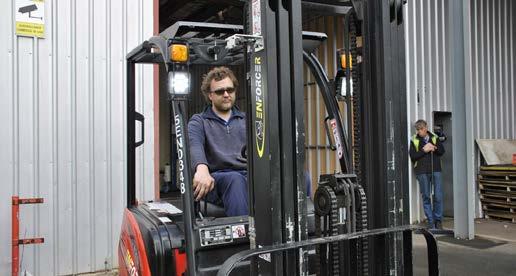
Some useful links: Find a provider Tool www.myagedcare.gov.au/finda-provider/ Service Compliance Rating www.myagedcare.gov.au/ quality/compliance#compliancerating Quality indicators https://www.myagedcare.gov.au/quality/ quality-indicators-aged-care-homes ACG
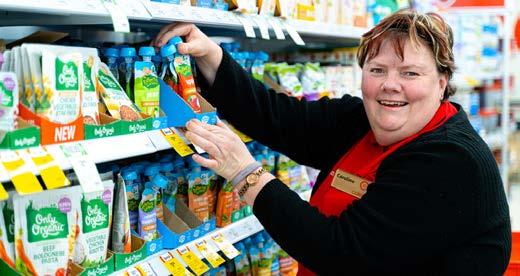


Unfortunately, as we get older, many of us become more vulnerable to illness. While maintaining a healthy lifestyle is one key piece of the puzzle, it’s also vital to have regular and recommended health checks.
By getting health checks at key stages of our lives, you may be able to prevent a health issue through lifestyle changes or detect and treat a condition before it becomes serious.
Key health checks at 50

Visiting a regular GP who knows your medical history and who you feel comfortable with is an important part of managing your health and care needs.
A good GP will help ensure you are up to date with all the recommended tests and screenings.
In your 50s its important to continue with the regular checks you were getting in previous years including blood pressure, cholesterol and glucose levels, cervical screening tests, skin cancer checks, mental health checks and healthy weight assessments.
A health check generally involves:

• updating your medical history and examining your health issues
• performing tests if required
• a follow up of any problems identified
• advice and information on how to improve your health.
Some additional health checks at this stage of life include:
Performed by: Yourself, and your GP can arrange for mammograms
Frequency: Regular self-checks and a mammogram every two years — or more frequently if advised by your doctor
Why: Approximately 75% of new breast cancer cases are in women aged over 50. Finding breast cancer early can mean a greater range of treatment options and may improve your chances of survival. It’s important to get to know your breasts so that you can notice changes more easily. Things to look for include changes in the size or shape of the breast or nipple, changes in the skin over the breast such as redness or dimpling, lumps or lumpiness.
Breast Screen Australia, the national breast cancer screening program, offers free breast screening by mammogram every two years to women aged 50-74. If you have a family history of breast cancer discuss with your GP when and how frequently you need breast cancer screening.
Performed by: Trained specialists at a radiology service
Frequency: On your GP’s advice, depending on your risk factors
Why: Your bones require calcium and other minerals to give them strength and thickness (bone mass or density). Osteoporosis is a health condition where your bones become brittle due to mineral loss. This means you are more likely to break or fracture your bones. A bone density scan checks the bone mineral density of multiple bones in the body. The most accurate and useful test is a type of x-ray known as a DXA (‘dual-energy x-ray absorptiometry’ or DEXA) scan. The test is painless and involves a very low dose of radiation.
Women over 45 can ask their doctor to assess their risk factors for osteoporosis. Your doctor may refer you for a bone density scan if required. The scan is usually only recommended for women over 65 or women with a BMI of less than 20 but some women may have a scan at a younger age if they have an increased risk of developing osteoporosis due to previous fractures, family history, using certain medications, or have certain medical conditions. Osteoporosis also affects men, accounting for 30% of all fractures in people over 50 in Australia. Men over the age of 50 should ask their doctor to assess
their risk factors for osteoporosis. Your doctor may refer you for a bone density scan if required. The scan is usually only recommended for men with a BMI of less than 20, or if they have an increased risk of developing osteoporosis due to a particular medical condition.
Performed by: You with some help from a pathology lab
Frequency: Once every two years, or more frequently as advised by your GP
Why: Bowel cancer is one of Australia’s most common cancers and the risk rises significantly from the age of 50. Bowel cancer screening generally involves a test for blood in the stool, which can be an early warning sign of bowel cancer. Screening is usually carried out through an immunochemical
faecal occult blood test (iFOBT) which involves a simple test that you can use at home and then send to a laboratory for analysis. The test results are sent back to you and your doctor. A positive iFOBT result doesn't necessarily mean you have bowel cancer but it does generally mean you have an increased risk, and your doctor may investigate further, often with a colonoscopy.
The National Bowel Cancer Screening Program offers free bowel cancer screening kits to eligible Australians from the age of 50 to 74. If you've been invited to participate in the program but you're unsure about taking part, talk to your GP about whether or not you need bowel cancer screening.
FOBT kits can also be purchased online and in pharmacies.
hearing loss and investigate possible causes of your hearing problems.

As you enter your golden years preventative health is important. Prevention is cheaper than a cure. Resources 1 Breast www.bcna.org.au/ 2 Bones www.healthybonesaustralia.org. au/ 3 Bowel www.bowelcanceraustralia.org/ 4 Hearing www.healthdirect.gov.au/hearing-test ACG
By Tracy McBeth Journalist and Bupa Healthlink contributorPerformed by: Hearing health professionals, arranged by your GP Frequency: If you have symptoms Why: Hearing problems can affect your quality of life and your risk of hearing loss increases with age. About 1 in 6 Australians has some level of hearing loss that makes communication difficult. Your doctor can treat minor conditions that cause temporary hearing loss, such as ear infections, but they can also refer you to a hearing service for more permanent hearing problems. Hearing health professionals can carry out a range of hearing tests to determine your degree of

Give yourself the gift of health.
After all Health is true Wealth.
During the Brisbane Care Expo so many carers shared with me that one of the biggest challenges they face is dealing with negative parents. Caring is tough however it is made tougher when the person they are giving everything up for is being negative.
The following information is a great insight into what might be some of the issues and includes tips on how to deal with the negativity.
Dealing with negative parents is a challenge whether you are a caregiver or not. No matter what you do, you may feel that your efforts to help are not appreciated, you’re constantly met with complaining or a pessimistic attitude.
The reasons for negative behaviour can’t always be determined, but with a focus on regulating your own emotional responses and trying to understand where this behaviour comes from, you may have some success at turning things around.
You may have your own examples of what you consider to be negative behaviour. A
complaining and a pessimistic attitude might mean you can never do anything right — nothing is good enough.
Here are a few expressions you may have heard more than once:
• “You don’t do enough for me.”
• “You just want to put me in a nursing home.”
• “I can’t do anything anymore.”
• “I’m no good to anyone now.”
• “Stop telling me what to do. I’m not a child.”
• “I have no purpose in life.”
• “Life isn’t worth living.”
Reasons parents are negative Trying to understand why a parent is negative will help you cope better. Having a strategy that addresses possible reasons for a parent’s behaviour might also reduce their negativity: Physical and/or mental decline: Coping with the loss of physical function or memory is depressing and demoralizing.
Pain: Consider the possibility that your parent has unrecognized and untreated pain. This could be due to any number of ailments — arthritis, diabetes, cardiovascular problems, or neurological problems, to name a few.
Loss of independence: Older adults endure a cascade of losses such as friends, driving, the ability to take care of themselves, and a lack of purpose.
Depression and anxiety: Older adults are at greater risk of depression if they have chronic medical conditions. Understanding

Dealing with negative parents is a challenge
that depression is not a normal part of aging will help you identify the symptoms and get your parent help. Irritability is one of the symptoms of depression. Anxiety is another mental health problem that can affect up to 20 percent of older adults. If you suspect either of these mental health conditions, talk to your parent and consult his or her physician.

Boredom: Social connection is a basic human need. If you compare your social life to that of your parent, it might give you some perspective on what he or she is going through. Many older adults have rich, active lives and the community that comes with that. But others don’t have access to social events or don’t know how to make new friends.
Cognitive problems: Unfortunately, age is a risk factor for Alzheimer’s disease. Irritability, anger, confusion, and memory problems are common symptoms. If you suspect your parent has memory problems, try to get the symptoms evaluated.
Dealing day in and day out with a negative parent can be exhausting and draining. It’s like trying to fill up a leaky cup. You may have feelings of inadequacy, shame, and guilt. It seems as though your loving care is not recognized or appreciated. Your parent may even refuse help even though it’s desperately needed. There may be no cure for a negative parent, but we have some tips that can help.
Consider whether this is a new problem If it is, there could be a medical reason for this change in personality. Making an
appointment with your parent’s doctor is advisable. Ask for a complete physical to uncover any potential medical problems.
Possibilities include a urinary tract infection, medication side effects, neurological conditions, new onset of dementia, or a mental health problem.
Accept that negative behaviours is not your fault
It’s tough not to feel responsible when you can’t seem to do anything right. But it isn’t your fault — remind yourself you’re doing the best you can. Some people will not ever be pleased, no matter what you do.
Accept that your efforts have value and that everything you do is with love and compassion. As hard as it may be to trust yourself, doing so will help you cope with negativity.
Acknowledge your parent’s concerns You may have had the experience of trying to talk someone out of their negative thinking only to have them dig in deeper. Try to honour the underlying concern by opening up a dialogue. Suggested phrases:
• “It must be so hard not being able to drive anymore. Let’s look at some ideas on how we can get you out more.”
• “It must be hard not being able to do what you used to.”
• “I can understand how much you must miss your friends.” These phrases may not work, but you may feel better if you try.
If you are a busy caregiver, it is easy to overlook the fact that your parent may be bored. Boredom may be the result of social isolation and loneliness. Try and think of activities that bring people together. Consider inviting your parent to your own social gatherings.
Or teach your parent about technology! Maybe you have a child or grandchild who can help. When someone is confined to home, having access to social networking sites can be a lifesaver. It can take some time to teach an older person to become familiar with technology, but more and more older people are using FaceTime, Facebook, and
Instagram to stay connected.
Plan short trips outside the home to a park or even a drive with no destination. Elderly parents who are cooped up don’t need much to feel a little bit of freedom from their routine.

5 Set limits (if you can)
If the negativity gets to be too much, try setting limits. Be honest about the fact that your parent’s negativity is adversely affecting your emotional and physical health.
It is possible that your dad or mom doesn’t realize much negativity is in the air. In a kind and caring way, give your mom or dad some examples of their negative expressions. You may understand the power of positive thinking and affirmations, but your mom or dad may not. It can’t hurt to give it a try.
At some point, you may need to think about getting your mom or dad some help. Professional help can take off some of the pressure. This help could be in the form of inhome care with caregivers.
Consider hiring out some household tasks such as house cleaning, yard maintenance, or grocery delivery. The fewer tasks you are responsible for, the less opportunity for criticism.
Another sibling may be willing to take over for a while. Sometimes one child can have better success at handling a negative parent. Whatever you decide, having someone else take over for a while may do you some good.
Even a little negativity can have stressful consequences. Taking care of yourself should be a priority. Deep breathing, exercise, mindfulness training, and yoga can all help to relieve stress. Practicing your own positive affirmations can help as well.
If you find yourself unable to cope with your own negative or angry feelings, think about talking with a therapist. Another idea is
to join an online caregiver support group where you are likely to find several people dealing with this same issue. They may have some helpful suggestions on how to manage negativity.
You might just need to take a break from dealing with a negative parent. This is not abandonment or giving up, it is giving you space to recuperate and re-energize. Respect your need for time off while realizing that this decision may be met with resistance. Hold firm in your resolve and be honest about your need to take time for yourself.
Know when to give up Giving up doesn't mean you stop trying. It does mean that at some point, your efforts may not be making a difference. Rather than beating yourself up, accept the fact that you’ve tried your best.
As hard as it may be, managing a negative parent is possible. Focusing on the root causes of this behaviour is a good start. Beyond that, accepting that change may be incremental and slow will help you manage your own emotions and expectations.
Self-care is the foundation of any loving relationship. Focus on what sustains you to build the strength and confidence to deal with an aging parent.”
Be honest about the fact that your parent's negativity is adversely affective your emotional and physical health
Definitely lots of things to think about and if all else fails why not use a professional – a mediator or psychologist can help.
When our father was in aged care he became very depressed after our sister passed away, he was grumpy! No matter what we did we couldn’t help him. We sought professional help and it was the best thing we did for him and it helped our relationships to blossom rather than spiral out of control.

The Doctor – they know their patient and will be a great resource to work out what is going on – if it is a new symptom or ongoing part of their medical condition.
Beyond Blue
Carers Gateway has amazing resources to get help for you – it might be a personal coach for you to learn how to deal with a negative parent or even access to respite. Social interaction is just as important for you as it is for the person you are caring for.
Tips for caring for a negative parent:
1. Know the reason behind the negativity
2. Reframe how you talk with them
3. Ask for help – professional or other family members
4. Set boundaries
5. Respite is important – take a break before you break
6. Know when to give up – some things will never change
https://www.beyondblue.org.au/the-facts/depression Sane
https://www.sane.org/images/PDFs/GrowingOlderStayingWell.pdf
Carers Gateway https://www.carergateway.gov.au/about/person-phone-counselling?cta ACG
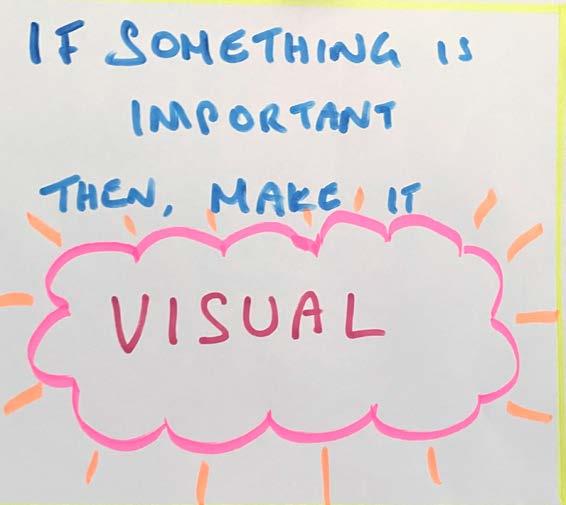 BY JANE SAWYER
BY JANE SAWYER
For years, I have written reminder notes for myself. My visual memory (the ability to recall what my eyes have seen) has always been particularly strong, but I’ve relied on this trait more in my 60s and 70s. Whether it is because I underwent chemotherapy treatment at age 60, or I have more leisure time as a retiree who doesn’t adhere to a rigid work schedule, or my brain is aging, the notes are a big help!

Occasionally, I will post a note on a whiteboard hanging near my desk, or I’ll leave post-it notes on my computer screen, the countertop, or on a mirror. I will even lay a note card on the floor near the threshold from my bedroom to the hallway.
With all these signs placed strategically, I literally bump into them. Is it embarrassing to admit I need these obvious reminders? Yes, it is kind of embarrassing, but I’ve just resolved not to worry about it and create work arounds! They are also decidedly low tech!
Last night I placed an 8.5” x 10.5” whiteboard on the table near the door to my bedroom. It reads “8:00 AM Tues – Pickleball.” Why? Last Friday, I impulsively rushed off to the YMCA to catch a few pickleball games, completely forgetting about a telephone appointment with my doctor. DARN!!!
That missed appointment cost me a fee because by the time I discovered my error and called the doctor, there was no way I could get squeezed back into his schedule. I had even spotted this telephone appointment on my iPhone calendar two days earlier, but I’m impulsive and would usually jump the tracks on a previously laid plan in an instant!
Acknowledging that an impulse of some kind will happen, I know that my chances are much better for making any appointment that is scheduled two days ahead, if I leave a note somewhere in my immediate environment.
Depending on how busy I am, I will scan the calendar for the week ahead and post those important appointments for the week on a small whiteboard or wall calendar
adjacent to my desk. The redundancy seems to work:

• Enter the appointment in the iPhone calendar.
• Check the calendar each morning upon awakening.
• And finally, write the event on a whiteboard, post-it note, 4 x 6” card, or a calendar posted on the wall.
is refer to one of these events as a “Senior Moment.” Losing track of a thought, or forgetting a name or detail, is a frequent occurrence for almost everyone. Poor sleep, not feeling well, anxiety, depression, or a myriad of other influences can cause us to lose a train of thought, so the LAST thing I want to do is label it a senior moment!
There is too much ageism in our world already and I’m not going to feed the beast.
I’m particularly keen on promoting positive, healthy, happy, or whatever aging and NOT using what I see as an ageist label!
Since I’m visually oriented, I can easily “tune in” to a colorful post-it or a colored felt-pen handwritten message. There are colorful post-it notes in my desk and kitchen drawers and a stash of colored felt-tip markers and blank 4” x 6” index cards on my desktop. The notes and reminders are discarded daily, so whenever I create one, it has some visual prominence.
Even as a college student studying for exams, I always remembered the page layout and ink colors that I used in class as I took textbook notes. When exam time came, I pictured the pages in my mind to begin recalling information. These days, post-its and other notes are an extension of this long-time habit.
Following cancer treatment 11 years ago, if I forgot something, I would panic. The doctors said it would get better and it did. Even now, I can walk into a room and forget why I am there, but I no longer panic.
Don’t Panic… Take 3-4 Relaxation Breaths
Obviously, a panicky reaction does me no good at all, and, in fact, it might delay the recall. I know I can accommodate a lapse in memory with coping strategies. My “Go To” behavior for arriving in a room with no clue, is to take a few relaxation breaths and affirm for myself that whatever slipped my mind will return. And it does, almost immediately!
One thing that I have forbid myself to do
A few months ago, after forgetting three events in one week, I asked the Alexa application to announce daily at 7:00 AM “Check Your Calendar.” I use Alexa on an Amazon Echo device, which is a “smart speaker” (a Wi-Fi-enabled device), and I have one in both the bedroom and the kitchen. There are many alternatives to the one I use. Because I write the appointments in my iPhone calendar while I’m scheduling them, and I asked Alexa for the verbal reminders, I seem to be doing better lately. If I hear the reminder, I will check the calendar on my phone wherever I am.
Similarly, if I need to transfer the laundry or unload the dishwasher in a timely manner, I ask Alexa to remind me at a specific time or in 30 minutes. I also add my

grocery lists to the iPhone calendar on days when I’m going to the store.
Ironically, the week before last, I considered cancelling the Alexa reminder because I had habituated (I thought) that behaviour into a daily action. After Friday’s missed appointment, Alexa will continue reminding me!
It seemed silly to do this, at first, but it worked.
While I earlier might have suspected these calendaring glitches were failures in the executive reasoning function of my brain, or that Alzheimer’s disease had set in, now I am a little more forgiving. For years, I watched my elderly father deftly rely on a clipboard with his calendar of daily appointments and lists sitting on the side table next to his favourite chair. He died from Alzheimer’s Disease but remained at home until he was 93.
I know he saved himself worry and confusion by being rigorous with using the clipboard.
I coordinated daytime and evening people coming to the house to look in on him. Ultimately, he needed to move into a memory care unit, but while he was at home, he taught me a lot about just rolling with the aging process with his examples, so “Thanks, Dad!”
I’ve been following a weight loss program for the last couple of years, and one of the leaders suggested posting little signs or reminders in case I needed them. As someone who used to eat unwittingly to quash anxiety or feelings, I benefitted from making a little tent sign that I keep out on the kitchen counter.
The sign reads, “The Kitchen is Closed” and if I leave it on the kitchen counter, it greets me when I impulsively wander there for a snack.
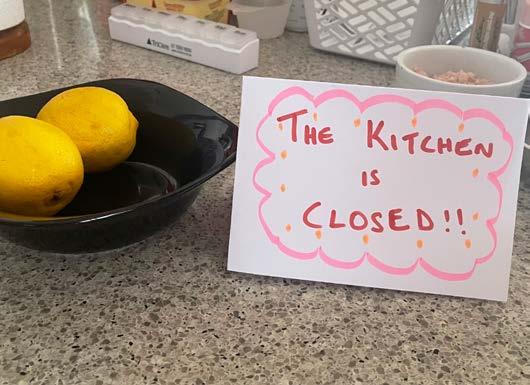
It seemed silly to do this, at first, but it worked.
I slowly became more aware of my unconscious eating habits and curbed the behaviour.
I suppose it might appear strange, leaving notes or reminders around, but they work!
What memory tricks or cues do you use to manage your schedule or household tasks?

Let us know so we can share them with our readers
Email them to editor@acguide.com.au ACG
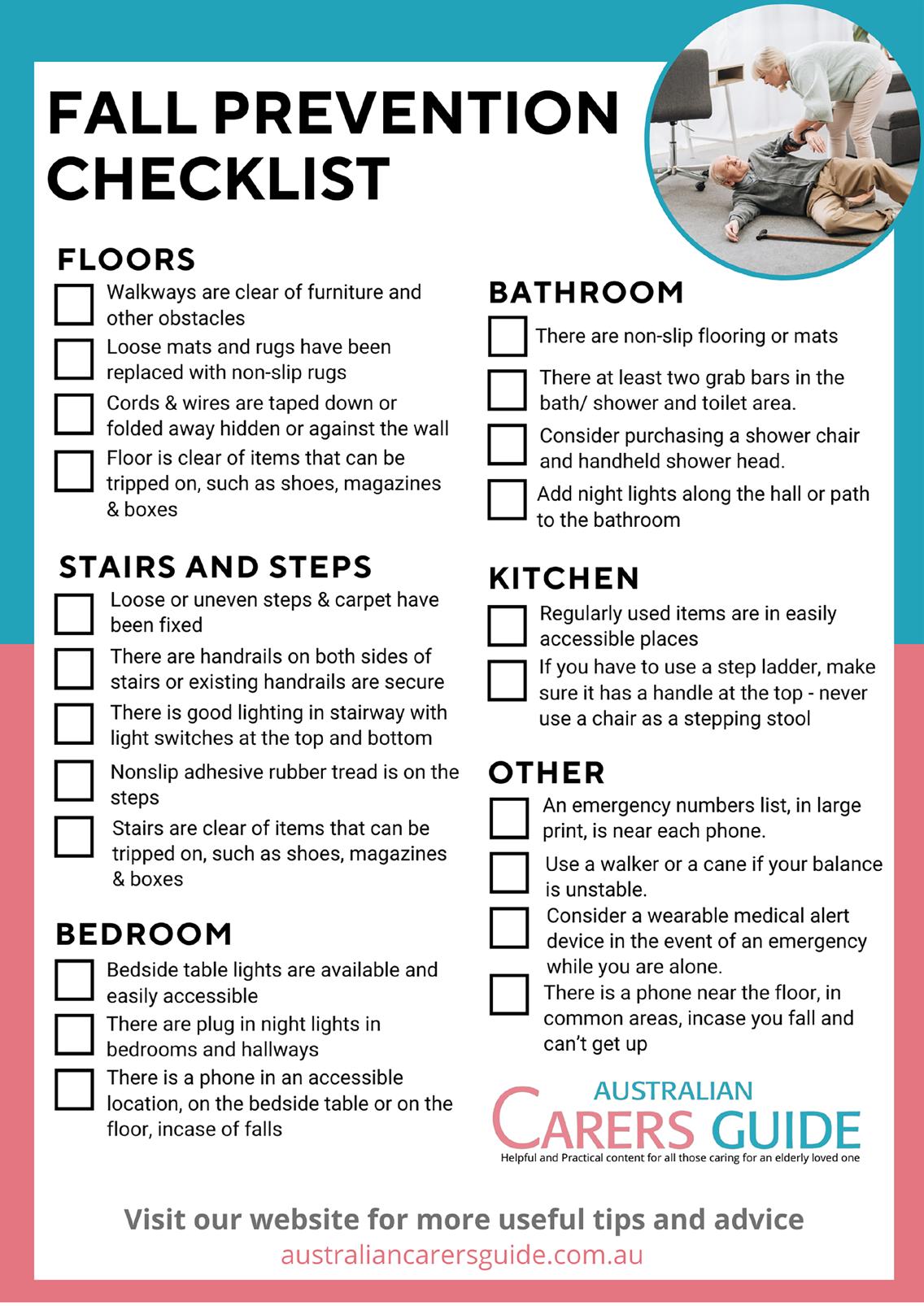

My mother was in her early 60’s when my father passed away. She was living alone in a fourbedroom home in country NSW.
There are four siblings in our family. Apart from one brother and his family who live in the same town, we were all scattered across the country with our own families and jobs.
My mother was fairly healthy, mobile at the time and loved being social. She was friendly with the people in the local town and was well respected. As the years passed, her friends began to pass away or move on. With most of us living interstate, we’d visit when we could but it was never enough. Most of the burden was on my sister-in-law for whom I’m most grateful. In hindsight, if we could have had someone share the house with her, that one small addition could have made a huge difference.
This is the story of many older people aging at home. Loneliness increases their mental decline. Elderly people are at greater
risk of harm as their routines make their activities very predictable. They spend more time online which puts them at risk of being scammed or defrauded. But if they’re not ready for a retirement village or assisted living, they’re not left with many choices other than NDIS services.
If you’re the primary carer for an elderly parent, it can put a huge strain on you and your family. Commonly known as the Sandwich Generation, you’re caught between caring for your own children and your aging parents. Being a parent is tiresome. Running around after your kids, driving them to sports activities, all whilst juggling your own full-time job can be exhausting enough. Add caring for an aged loved one and your life can become overwhelming.
Did you know there are over 13.5m unused spare bedrooms in 10m homes across Australia? Many of these rooms are in households with elderly people. They don’t want to leave their family home or their memories behind, their friends live nearby and the surroundings are familiar. But what if you could use their spare bedroom to help ease the burden of care?
There is a solution!
The Room Xchange is a house-sharing platform that I founded 5 years ago after my eldest child left home. I began to see our empty spare bedroom as wasted space. One of my kids’ friends who was travelling at the time, needed somewhere cheap to stay. My husband was doing some work on our house and needed some assistance with painting. We offered him food and accommodation if he’d help us out. He agreed and The Room Xchange was born. Eight years on, it’s become a wonderful way to live and we are now looking for our next housemate.
How can you better use your spare bedroom?
When your elderly parent just needs companionship and some help around the home, The Room Xchange is an ideal option. (Just to be clear, we’re not talking about personal or medical care, just household help like cooking, cleaning or gardening.) The spare bedroom is an untapped resource for the family and those who are looking for affordable and accessible housing. Think about the knowledge and experiences that can be shared.
In regard to the process, you and your family can find a housemate on your own via our platform. We have a very useful and personalised Matching Service which is based on a ‘No Match - No Fee’ model. We also have an additional premium service that helps both parties facilitate their houseshare agreement. We also welcome your family or carer to be involved in the process.
Today The Room Xchange is Australia’s first verified house-sharing platform. We include mandatory verification via SMS, email and Digital iD check by Australia Post. It’s all done on the website which makes it nice and easy. Our profiles help you find someone with a similar personality, values and lifestyle so you feel like you’re coming home to a friend. The best part is, you can decide if you want some extra income to pay the bills, or you might need some companionship and/or help around the house. We call it the rent or rent offset option and you can offset part or all of the rent, it just depends on what you need.

So, if your elderly parent wants to remain in their family home for as long as they can, this is a good option. I just wish something like this was around when my mother was living on her own. Having the company would have provided her with some companionship and provided respite for my sister-in-law.
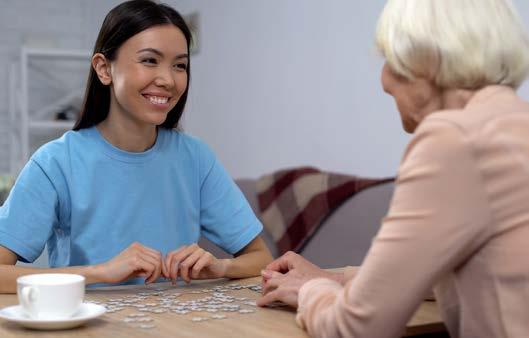

What now:
Go to: www.theroomxchange.com and register for free. We’ll then send you a link where you can book a call with one of our friendly customer care team. ACG
 BY LUDWINA DAUTOVIC
BY LUDWINA DAUTOVIC
As we approach the two-year anniversary on 1 March 2023 of the Royal Commission into Aged Care Quality and Safety final report, we are continuing to make positive changes to aged care in Australia.

The Australian Government is committed to meeting the challenges outlined in the report by making changes to aged care that deliver safety, dignity and quality aged care for every older Australian across our system. We are consulting with older Australians and their families and carers as we develop, trial and deliver these changes to make sure our aged care system meets their needs.
Below are just a few of the latest changes we have put in place:
On 27 July 2022, the Government introduced two pieces of legislation to Parliament to deliver its commitments to fixing aged care.
The first, the Aged Care and Other Legislation Amendment (Royal Commission Response) Act 2022, passed on 2 August 2022, contains 9 measures to assist the delivery of critically needed changes for the aged care system, including:
a star ratings system as a comparison rating for all residential aged care services (by the end of 2022) an extension of the Serious Incident Response Scheme (SIRS) to all in-home care providers from 1 December 2022, meaning increased protection for older Australians from preventable incidents, abuse and neglect
a new Code of Conduct for approved providers, their workforce and governing persons to improve the safety, health, wellbeing and quality of life for people receiving aged care and to boost trust in services.
The second piece of legislation, the Aged Care Amendment (Implementing Care Reform) Act 2022, passed on 27 October 2022, includes the following 3 measures to implement the Government’s election commitments:
requirement for a registered nurse to be on site and on duty in every residential aged care home 24 hours a day, 7 days a week
ban exit fees and enable the capping of administrative and management charges in the Home Care Packages Program
measures to allow greater transparency of information in relation to aged care services, including approved providers and costs associated with residential aged care.
The Royal Commission Response Act also enabled a new funding model, the Australian National Aged Care Classification (AN-ACC), to replace the Aged Care Funding Instrument from 1 October 2022. It provides more equitable funding for providers that better matches the costs of delivering care, enabling a more efficient, transparent and sustainable system.
Under AN-ACC, more equitable care funding is provided to regional, remote, Indigenous and homeless facilities, recognising their additional care costs. Each aged care resident will also be assigned one of 13 AN-ACC classifications, based on an independent assessment, which determines the variable funding component a provider receives.
From 1 October 2022, we also started providing funding through AN-ACC to support residential aged care homes to: meet their care minutes targets
increase their care staffing workforce in preparation for the targets becoming mandatory from 1 October 2023.
Care minutes are the time registered nurses, enrolled nurses and personal care workers spend caring for older Australians who live in government-funded residential aged care homes.
For more information on AN-ACC, visit: health.gov.au/initiatives-and-programs/ an-acc
From October 2022, we’ve made it easier for older Australians with diverse backgrounds and life experiences to access more reliable information about their care providers. This will help them find safe, high-quality aged care services and give them greater choice to match their care needs. Some examples of specialised care include care for: Aboriginal and Torres Strait Islander peoples and communities people from culturally and linguistically diverse backgrounds lesbian, gay, bisexual, transgender and intersex people.
Verified providers who offer care for one or more special needs groups will appear differently from unverified providers on the My Aged Care website, helping older Australians and their families make informed choices about care.
You can search for verified providers using the My Aged Care website’s ‘Find a Provider’ tool: myagedcare.gov.au
We are committed to delivering a reformed and improved in-home aged care program by 1 July 2024, starting with listening to the people who use and deliver the services.
Recently we published ‘A New Program for In-Home Aged Care’ Discussion Paper. This paper builds on previous consultations on reforms for in-home aged care, and seeks feedback from older Australians and their families and carers, as well as the aged care sector.

We are developing a National Dementia Action Plan in collaboration with state and territory governments. The Action Plan will be consumer-focused and include specific actions that promote a collaborative national approach to drive improvements for people living with dementia, their carers and families.
The Action Plan will include a section specifically focused on improving support and services for carers, reflecting their critical role in supporting people living with dementia.
With more than $9.5 billion in the 2022–23 financial year in funding for in-home care support alone, older Australians will see real progress well before July 2024, including: 40,000 additional Home Care Packages
a cap on how much Home Care Package recipients can be charged for administration and management banning of Home Care Package exit fees
improved monthly reporting statements so people receiving home care services can see where their money is going improved access to goods, equipment and assistive technology (GEAT) to make living at home easier
support for aged care providers to recruit and train 13,000 new personal care workers to care for older Australians in their homes
protection from preventable incidents, abuse and neglect through the extension of the Serious Incident Response Scheme to all in-home aged care providers. Find out more at health.gov.au/in-homeaged-care-reform
We have developed a consultation paper to seek feedback to inform the development of the Action Plan and ensure the voices of people with lived experience of dementia are reflected in Australia’s priorities for action on dementia over the next 10 years. The paper has been informed by early engagement with people living with dementia and their carers, and is expected to be released later this year.
We welcome the views of carers and encourage you to register for engagement activities through the Aged Care Engagement Hub: agedcareengagement.health.gov.au/ get-involved
To date thousands of people have let us know what they think about the reforms via surveys, discussion papers, focus groups, interviews and reform webinars.
We are also meeting older Australians out in the community by participating in events around the country. Since our last update we have been to:
Brisbane Carers Expo, Brisbane (15–16 September 2022)
Silver is Gold Veterans and Seniors Expo, Canberra (28 September 2022)
Celebration Day, to launch the Victoria Seniors Festival, Melbourne (2 October 2022)
Disability, Ageing and Lifestyle Expo, Adelaide (28–29 October 2022), among others.
At these events, we heard that older Australians are eager to stay at home as long as possible and maintain their independence. People also told us they are keen to learn more about the progress of aged care reforms.
We have made it easier for you to see what we are doing, find information and read about aged care reform news updates by refreshing our Aged Care Engagement Hub
Visit the new-look website to register your interest to be involved in consultations and upcoming engagement opportunities. You can also sign up to our new EngAged newsletter for older Australians and their carers to stay up to date with what we are doing:
agedcareengagement.health.gov.au/ get-involved
While the festive season is often a time for celebration, it can also bring feelings of stress and fatigue as well as reminders of grief and loneliness. There are a range of government support programs for older Australians and their carers who might need help during this period.
The upcoming festive season can be a reminder that everybody needs a break and support at times. While caring for somebody
else, it is important that carers look after themselves too.
Carer Gateway provides many services to support carers in their caring role, including: in-person and online peer support groups tailored support packages (including planned respite options) in-person and phone counselling in-person and online self-guided coaching online skills courses access to emergency respite. ‘Respite’ or ‘respite care’ is when someone else takes care of the person you care for, so that you can have a break. A break can give you time to do everyday activities, deal with stress and look after yourself.
You can access Carer Gateway services in a number of ways: Visit the website at carergateway.gov.au
Or call 1800 422 737 Monday to Friday between 8am and 5pm to speak with your local Carer Gateway service provider.
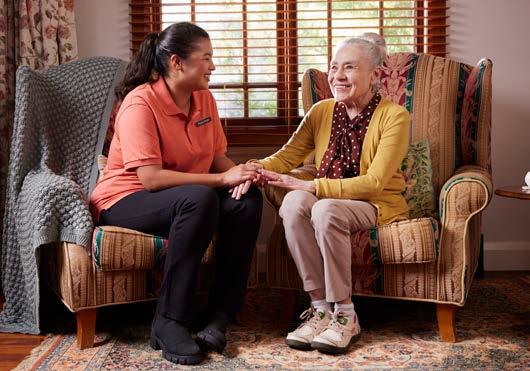
They will talk you through the registration process and start the planning process. This process helps our staff learn more about you and your caring role so they can match services to your individual needs.
You can also ask someone to call you back at a convenient time.
For help with accessing emergency respite, call 1800 422 737 any time 24/7.
Helping those in and around aged care to cope with the continuing impacts of COVID-19
COVID-19 has placed extreme pressure on the care and support sector and continues to affect everyone. Some people might be suffering from loneliness due to the effects of social isolation or visitor restrictions.
Others may be mourning the death of a loved one or navigating major changes to their lives, such as leaving their home to move into residential aged care.

If you or someone you care for needs support, there is free and confidential help available. Support includes counselling, information on self-care, resources and advocacy services. There are also specific services for carers.
Visit our website to find out how you or your loved ones can access free, private and confidential grief and trauma support: health. gov.au/grief-and-trauma-support-services
Having the opportunity to connect with Germana has really taught me that everyone has different perspectives. I really benefit from a lot of her wisdom and stories.
We in the aged care facility, we do need communication with outside people. I appreciate Carlo for what he is because when you’re old, you feel you’re put on the side and that’s it. And with him I don’t feel like that. So that is something that I appreciate very much.
There’s somebody in aged care who’d like to talk to you. They always want people to come and visit.
This year we are celebrating 30 years of the Community Visitors Scheme (CVS). The scheme connects volunteers with someone in their neighbourhood who is receiving aged care services – both residential aged care and home care services – who is feeling isolated or lonely.
Volunteers come from all different backgrounds and from all over Australia. The relationships that develop are lifechanging for both the volunteer and their older friend.
Sign up to become a CVS volunteer visitor: health.gov.au/cvs
Celebrate International Volunteer Day 5 December 2022
The CVS is filled with inspiring stories and tales of friendships. Learn about Carlo and Germana’s CVS story:
It could be one hour, it could be 2 hours, one day a week. Come in, have a chat with somebody. To put a smile in somebody’s face, it’s easy and it’ll change someone’s life.
Watch the story of Carlo and Germana’s friendship: health.gov.au/cvs
Ageing and Aged Care Group Australian Government Department of Health and Aged Care Information correct as at the time of printing
Community Support Inc provides personalised and professional support services to help you live Your Life. Your Way. csisa.org.au

We can support you wherever you want to go. Our Support Workers can provide you with Social Support, Community Access and Transport Assistance to go out and do the things you enjoy. This could include shopping, appointments, sporting activities or to meet with friends. We will support your goals every single day.

To find out more, contact us today!
Telephone 08 8429 1200 Email hello@csisa.org.au Or via our website csisa.org.au
Have you noticed sudden subtle changes with your aged loved ones? Is something just not right?
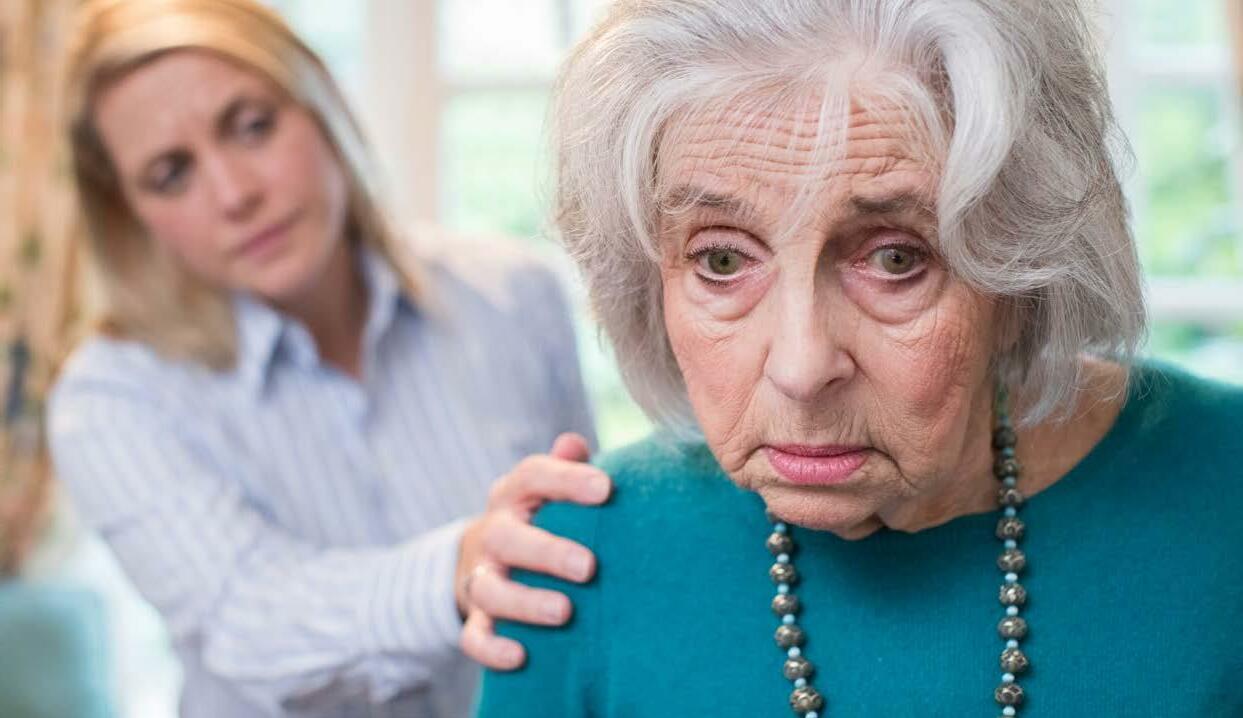
Out of the blue they are talking to things that aren’t there or answering the TV? Rambling and nonsensical at first you smile and think it is nothing but then it starts to worry you? Has this happened to you?
I was talking with a friend recently and she mentioned that her mother was talking to the green iguana sitting on top of the TV and no matter how many times she told her there wasn’t anything there her mother didn’t believe her and she became more agitated and aggressive.
You would be surprised to know how often this happens.
You walk in and find your mum lying in bed and talking to the people on the ceiling – what do you do?
Is this the new normal or something temporary?
Is it delirium or dementia?
The following information looks at delirium and how it differs from Dementia.
It describes the causes, consequences, diagnosis and management of delirium. This Q&A sheet does not include information about delirium tremens (state of confusion caused by withdrawal from alcohol) or terminal delirium (delirium that may occur in a dying patient).
Delirium (or acute confusion) is a serious acute medical condition whereby a person’s mental ability is affected. It develops over a short
period of time (usually within hours or days) and symptoms tend to fluctuate throughout the day. It is a common condition in older hospitalised people, but it can also occur less commonly in people who are not in hospital. Delirium is potentially preventable in up to two thirds of hospitalised patients and is often treatable if it develops. Delirium causes distress for the person with delirium, their families and treating health care providers.
Delirium makes it difficult for a person to pay attention or focus. This means that the person is unable to think clearly and may not be able to answer questions or follow a conversation. A person who has delirium will have difficulty understanding what is going on around them, sometimes causing them to hallucinate or become paranoid. Other signs and symptoms of delirium include the following:
• Trouble with memory, particularly recent events, orientation, or knowing where one is or who they are or what time of the day it is
• Rambling or incoherent speech
• Difficulties with perception that is not otherwise accounted for by a pre-existing, established or evolving dementia
• Hyperactive delirium – restlessness, agitation, irritability, combative behaviour or hallucinations (seeing or hearing things that are not there) and delusions (falsely believing something is occurring)
• Hypoactive delirium – quiet, drowsy and lethargic, this is often missed and is known to have the worst outcomes
• Mixed delirium – a mix of both hyperactive and hypoactive symptoms
• Disruptions in normal patterns of sleeping and eating

Delirium is most commonly due to a medical cause including severe illness, constipation, dehydration, infection, pain, drug effect or withdrawal (especially alcohol and sedative drugs). However, causes of delirium are numerous, complex and often mixed (multifactorial). In some people the cause cannot be identified. Currently the
nature of delirium and what happens in the brain is not fully understood but there is extensive international research being undertaken to unravel this mystery. Who is at risk of developing delirium? Pre-existing cognitive impairment such as dementia, and older age, represent the most significant risks for a person developing delirium (up to two-thirds of all people affected by delirium will be in these categories). However, there are an extensive number of risk factors for developing a delirium including severe illness, dehydration, poor eyesight, metabolic disturbances, surgery, certain medications or changes in medications, and use of physical restraints. People who have previously experienced a delirium are also at greater risk of developing a delirium if they become unwell.
Diagnosis relies on a history of the course and onset of changes in the person’s behaviour and mental state and an assessment which looks for the presence and absence of other certain features. A history from the family or others who know the person is essential and should confirm that there is an acute change from the person’s usual mental state and behaviour. The most widely used standardised delirium diagnostic assessment tool used by trained clinicians is the Confusion Assessment Method (CAM) however; there are many other standardised tools available. There is no blood or other laboratory test to diagnose delirium.
Find and treat the cause
Delirium is best managed and complications can be decreased if it is:
• recognised early, and
• the causes are identified and addressed quickly
A comprehensive history and assessment (in consultation with the family) of medical conditions, physical, cognitive, social and behavioural function and other possible causes must be undertaken. Early detection and medical treatment of biological causes will lead to better outcomes for the patient.

(recommended best practice)
which include:
• Family visits: it is reassuring and calming for a person with delirium to have family or familiar people around. When visiting a person with delirium, bring in personal items that help remind the person of home
• Effective communication, reorientation and reassurance to reduce distress and anxiety: speaking slowly in a calm voice, and reminding the person where they are, and what day it is can help to reduce distress and anxiety
• Ensure that the person with delirium is well hydrated and nourished: encourage and assist them to eat their meals and drink fluids
• Sleep enhancement strategies: including relaxation music
• Ensure that the environment is safe and soothing: remove any sources of excess noise and stimulation.
• Provide sensory devices such as glasses or hearing aids if needed: poor eyesight and hearing can make confusion worse
• Review medications by medical personnel
• Regular mobilisation (physical and occupational therapy)
People with delirium can often be fearful or feel threatened. They may have hallucinations and/or delusions that
cause them distress. If the person is distressed or at risk of harming themselves or others, medication is sometimes used. However, routine or continued use of these medications is not recommended and may be harmful for some people, for instance, those with Lewy body disease.
Preventing complications
Ongoing management of delirium involves the prevention of harm through risk management strategies (such as falls prevention), and through environmental modifications which enable the provision of safe and supportive care.
Delirium and dementia are both disorders where there is broad or widespread (global) cognitive impairment. They can occur separately or at the same time in older people (delirium superimposed on dementia). The presence of dementia makes the brain more susceptible to developing delirium. Dementia, diagnosed or undiagnosed, increases the risk of developing delirium approximately five-fold. Although the time course and pattern of symptoms differ, many of the symptoms of delirium and dementia are shared. Consequently, delirium may go unrecognised, even by healthcare workers. It is usually wrong and very harmful to newly diagnosed dementia in a confused (usually older) inpatient, as delirium is often the cause. Attributing the symptoms of delirium to undiagnosed dementia can lead to serious consequences and can delay the treatment of the actual condition. Patients may get incorrectly labelled as having dementia and yet can be nearnormal several weeks later. The acute onset and fluctuation of symptoms in delirium usually assist in differentiation,
Many of the symptoms of delirium and dementia are shared
and the input from family or significant others is also important to separate a delirium from an underlying dementia. Evidence suggests that delirium may hasten cognitive deterioration in people with pre-existing dementia. In later stages of dementia, people frequently develop symptoms similar to a delirium. Additionally, delirium is more common in those with Lewy body disease and is not just a worsening of Lewy body disease symptoms.

Delirium is often associated with poor outcomes and it is likely that the more severe and longer the episode of delirium, the poorer the outcome. It can have drastic short and long term consequences for the person such as falls, a decline in their physical strength and function, early admission into residential care, increased healthcare utilisation and costs, and increased risk of death. Some people who have had a delirium may never return to their former cognitive or functional capacity. Delirium can reoccur even after a person has returned home.
Further Information Dementia Australia offers support, information, education and counselling.
Contact the National Dementia Helpline on 1800 100 500, or visit our website at www.dementia.org.au ACG
Families and carers should inform health professionals if their loved one or the person they care for is displaying symptoms of delirium, or appears to be acting ‘different’ to how they normally would. If delirium is suspected, it is important to inform a health professional as soon as possible, because it may be the first and perhaps the only clue to an underlying medical illness or an adverse medication reaction.
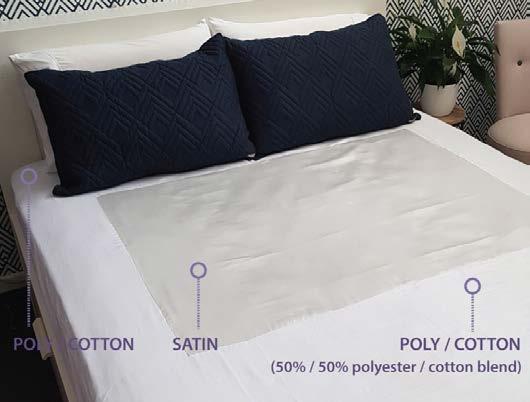
Be prepared to report any changes to the doctor that may be relevant including:
• All medications and any that may have been recently started or stopped
• Any environmental changes
• Any health changes (for example, a change in bowel or bladder habits, pain or fever)
What are the problems or complications of developing a delirium, if it is not diagnosed & appropriately managed?
What can families and carers do if they suspect someone they care for has delirium?

While many people plan for retirement, often counting down the years, months and days, very few plan for aged care.
 by rachel lane from aged care gurus
by rachel lane from aged care gurus
Instead, aged care is thought of when a crisis unfolds, which can make the decision rushed, emotionally difficult and very expensive. Understanding the options available to you and being able to quickly calculate and compare options before you need care can help you to have more choices, make better decisions and save a lot of money and stress.

One reason why people avoid planning for aged care is because they think it is “a slippery slope to a nursing home. It might help to know that of the 1.5 million Australians who received aged care last year only 243,000 lived in an aged care home. So the first place to start is, Where will you live?
There is a smorgasbord of accommodation options available to senior Australians, including apartments, granny flats, retirement villages, land lease communities, and residential aged care.
Before the need for care arises many people are adamant about staying in the family home. But there can be significant downsides to this, from a practical point of view most homes are not built with the view to providing care, and while some modifications are simple and inexpensive, others may cost tens of thousands of dollars, or simply be impossible. And then there can be the growing isolation if you are no longer driving or have been widowed.
You may wish to move in with one of your children, in doing that you may establish what Centrelink call a “granny flat
right”. Granny flat arrangements can have enormous implications emotionally and financially for you and the person you live with so it needs very careful consideration. Retirement villages and land lease communities are becoming a favoured accommodation choice for many retirees as the homes are often built with a view to delivering care and there is often a strong social network. Retirement communities can often provide a good balance between independence to do the things you can do and support for the things that you can’t (or don’t want to) do.
One of the crucial considerations about your accommodation options is at what point would you need to move again. Do you want live somewhere that can support you as you age, or would you prefer to kick up your heels for as long as possible — then move again if needed?
Of course, not everyone will have that choice. When it comes to your safety and wellbeing the right decision may well be to move into an aged care home. Many aged care homes nowadays resemble a 6 star hotel more than they do a “nursing home” of years gone by, you may be pleasantly surprised by your options.
How much care you need now and how much you anticipate needing in the future are crucial considerations.
There is a range of government funded care and support services available to you through Commonwealth Home Support Programme (CHSP), Home Care Packages, Department of Veteran’s Affairs (DVA) services and other programmes such as the Short-Term Restorative Care and the Transition Care Programmes.
The first step in accessing government funded aged care is to have your care needs assessed, which starts with a call to MyAgedCare.
To receive Commonwealth Home Support Programme (CHSP) services you will need a Regional Assessment Service (RAS) assessment. To get access to a Home Care Package, Transition Care, Short Term Restorative Care or have a respite stay or a make a permanent move to an aged care facility you will need to have an Aged Care Assessment Team (ACAT) assessment.
The assessments are free and easy but you can be waiting many weeks, sometimes months, at busy times.
When it comes to the ingoing there may be transaction costs such as contract preparation fees or stamp duty that you need to factor in on top of any price. Whatever accommodation choice you make there will normally be ongoing costs associated with it, in a granny flat arrangement you may be rent or board, in a retirement community there is normally a weekly or monthly fee, in residential aged care you will need to pay a basic daily fee and possibly a means tested care fee, you may also choose to pay some (or all) of your accommodation cost by daily payment.
There is a smorgasbord of accommodation options available to senior Australians
While many people think of home care as a regular service in the case of Short Term Restorative Care and Transition Care these are generally more intensive short-term programmes that can be provided in your own home or an aged care home, or a combination of the two.
When it comes to the other home care services it’s important to know that you can access more than your regular care. They can also provide you with equipment and aids, home modifications, respite services, transport, home and garden maintenance and social activities.
In addition the government funded services there are also private care services which you may wish to use instead or to topup the funded services.
What will it cost?
When it comes to your accommodation costs it is easiest if you break it down into your ingoing, ongoing and outgoing.
In some properties you will have a contract that has an exit fee which can be complex formula that involves shares of capital gain or loss, renovation costs, marketing expenses and selling fees. In some cases your property may also be subject to a guaranteed buyback, in the event that it doesn’t sell within a certain period you are guaranteed to get your money back. In the case of a granny flat your exit fee is often 100% because the granny flat can’t be sold separately to the home. When it comes to the cost of your care, the amount you will pay for government funded aged care is often based on a basic daily fee (up to $12 per day for home care and $57 per day for residential aged care) plus a contribution based on your means. For home care you are only assessed based on your income, in residential aged care it is a combination of your assets and income. If you receive private care then you will simply pay the market price.
Your accommodation and care choices can have significant legal and financial implications today and in the future. Ultimately whatever accommodation and care options you make will involve a contract (yes, even if it is a granny flat arrangement with your children you should still have a written agreement). You should look at your contract through 3 lenses; your rights,
responsibilities and costs and make sure that the balance of those 3 things is fair.
Before you make any decisions you should make sure you understand how it will impact on your:
• overall asset position
• (or your children’s) need to pay tax
• pension entitlement and other benefits such as rent assistance and health cards



• investments
• cash flow
• estate planning wishes
• ability to fund residential aged care in the future (if that is not your choice now)
While many people bemoan the complexity of aged care decisions the complexity comes from the fact that you have so many choices, and that’s a good thing! Aged care is a smorgasbord, it’s certainly possible and quite common to move from one arrangement to another.
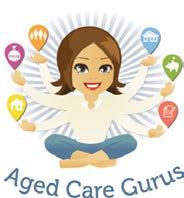
The two most common mistakes people make are leaving it too long (reducing their options) and not seeking specialist advice (costing themselves far more than the advice would have been), so plan ahead and seek specialist advice. ACG
Rachel Lane is the Principal of Aged Care Gurus where she oversees a national network of specialist advisers.
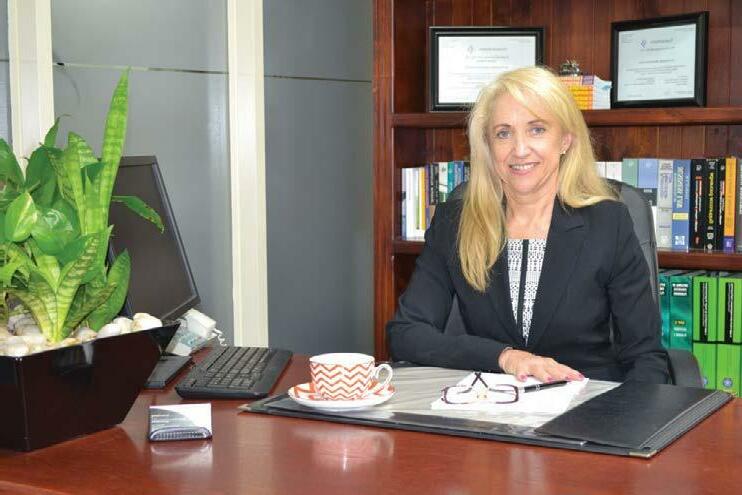
She writes regular columns on retirement living and aged care for the Sydney morning Herald, Melbourne’s The Age and the Brisbane Times and she often speaks on TV and Radio. Rachel has co-authored a number of books, including the Best Seller Aged Care, Who Cares? and her new book Downsizing Made Simple.
All figures are correct as of 1 November 2022

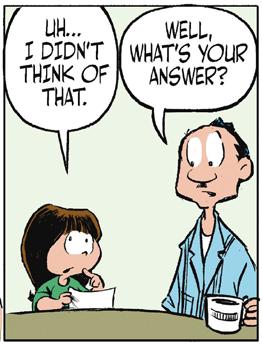


Laughter is good for the soul and a merry heart does good like medicine so try these.
What is the difference between a man and a cat? One eats a lot, is lazy and doesn’t care who brings the food. The other is a pet.
Hey ladies, did you hear about Roy?
He had his left leg amputated. How is he? He’s all right now.
Why were the police called to a day care centre? Because one of the children was resisting a rest.
You know the son of Harry in room 22 is a drummer. He just gave birth to 2 baby girls. He called them Anna 1 – Anna 2.
Two cows talking in a paddock and one says to the other Moo and the other turn to him and say, Doh I was gonna say that.

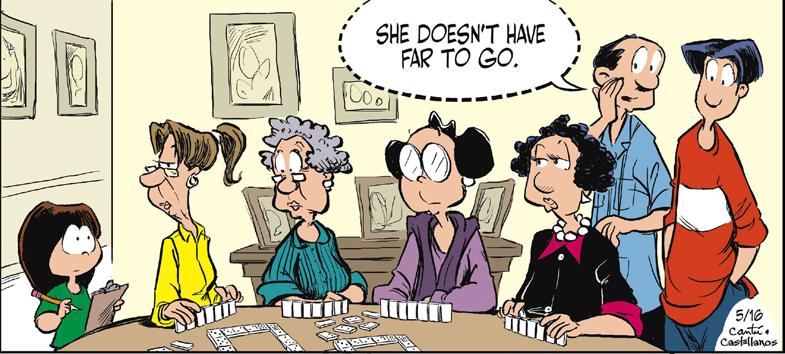




•
•
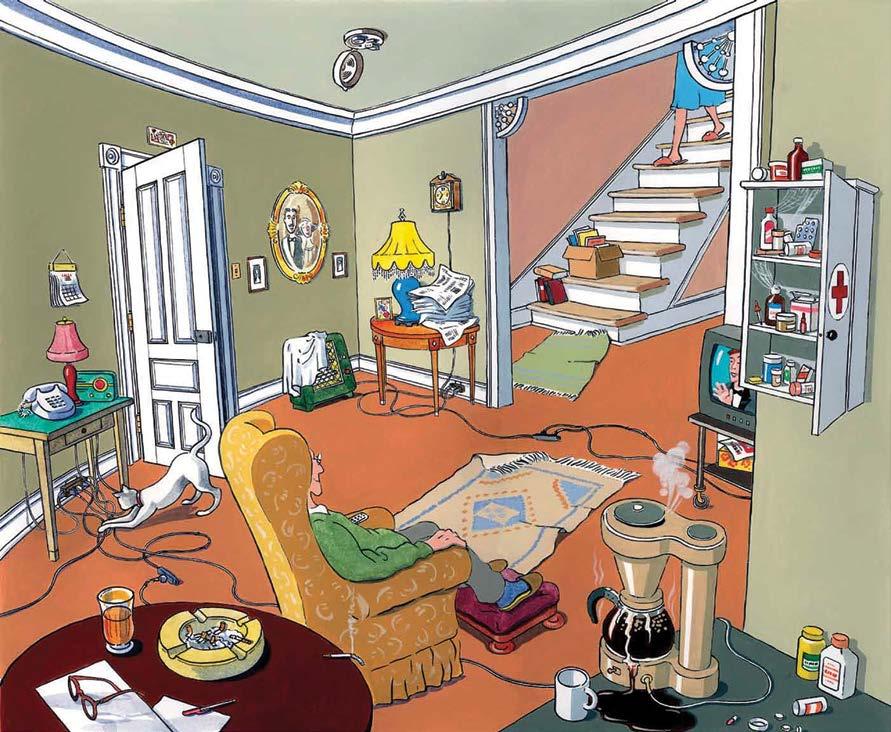








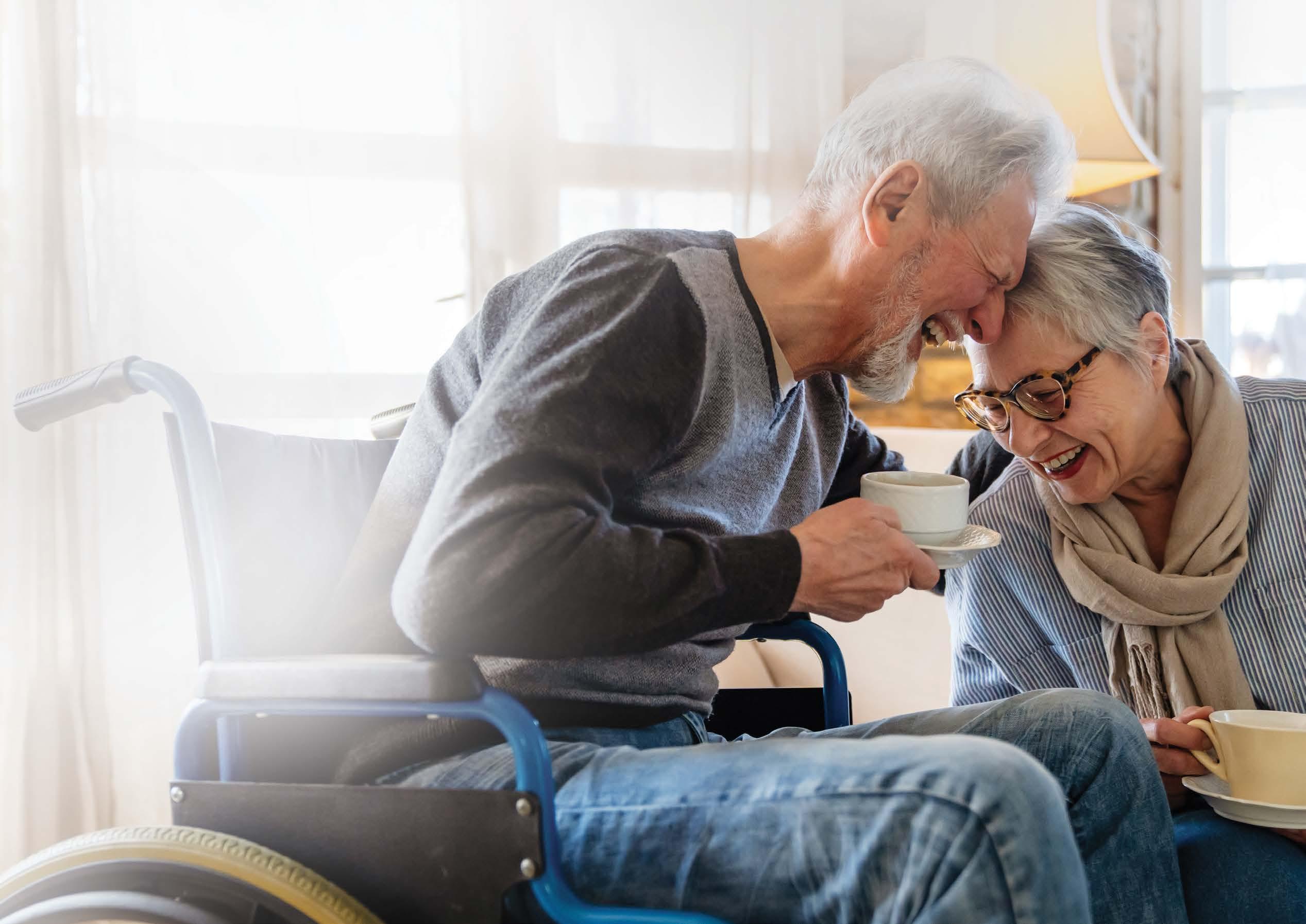



What you need to know before considering if it’s suitable for your family?
With so many people building granny flats on their property as an option for assisting with aged care for their loved ones the following advice from Phillips Wealth Partners is timely.
Living in a multi-generational household can bring an immense amount of satisfaction and benefits to everyone involved and in some cases, avoids the requirement to use third party services. Being that it has become an increasingly popular downsizing option. It’s important to know what considerations to discuss with your family before entering into a Granny Flat Arrangement.
What is a ‘granny flat arrangement’?
“Commonly, a ‘granny flat arrangement’ is a situation where an older person lives with (or in separate accommodation on the same land as) a family member and does so with payment of monies or a transfer of assets in return for the right to live in accommodation, usually for the rest of their life”.
Also referred to as ‘granny flat right’, this arrangement can be structured in a number of different ways. The fundamental concept is some property is transferred, or some monies are paid, in return for the right to reside for the balance of their life.
Until legislation passed in June 2021 many families were reluctant to document the changing of money as it likely meant a possible unwanted immediate capital gains tax event for the recipient of the gift.
This left the older person in a vulnerable position, should the arrangement not work out.
To ensure your plan to engage in a Granny Flat Right protects all stakeholders involved we will give you the security the right decision has been made by reviewing the impact to your:

• Tax;
• Estate planning;
• Centrelink (specifically, the impact on age pension and home care packages); and
• Prepare an exit strategy
The number of elderly parents living with their adult child's family is projected to increase in Australia. It is predicted that between 858,400 and 904,600 senior Australians will be living in an intergenerational arrangement in 2041 (592,600 in 2016).1
This trend has triggered an increased interest in ‘granny flat arrangements’. I spoke with lawyer, Jo Twible, Principal, KJB Law, and
retirement village entry and exit specialist, about preparing for a win-win situation when entering into a ‘granny flat arrangement’.
In Jo’s experience, doing your homework up front will help avoid heartache down the track.
What is a ‘granny flat arrangement’? “Commonly, a ‘granny flat arrangement’ is a situation where an older person lives with (or in separate accommodation on the same land as) a family member and does so with payment of monies or a transfer of assets in return for the right to live in accommodation, usually for the rest of their life”.
Also referred to as ‘granny flat right’, this arrangement can be structured in a number of different ways. The fundamental concept is some property is transferred, or some monies are paid, in return for the right to reside for the balance of their life.
The term ‘granny flat arrangement’ or ‘granny flat right’ is used to describe living situations where money, assets or the title of one’s home have been transferred in exchange for a right to a lifetime accommodation in a private residence.
Physically, what does that granny flat look like?
Most people have a misconception that a ‘granny flat arrangement’ is limited to a small, detached house located in the backyard. There are many iterations to this arrangement.
“It could be a detached unit in the backyard of a home. It might be an attached unit to the main dwelling, with just a door in between. It may not even be separate at all – it might simply be a room or rooms within the main family home and sharing of facilities,” says Jo.
“Alternatively, in a different situation, ‘Granny’ could own a caravan or a demountable structure that she lives in and takes away, and there is otherwise no transfer of monies.”
Why enter a ‘granny flat arrangement’?
There are a number of reasons families choose this option. First and foremost, it’s driven by a desire for family members to help each other out.
“In most cases we see, this is an informal arrangement created to provide support for
an older adult to keep them independent and living at home longer,” says Jo.

“It usually involves loving families with a parent who is slightly more vulnerable and needs a bit of extra support. Equally, the kids might need some extra support with the grandkids.”
The intention is to create a situation which is mutually beneficial, where each is providing support to the other, rather than relying on third-party services.
What are the key considerations? Given there is no age or family relationship rules or requirements, there are potential pitfalls. If you’re considering a ‘granny flat arrangement’, Jo advises the careful assessment of the following four key consequences:
1. unexpected tax;
2. estate planning;
3. Centrelink (specifically, the impact on age pension and home care packages); and 4. an exit strategy, if the situation does not work. According to Jo, ‘granny flat arrangements’ require a multidisciplinary approach.
It is important to get legal advice, tax advice and financial planning advice. For example, everyone needs to be thinking about inadvertent tax consequences,”says Jo. “The elder person is usually the one that needs the financial advice about the impacts on their pension. We may not be able to get a winwin situation completely, but the aim is to ensure we are not getting a big lose situation.
In a recent example, Jo highlights common issues:
Jo gave an example of an elderly mother whose daughter, husband and their children have been living with her for over a decade. The daughter and husband have put a substantial amount into Grandma’s property (estimated increase in the value of $250,000).
Grandma is currently the sole owner of the house despite the daughter and son-in-law paying for the renovations. Technically, any increase in capital value remains with Grandma.
Jo highlights the following areas to consider when reviewing this example. There is “no super-easy answer that provides protection to all parties”:
Tax: Grandma does not want an arrangement which results in the daughter incurring a big tax bill.
Estate planning: Grandma wants to ensure her daughter benefits from the $250,000 she and her husband spent on the home. However, she has another two children and wants to leave equal shares in the remainder of the property once she passes. The house is the only asset she owns. Therefore, transferring the title of her home to her daughter and son-in-law to receive a lifetime right to continue living in that home, will likely cause issues if the daughter is not in a position to pay Grandma enough money to ensure she has assets to leave to the other two siblings.
Centrelink: When a person has a ‘granny flat arrangement’, special rules apply to determine whether they are a homeowner or non-homeowner for social security income payments. Prior to entering an arrangement, an assessment will need to be made on the impact to grandma’s pension entitlements and co-contributions for home care packages, if any.
Deprivation/gifting rules: The market value of the house may be treated as a deprived asset. This applies to a payment, or payment in-kind, if the parent transfers the house to the child for free, if this is more than $30,000 over a rolling period of five years. The excess will be counted not only as an asset but as a financial asset attracting deemed income for five years commencing when the gift is made.
• Sole ownership: if the grandma keeps the property in her name, then no ‘granny flat arrangement’ is in place.
• Co-ownership: arrangements to review are tenancy in common, joint tenancy, life estate.

• No ownership: security of tenure needs to be taken into consideration in a form of a loan, lease or licence at will.
Capital Gains Tax event D1 (creating contractural or other rights): A CGT event does not happen when certain granny flat arrangements are entered into, varied or terminated. On 1 July 2021, the new law states:
• A CGT event does not happen on entering into, varying or terminating a granny flat arrangement if certain requirements are met. These requirements include that the individual having the granny flat interest has reached pension age or has a disability and that the arrangement is in writing and is not of a commercial nature.
• The CGT event does not happen only to the extent that it relates to the creation, variation or termination (as the case may be) of a granny flat interest.
• A granny flat interest in a dwelling under this measure is a right to occupy that dwelling for life.
Stamp duty: if the grandma transfers the title or part title of her home to the daughter or her daughter and son-in-law, they will pay Stamp Duty on the Transfer.
Reasonableness test: Under the Social Security Act 1991, if the combined amount of any assets transferred and monies paid to receive the right to reside, is more than the cost or value of that interest, the excess amount is a deprived asset.
Moving out: Any arrangement made needs to set out what will occur if grandma needs or wants to move out. If grandma moves out within 5 years of entering the granny flat arrangement as a result of something that was reasonably foreseeable, Centrelink may change how they treat the money paid or assets transferred and suddenly start counting them as a deprived asset for the subsequent 5 years. If grandma needs 24-hour care in an aged care home, consideration needs to be made on how she can pay for this care. If, despite best intentions, grandma and the kids realise that living that closely together isn’t working, consideration needs to be given (ahead of time) as to how to fund grandma obtaining alternate accommodation.
Informed decisions need to be made as to whether ‘granny flat agreement’ will confirm the elder has security of tenure and include matters such as:
• areas on the property, for exclusive and common use;
• a period of notice, where either party can end the right of residence (except in the case of coownership);
• how each person will contribute to domestic expenses such as utilities, insurances and rates;
• how each person will contribute to domestic chores and the maintenance of the property;
• payment of rent (if any);
• exit strategy, including how the elder’s cost of residential care will be covered if required; and
• how the elder will be compensated if the living arrangements are otherwise ended?
There is a lot of “damned if you do, dammed if you don’t” in this area. It is not straight forward. With careful thought and planning, families trying to help each other won’t end up torn apart, by their good intentions. Best you begin by having a chat to a lawyer and if you don’t have your own then you can reach out to Craig at Phillips Wealth Partners at www.phillipspw.com.au
REFERENCES: 1: ABS AusStats ACG
No-one likes to talk about getting old, but when you or a family member needs help, there’s no getting around it. Many of our clients want to know what choices they have in their older years – and before the crisis hits.
Making an informed decision about retirement living and aged care is incredibly important. Making the wrong decision can have far-reaching consequences for the whole family. When these decisions go badly, the stress can lead to family conflicts and significant financially difficulties.

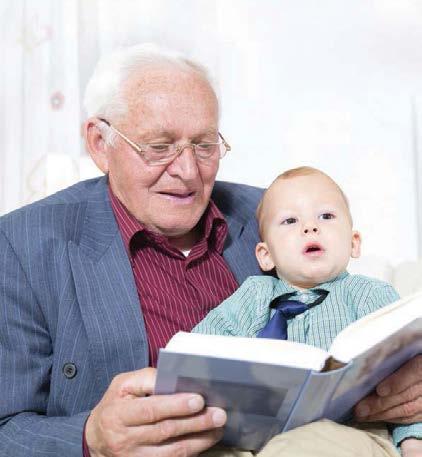
Not all advice is good advice, this is a specialist area. The rules change constantly, as do the available strategies. Drew Potts from Potts Duhring Financial Advisors is an experienced and professionally recognised specialists in this important area and has the skills and knowledge to give you good advice.

Retirement living and future care –are you financially prepared?
Life is uncertain: we can never be 100% sure what is going to happen. Some people are OK with this and find it easy to embrace new experiences. Other people struggle with uncertainty: it is almost as if they have a phobia of it, and they often do things like worry or plan in attempts to reduce uncertainty.
Motivation: seek certainty (safety).
Behaviour: worry, plan, check, avoid, seek reassurance, routine & habit.
Situations that are:
•Ambiguous
•Novel
•Unpredictable
EMBRACES UNCERTAINTY
Motivation: seek new experiences.
Behaviour: open, curious, spontaneous, willing to tolerate discomfort.
Embracing uncertainty can allow you to enjoy more of a life, and to respond more flexibly to challenges that come your way. One way of doing this is to gradually introduce uncertain events into your life. Try to embrace uncertainty by experimenting with some of the tasks below:
Walk a different route.
Order something new from the menu in a restaurant.
See a film at the cinema without reading reviews. Have a different lunch every day.
Wear something ‘new’ for you (e.g. style, brand).
Sit in a different place than you normally do.
Do an activity that you have avoided so far.
Try a new class.
Read a different newspaper, or something by a new author.
Talk about things that are more ‘risky’ for you (e.g. politics, yourself, opinions).
Go somewhere you have never been.
Talk to someone you don’t know (ask a question, pay them a complement).
Listen to music that you wouldn’t normally listen to.
Delegate tasks to others.
Sleep on a different side of the bed.
Try a different brand of toothpaste.
•Adopt the mindset that it is good for you to take small risks and challenge yourself.
•Make ‘trying new things’ a regular part of your life.
•You’re trying to build a ‘tolerance of uncertainty muscle’ so you will need to practice regularly.
• Maintain a curious and open approach by focusing on the outcome of your experiments, not on the emotional experience: What did you learn? What did you experience that was new and exciting? What did that experiment do for your confidence?
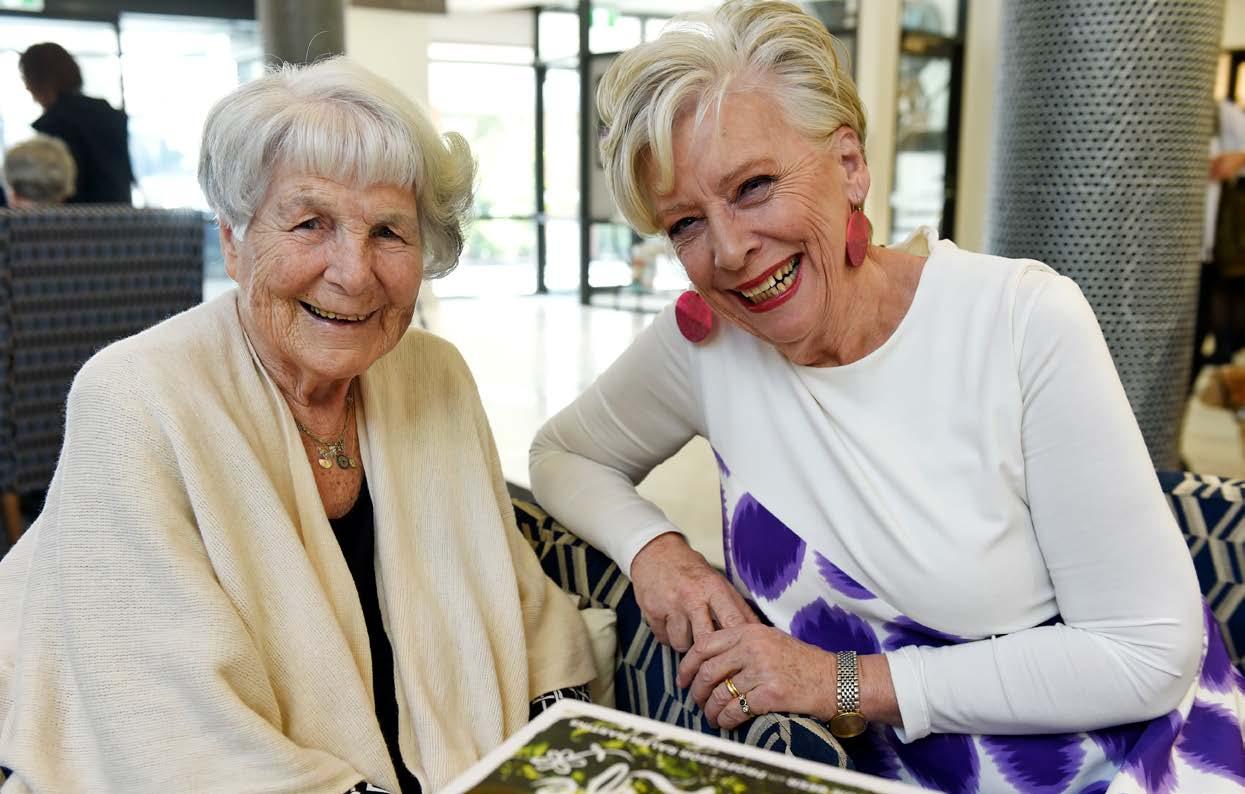
One of Australia’s most well-known and much-loved cooks, Maggie Beer, has been on an important mission. A food mission for older Australians that is. For more than five decades, we have grown to witness and experience her unbridled passion and joy around food. Maggie’s grassroots, no-nonsense approach to wholesome and local produce, has been the catalyst for creating hundreds of mouth-watering recipes which have been embraced in homes around Australia.

The opportunity for Maggie to direct that knowledge and elation around food to the most vulnerable communities in Australia was an opportunity for her that she could not refuse. If anything, Maggie has been front and centre using her voice and actions to create change to a sector that was starving for change.
For Maggie, it has been a true labour of love using her public platform through The Maggie Beer Foundation, to highlight the challenges and issues around aged care nutrition.
There have been significant challenges around meals offered in aged care facilities. Food nutritional value was the top priority and lacklustre offerings in some aged care facilities were a low blow to the residents. Aged care residents simply deserve better.
Early in the aged care food journey, Maggie joined forces with Dr Stephen Judd, the CEO of Hammond Homes and top chef Peter Morgan Jones to rewire food offerings at all Hammond Homes in Sydney. While progress was being made in Sydney, Maggie knew there was so much more that could be done to create significant change in the sector when it came to aged care residents and presenting them with quality, nutritious meals – Australia wide.
A mix of talks with the Federal Government as well as joining a State Board in Adelaide for the Aged saw Maggie continue to unravel the frustrating amount of work that needed to be done in this sector. But there was real hope for change. And Maggie knew that with her networks and profile, success was imminent, but she knew she had to drive it.
Despite a number of hurdles, in 2014, Maggie created The Maggie Beer Foundation and it was through the Foundation that
Maggie hit her stride in making a real difference.
Fast forward eight years, The Maggie Beer Foundation has delivered education programs to many cooks and chefs working in aged care homes across Australia, along with their CEOs and Managers.
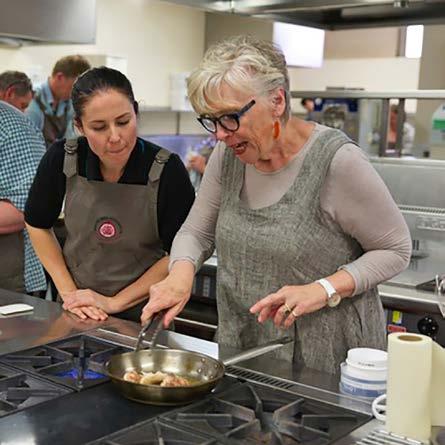
In April 2022, The Maggie Beer Foundation then launched its innovative online training program to improve food and nutrition across aged care facilities around the country.
As a world first, the online training, featuring 11 modules is designed to upskill cooks and chefs in Aged Care, and has been developed in partnership with Altura Learning and William Angliss Institute.
Maggie is front and centre in the video training modules, presenting alongside some of Australia’s leading aged care chefs and experts in food, nutrition and dining experiences.
From ‘Embracing Food from Diverse Cultures’, ‘Rethinking Texture Modified Food’, to ‘Cook Fresh, Chill, Enhance’, and ‘Delivering High Protein All Day’, the modules are choc-a-bloc with easy to follow ideas and insights to create beautiful and nutritious menus for aged care residents.
The beauty of the modules is that recipes can also be downloaded, and include details on ingredients, method, equipment, cost and nutritional profile.
And upon completion of the 11 modules, the participant is formally recognised by The Maggie Beer Foundation.
Older people deserve the very best food. Enticing delicious meals that uplift and bring joy.
“Older people deserve the very best food. Enticing delicious meals that uplift and bring joy. The findings of the Royal Commission into Aged Care Quality and Safety and from the discussions at the National Congress on Food, Nutrition and the Dining experience in Aged Care held in February 2021 identified that the training of cooks and chefs in Aged Care is a large factor in the meals that are served.
“Many of the cooks and chefs currently in Aged Care have no formal training in hospitality and are expected to learn on the job. The Foundation has been running face-to-face training courses since our inception in 2014 and what we know is that when that training is taken back into Aged Care homes, there have been positive changes in the well being of the residents and in the engagement of the staff,” Maggie said.
“We’re confident the online modules will see more cooks and chefs access training.
As a result, we expect improvements in food, nutrition and dining in Aged Care across the country.
“Altura Learning is highly credentialed and a leader in creating training for the aged care sector. Together, we have created high quality, practical training which will make an immediate difference to the lives of older Australians.” Maggie added.
To learn more about the online training modules, please visit The Maggie Beer Website https://maggiebeerfoundation.org.au/
As carers, it is important that nutritious and tasty food form part of your lives and your elderly loved ones. At home, it is so important to create meals that are enjoyed by all and are packed with the vitamins and minerals so you can all live well!
For some Maggie Beer inspiration, check out a couple of Maggie’s mouth-watering dishes that are not only good for you but will undoubtedly put a smile as big as Maggie’s on your face as well. ACG
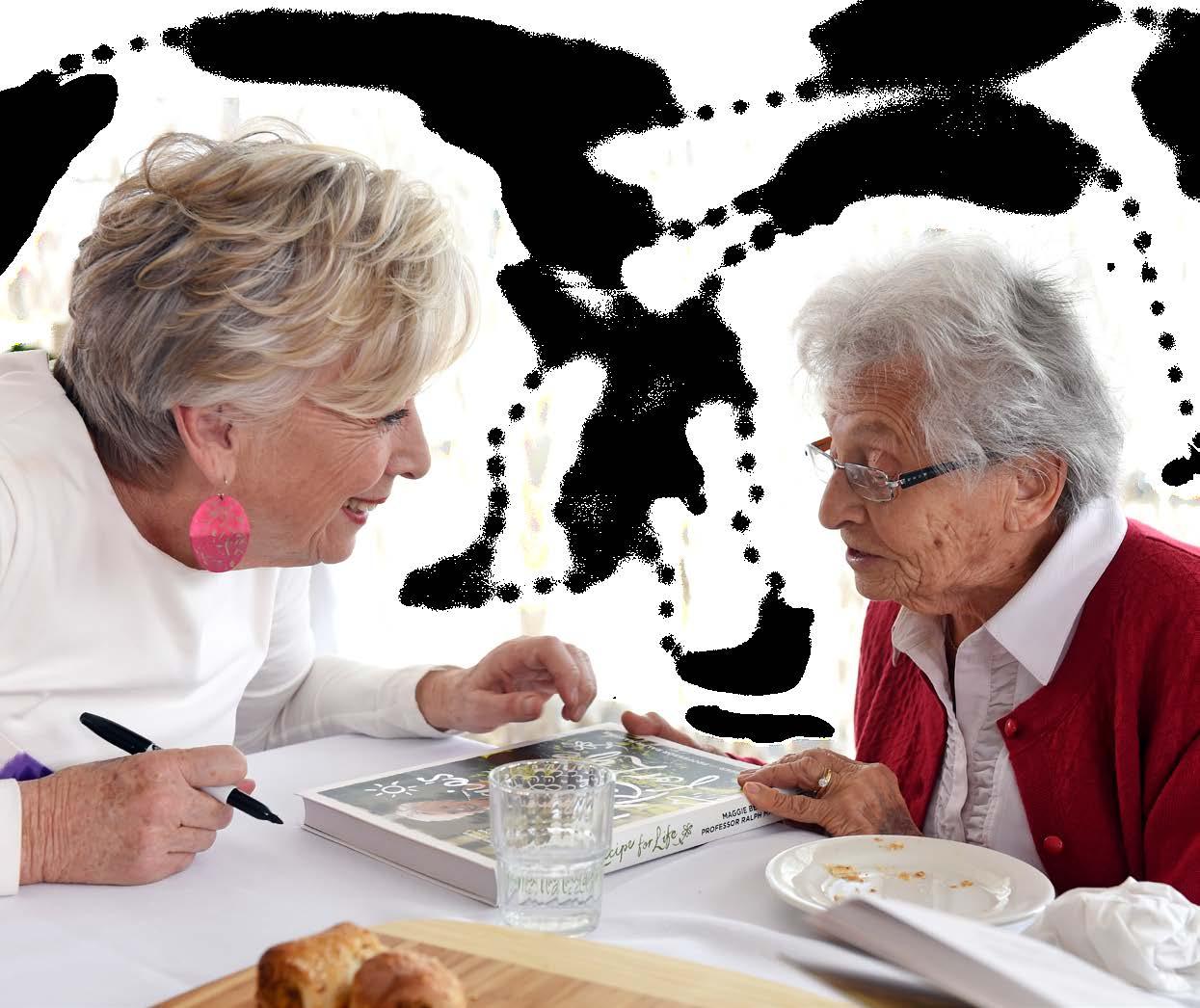
4 small zucchini (about 200 g in total)
2 tablespoons extra virgin olive oil
1 tablespoon

Finely grated lemon zest
Sea salt flakes
Freshly ground black pepper
1 tablespoon verjuice or lemon juice

Mint leaves, to serve
1. Preheat a barbecue grill to high.
2. Using a large sharp knife or mandolin, cut the zucchini lengthways into 3 mm thick slices.

3. Place in a bowl with the olive oil and lemon zest, then season with salt and pepper and toss to coat well. Grill for 1 minute each side, then place on a serving plate.
4. Drizzle with verjuice, scatter with mint leaves and serve.
8 large ripe apricots cut in half; stone removed 1/3 cup brown sugar
40g unsalted butter, cubed 2 tbsp verjuice or a squeeze of lemon Mint leaves, to serve MASCARPONE CREAM
600ml double thick cream 500g mascarpone
1. Preheat a fan-forced oven to 220 degrees.
2. Place the halved apricots in a bowl, add brown sugar, verjuice or a squeeze of lemon juice and gently combine
3. Transfer onto a baking tray, place a small cube of butter on top of each apricot, then place in the oven to roast for 15 to 20 minutes
4. Meanwhile whip the double thick cream to form stiff peaks, then gently fold through the mascarpone and place in the fridge.
5. Remove the apricots from the oven, allow them to cool for 10 minutes, then blend until smooth and place in the fridge until chilled and ready to serve.
6. Gently fold the apricot puree through the whipped mascarpone cream and serve.


TEXTURE MODIFIED DIET NOTE: Be sure to inspect the apricot puree for unprocessed lumps. If required, blend a little longer or pass through a sieve before plating and serving those on a L4 Puree diet.


Men aged 85 and older have the highest suicide rates in Australia, but the tragedy has gone relatively unnoticed. This group is growing older, feeling alone and flying under the radar.

The tragedy of suicide is recognised as a major public health issue. Yet what may come as a surprise to many is data published by the Australian Bureau of Statistics showing men over 85 have suicide rates more than three times the average rate.
Public perception is that men – in particular, young men – have the highest suicide risk. While this is true for the net number of suicides, if we don’t consider age-standardised rates (which account for differences in age distribution across the population) we miss a crucial finding.
Talking about problems is the first step in lowering all suicide rates.
Source: Australian Bureau of Statistics
Malnutrition might sound like a condition that only affects people without access to nutritious food, or any food at all – but in fact, it’s a major public health issue in Australia, particularly for older Australians. Lite n’ Easy dietitian Melissa Holloway explains further.
We know rates of malnutrition in residential aged care and public hospitals are high. However, research has identified that up to 17% of older adults in the community are also malnourished.
When left untreated, malnutrition negatively impacts a person’s daily function – their strength, energy levels and psychosocial well-being. It also increases the risk of a fall, likelihood of admission to the hospital and can reduce life expectancy.
A common experience in older age is a decrease in appetite – people just don’t feel as hungry as they used to.
Lite n’ Easy’s My Choice range is designed for older Australians who have smaller appetites.

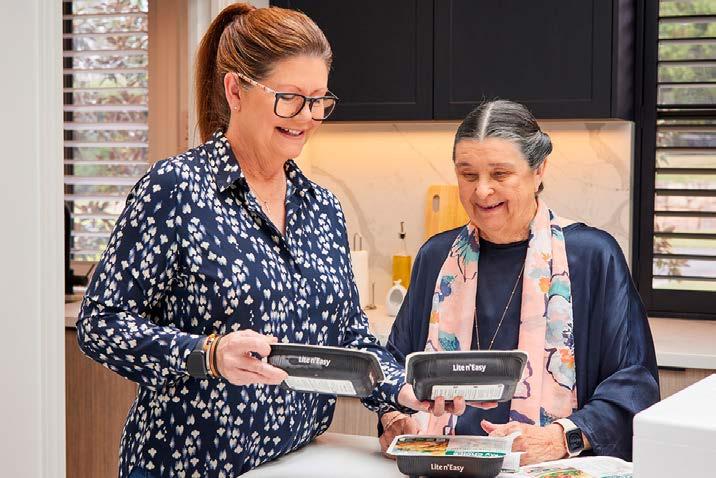
The My Choice range of main meals are smaller in size than our regular dinners, but importantly, provides the same amount of energy and protein.
Think you or someone you know could benefit from Lite n’ Easy? Order online using promo code ACG30% or, if you are a HCP recipient, call us on 13 15 12 and mention this offer to save 30% off your first order.
The Australian Cares Guide want to congratulate SiLVR and VMCH and all the other recipients on winning their first round of grants for the great innovated work they do.
Aged Care Research and Industry Innovation Australia (ARIIA) has announced the recipients of the First Round of its Grants Program.
The ARIIA Grants will support high-quality projects that address important gaps in the aged care workforce’s capability and knowledge and lead to relevant translational research findings for the benefit of the aged care sector.
Working in consultation with the sector, several topics have been identified as a priority for attention to improve aged care: Dementia Care; Rehabilitation, Reablement and Restorative Care; Mental Health and Wellbeing; Social Isolation; and Urgent and Critical Need.
ARIIA Grants have been awarded to five projects that address specific priorities:
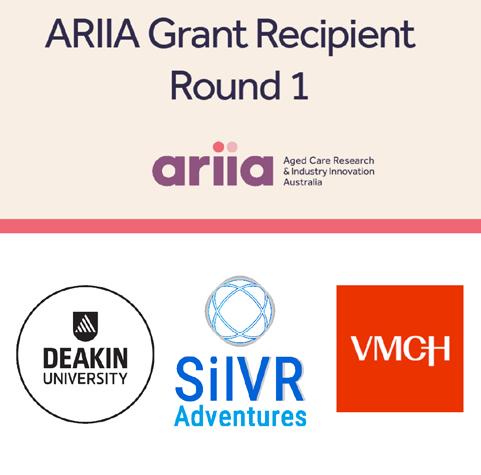
1. SA Innovation Hub, Kalyra, Bene Aged Care, Barossa Village, Resthaven, Be Well Co, Flinders University and Council on the Ageing (South Australia), for their project to implement interventions to support the retention of female workers aged 50 years and over in the aged care workforce (Urgent and Critical Need).
2. Aged Care & Housing Group, Dementia Training Australia, Queensland University of Technology and Flinders University, for their engagement matter project to support aged care frontline staff to engage meaningfully with people with dementia in a sustainable and effective way (Dementia Care).
3. Helping Hand Aged Care Incorporated and the
University of Notre Dame (Western Australia), for their project designed to retro-fit dementiafriendly environments and educate staff to become determinants of positive outcomes for people living with dementia in aged care (Dementia Care).
4. Deakin University, SilVR Adventures and Villa Maria Catholic Homes Limited, for their project to implement an innovative virtual reality experience for people living with mild dementia in aged care (Dementia Care).
5. National Ageing Research Institute (NARI) and Silverchain, for their project to implement technologysupported home-based care for older Australians (Urgent and Critical Need).

The Caring Circle project aims to improve health outcomes and end-of-life care journey of people living with a life-limiting illness (non-cancer) in rural Victoria.
Led by Murray PHN (Primary Health Network), the project aims to embed early advance care planning discussions and integrated patient-centred palliative care strategies.
The project is focusing on a series of strategies aimed to:
• increase the importance of planning and people’s end-of-life wishes being respected and documented, through community education
• enhance earlWy identification of people living with life-limiting illnesses to access general practice services
• engage early advance care planning discussions in the community

• expand palliative care education opportunities for health professionals.













The Murray PHN region spans from Mildura in north-west Victoria, to Woodend in the south, across to Seymour and up to Albury, NSW.
Carers and community members are invited to attend several upcoming events across the region, focusing on dementia, carer wellbeing and grief, loss and bereavement. For more information, visit www.murrayphn.org.au/ thecaringcircle

11/12 February 2023

Melbourne Convention & Exhibition Centre
Are you preparing for the future for yourself or for a loved one? The Melbourne Care & Ageing Well Expo is the place for you to speak to and learn from over 60 aged care professionals. With 60+ aged care exhibitors, the range will include (but not limited to) Residential Care, Home Care, Retirement Living, Equipment, Service Providers, Health Care, Legal and Financial, Medical, Consultants, Technology and Support Groups.
The Australian Carers Guide proud sponsors will be exhibiting so come and say hello. You will find us on Stand171 The expo is free to attend, however we recommend pre-registering online before the Expo to receive updates and make entry more streamlined. For further information on the event, exhibitors and seminars, please go to www.careandageingexpo.com.au
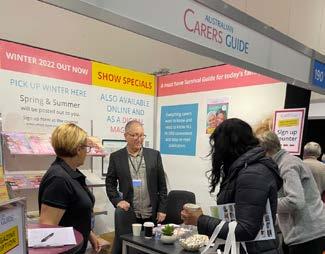


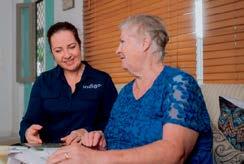
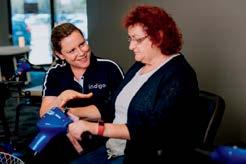




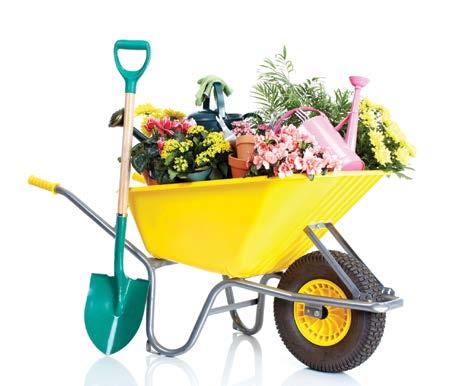 BY CAROLINE CHENOWETH
BY CAROLINE CHENOWETH
I can’t claim to have a green thumb. But what I can share are occupational therapy-based tips and tricks to help you stay safe while digging in with passion.
➊ Start slowly. During the “hibernating” months, most of us find our activity levels decrease a lot and, whether we’re aware of it or not, this results in our joints and muscles stiffening. On your first day of gardening, stay on the safe side by taking things easy and giving your body time to “de-thaw.” The best way to do that is to stretch, especially focusing on your back and hips.
➋ Lift properly. Don’t lift with your back. What that means is don’t keep your knees locked and bend at the hips. Instead, do bend your knees so that you’re closer to a sitting position and keep your back as upright as possible so that your legs are doing most of the work. The closer you are to the item you’re trying to lift, the less strain on your lower back and hips.
➌ How to kneel. Avoid putting both knees on the ground. Instead, have one knee bent in front of you and the other bent on the ground, ideally with a pad under that knee. This position encourages you to keep your back more upright without adding an extra pull on your lower back. And frequently change which knee is on the ground.
➍ Take a stretch break! Gardening is physically demanding—but sometimes your body won’t remind you of that until two or three days later. Minimise any future aches and pains by taking frequent breaks for stretching and rest.
➎ Protect your skin. Usually a good day for gardening means that the sun is shining –and it’s actually strongest in the spring. A sun hat is important, as is drinking plenty of water and regularly stepping back inside the house.
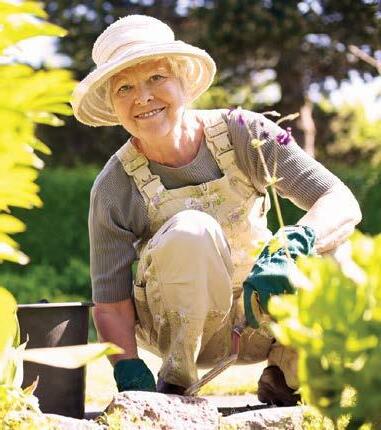
➏ Divide up the pie. If you have a large property, divide the work into sections and conquer your garden piece by piece. If you need to, put markers on a plant as pre-set reminders or stick pegs in the earth to make sure you stick to your plan.
➐ Listen to your body. If a part of you starts screaming with pain, put down the trowel and stop! Passions are meant to be performed pain-free.
Caroline Chenoweth has practiced occupational therapy within long-term care homes focused family health teams and acute-care hospitals. ACGMy mum has dementia and refuses to have a shower. It’s been weeks since we’ve been able to get her in the shower. Her head is itchy, her skin is itchy. I’m really concerned about her hygiene and welfare. What can I do?
Showering a loved one with Dementia can be tough. It is not uncommon for people with Dementia to have a fear of water, or a fear of entering a white space, which can present as a void to them. And, so understanding the reasons can be really helpful for you as a carer.
They may also feel powerless. Until you can get them in the shower/bath try sponge baths just to one part of the body per day, and possibly use dry shampoo to clean their hair until you are able to wash it properly.
My dad recently came to live with us after a hip replacement, and I’m happy for him to stay there, but he is becoming really mean to my children and I. What should I do?

Unfortunately, caring for elderly parents can become dangerous to the care-giver and their family, when faced with behaviour that may include yelling, abuse, lying, excessive demands, name calling and even contempt.
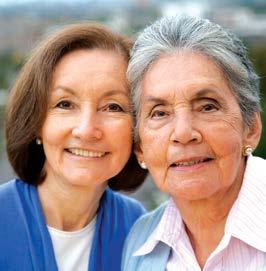
It’s really important for you to practice self-care, explain the challenges your dad is faced with to your children so they have a better understanding of the cause of his behaviour, and seek the advice of a Geriatrician to see if they can identify any underlying causes, and strategies to help you deal with them.
We are currently considering travelling to Perth for my nephew’s wedding. My 81 year old mother lives with us, and I’d really like for her to join us. Is it safe for her to fly?
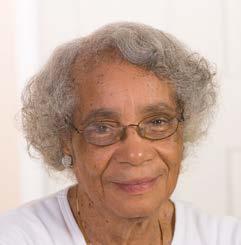
The great thing about travel for our elderly is that it keeps them active, and can increase their confidence as they are stepping out of their comfort zone and broadening their horizons, by going on a great adventure.
However, it is highly advised that you have them checked out by their GP to make sure they are healthy enough for the trip prior to making those final arrangements.

Whenever I visit mum and Dad their place feels like a sauna. Is that healthy for them?

It is difficult to try to reach a happy temperature medium for the elderly. They feel the cold so much more than everyone else.
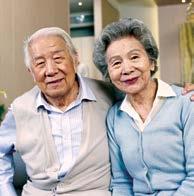
Although it can become problematic for the elderly if a room falls below 18 degrees, it is also important that the room temperature doesn’t go above 25 degrees, as this can bring on a whole range of other problems for them, like dehydration or urinary tract infections.
Just keep an eye on that thermostat, and perhaps bring it to their attention by possibly marking clear lines or creating a sign with a safe temperature range.
My elderly parents always give my children gifts, and it’s too much! I’m worried my children will associate their grandparents with receiving gifts. Grandparents can use gift-giving as a form of affection, particularly if they don’t see them as often as they would like to.
Perhaps you can explain that whilst you appreciate their affection, that the large number of material items is becoming problematic.
Maybe you can suggest alternatives like, reading a book with them, having regular face time, or even the gift of a hand written letter, encouraging the children to write back.

My mum won’t take her medication. I’ve tried all sorts of things, but she stubbornly refuses!
It’s a common thing for the elderly to refuse medication. There may be a number of reasons for the refusal, so consulting your GP is essential! Try to have a calm, rational conversation, and ask her why she is refusing to take it. It might be that they cause her to gag, she doesn’t like the taste or smell, or some other reason. Try to establish that first, so you can discuss it with the GP.
Also try to explain to her the purpose for each one, so that she understands that it was prescribed for a reason. There might also be different foods or beverages that she can eat it with which would make it more palatable. Whatever the reason, firstly establish what they are, then, in conjunction with her GP, try to reach a consultative solution.
Improve your memory, concentration and reasoning. The benefits of puzzles are numerous. They maintain or develop problem-solving skills, and help you relax, even when they are so frustrating.
Find as many words of three or more letters in the wheel as you can. Each word must use the central letter and a selection from the outer wheel – no letter may be used more times than it appears in the wheel. Can you find the nine letter word hidden in the wheel?
Can you find the words in the grid?
They will be placed only once and may be either horizontal, vertical or diagonal and go either forwards or backwards. Words can cross.
U O T K E H G P Q Q F U T B V H K A T G D M U F F I N A O
C A S K D C E R E A L N M A
W A U O I T U Z N R A E E C T O A E T R M R A S N L G O H
O B A G R U T J A E A F A C
S M T U O S C N T S F C P A
E A A S P H G T U E I R A S
L L R T U R E A E J K O N O
F O P H O O S U C L E I C T
F E A P N O I L I T R S A R
A H K O A M U M C R Q S K D
W R C T L S L E G A B A E Z
A A N P A S T R I E S N S K
B E G G S Q U S U L N T E X








9 Decorative style of design (3,4) 1 0 Form of expression (5) 11 Extraterrestrials (6) 12 Mischievous sprite (3) 13 Extra component (3-2) 14 Bright red (7) 15 Repeat from memory (6) 16 Strongholds (8) 18 Dark towering cloud (12) 20 Shields from (8) 24 Describe an event as it happens (10) 27 Sorrowful (5) 28 Mark left from a wound (4) 30 Short hollow thud (4) 31 Chatter (7) 32 Outfit (7) 33 Free from doubt (4) 34 Cloth worn around the waist (4) 36 Committee (5)
Mood or tone of a place (10)
Elementary negatively charged particle (8)
Excessively loud (12)
Competition participants (8)
Unmoving (6)
Learning institutions (7)
Join together as one (5) 50 Herb (3) 51 Mottled marking (6) 52 Merchandise (5) 53 Listless (7)
1 Highly seasoned sausage (6)
Sporting venues (6)
Spiritual meeting (6)
Homes (6) 5 Tact (9) 6 Give out (4)
Humorous television drama (6) 8 Directions (12) 10 Imprecise; wrong (10) 11 Garment worn in the kitchen (5) 16 Sleeveless cloaks (5)
Female deer (3)
Flatfish of the plaice family (5,4)
Underwater projectile (7)
Clear mess away (5,2)
Declaration (9)
Pose a question (7)
Prepare for printing (7)
Military judicial body (5,7)
Touching (10)
Suspends (5)
The edge of an area (9)
Vehicle (3)
Stomach crunches (3-3)
Money (5)
Without difficulty (6)
Measuring the duration of an event (6)
Entrance hall (6)
Walks (6)
Fastened with stitches (4)




7 LETTERS FLIPPED LOUTISH SCREAMS SQUALID 9 LETTERS BARBARISM Find the path out without breaking through walls.
3 LETTERS BIB FEW HUM MOP MOW ORE SIN THY YOU 5 LETTERS BENDS CLASH DOORS EXULT JAILS KNOWS LIKES SEWER TELLS TUCKS WILDS YUCCA


When it comes to Aged Care, acronyms are plentiful…ACSA, HCP, CHSP…
But what do they all mean? Fear no more. We’ve compiled a list of the most commonly used ones – how they work and their service to the community.
ACAT
Helps the elderly and their carers determine what kind of support will best meet their needs when they are struggling in their current living situation.
Ever had a chat with someone where the talk is littered with acronyms – but you have absolutely no idea what they are saying?
ACAS: Aged Care Assessment Service (Victoria)
Only provides teams who help frail older people and their carers, to work out what kind of care will best meet their needs. After each assessment, a patient’s level of support and service needs are recommended.
ACF/ACH: Aged Care Facility or Aged Care Home Accommodation for older people who can no longer live at home independently, who require help/support for everyday tasks/health care.
ACIA: Aged Care Industry Association (ACIA)
Association of aged care providers, whose members operate residential aged care, home care, home support and retirement living services.
ACS: Aged Care Services Support and services provided to older people in their own home or in an aged care home to assist with everyday living, health care, accommodation and equipment.
ACSA: Aged & Community Services Australia
The leading national peak body supporting not-forprofit, church and charitable providers of retirement living, community, home and residential care.
ADL: Activities of Daily Living
Refers to the basic skills needed to properly care for oneself and meet one’s physical needs in six areas: eating, dressing, bathing, toileting, continence, and mobility. It’s used as an indicator to determine the level of care and supportive services needed in senior’s care plan.
AIP: Ageing in Place Indicates that a resident can enter an aged care facility at low care and can remain there as their care needs increase to a high care.
ATSI: Aboriginal Torres Strait Islander
CA: Carers Australia
The national peak body representing Australia’s unpaid carers, advocating on their behalf to influence policies and services.
CBC: Centre Based Care
For elderly people who require low to medium living support, group activities, excursions and social support are provided in a local centre.
CC: Community Care Personalised care and support services to help the elderly continue living at home.
CDC: Consumer Directed Care Are services chosen by the elderly person living independently at home, they decide the types of services and care and the providers of the services.
CHSP: Commonwealth Home Support Program
The entry-level home support program assists older people to live independently in their homes and communities. It also provides respite services to give carers a break.
COTA: Council on the Ageing Provides leadership in social policy and community information, and education for older persons.
CRCCs: Commonwealth Respite & Carelink Centres
Assists carers by providing access to information, respite care and other support appropriate to carers’ needs and circumstances, and the needs of those they care for.
DAP: Daily Accommodation Payment
Is the daily non-refundable payment for accommodation in an aged care home. It can be paid regularly up to a month in advance, similar to paying rent.
DOH: Department of Health Develops and delivers policies and programs and advises the Australian Government on health, aged care and sport.
DTC: Day Therapy Centre Offer a range of services (physiotherapy, podiatry, occupational therapy) for older people living independently either in their own home, or aged care homes.
HC: Home Care Services/support given to older people with care needs to live independently in their own homes.
HCP: Home Care Packages
A program funded by the Australian Government to support older people with complex care needs to live independently in their own homes. They use a consumerdirected care approach to ensure the support suits a person’s needs and goals.
HCS: Home Care Service(s)
Support/care services provided to an elderly person in their own home.
ILU: Independent Living Unit
A small home designed for older people who are actively independent, usually in a village environment.
MAC: My Aged Care Provides the entry point to the Australian Government Funded aged care services for the general public.
NDIS: National Disability Insurance Scheme
NDIS provides information and connections to services for people with disability. The scheme also provides support for their families and carers.
NESB: Non-EnglishSpeaking Background
NSA: National Seniors Association Is a not-for-profit membership organisation and advocacy group of working and retired older Australians.
OPA: Office of Public Advocate
OPAN: Older Persons Advocacy Network
An agency that can provide information to consumers their families and carers about their rights and responsibilities when accessing aged care services.
RAD: Refundable Accommodation Deposit
Is a lump sum payment for accommodation in an aged care home. This is the price of a room, in lump sum form that you have agreed with your aged care home to pay and is fully refundable when you leave the aged care facility.
RAS: Regional Assessment Service
Is the program which undertakes aged care home support assessments.
RC: Respite Care Services designed to give carers a break from their caring role during planned or regular breaks, short holidays or emergencies.
RV: Retirement Village Group of residential premises predominantly occupied by senior citizens who live in apartment style rooms /suite of rooms.
SM HCP: Self-Managed Home Care Packages
A program funded by the Australian Government to support older people with complex care needs to live independently in their own homes. The elderly package receiver can choose the provider(s) and services given, including the workers or contractors, when the services are provided and can control how the funding is spent.
STRC: Short-term Restorative Care
A program which provides services to older people for up to 8 weeks (56 days) to help them delay or avoid long-term care.
VHC: Veteran’s Home Care Home care for eligible veterans, war widows/ widowers through the department of Veterans’ Affairs.




















5
8
6 1 9 5 7 4 8 3 2 2 4 3 6 8 9 5 7 1 7 8 5 3 1 2 9 4 6 1 6 8 4 5 7 2 9 3 5 9 4 1 2 3 6 8 7 3 7 2 9 6 8 4 1 5 9 3 7 2 4 5 1 6 8 8 2 6 7 9 1 3 5 4 4 5 1 8 3 6 7 2 9
6 8 2 4 9 7 5 3 1 7 1 5 8 6 3 2 9 4 9 3 4 1 5 2 8 6 7 8 2 3 5 7 4 9 1 6 1 9 7 6 2 8 3 4 5 4 5 6 3 1 9 7 8 2 2 6 9 7 8 1 4 5 3 3 7 1 9 4 5 6 2 8 5 4 8 2 3 6 1 7 9
act, acting, antic, cacti, cage, can, cane, cant, cap, cape, cat, cent, cine, cite, enact, epic, ice, nice, pace, pacing, pact, panic, pecan, pectin, pica, tic

BOOMERANG
TARGET: 35, GOOD: 48, EXCELLENT: 58
Emergency assistance 000 (24 hours/7 days)
Lifeline’s 24/7 service on 13 11 14
Suicide Call Back 1300 659 467 24/7 telephone counselling service
Beyond Blue’s support 1300 22 46 36
SANE Australia’s service 1800 187 263
Carer Gateway 1800 422 737
Urgent mental health care for anyone having a mental health crisis:
NSW Mental Health Line 1800 011 511
ACT Mental Health Triage Service 1800 629 354
SA Mental Health Triage Service 13 14 65
NT Crisis Assessment Triage Service 1800 682 288
WA Mental Health Emergency Line 1800 676 822
QLD 24-hour mental health care 1300 642 25
TAS Mental Health Services Helpline 1800 332 388
VIC Mental Health Services go to health.vic.gov.au for your local provider
MindSpot Clinic call 1800 61 44 34 for adults with anxiety or depression
QLife’s support service on 1800 184 527
National Dementia Helpline 1800 100 500
Centrelink for Carers & Disability 13 27 17
Aged & Disability Advocacy 1800 818 338
Centrelink for ABTSI 1800 136 380
Centrelink for older Australians 13 23 00
Department of Veterans Affairs 1800 555 254
My Aged Care 1800 200 422
Medicare 13 20 11
Elder Abuse Prevention 1300 651 192
Translating and Interpreting Service (TIS National) 13 14 50 and 1800 131 450
000)
National Continence Helpline 1800 330 066
Healthdirect for a nurse triage service 1800 022 222 (all states except for Victoria)
NURSE ON CALL phone 1300 60 60 24 for health help from registered nurses in Victoria Poisons Information Centre 131 126 for 24/7 assistance

1800 RESPECT 1800 737 732 for sexual assault/domestic and family violence counselling
Gambler’s Help hotline 1800 858 858 24/7 Australian Men’s Shed Association 1300 550 009
MensLine Australia 1300 78 99 78 support to helping men deal with relationship problems
GLBTI peer support on 1800 184 527 Mon–Thurs 6 pm–10 pm, Fri–Sun 6pm–9pm
National Alcohol and Other Drug 1800 250 015 for free 24/7 Hotline support
National Debt Helpline 1800 007 007 for free financial counselling
Relationships Australia 1300 364 277 relationship support services
Translating and Interpreting Service Dementia Support Australia 1800 699 799
At Bupa Aged Care, whether for respite short-stay or as a new home, our experienced registered nurses and carers provide the care each resident needs in the way they prefer. Care is first and foremost.
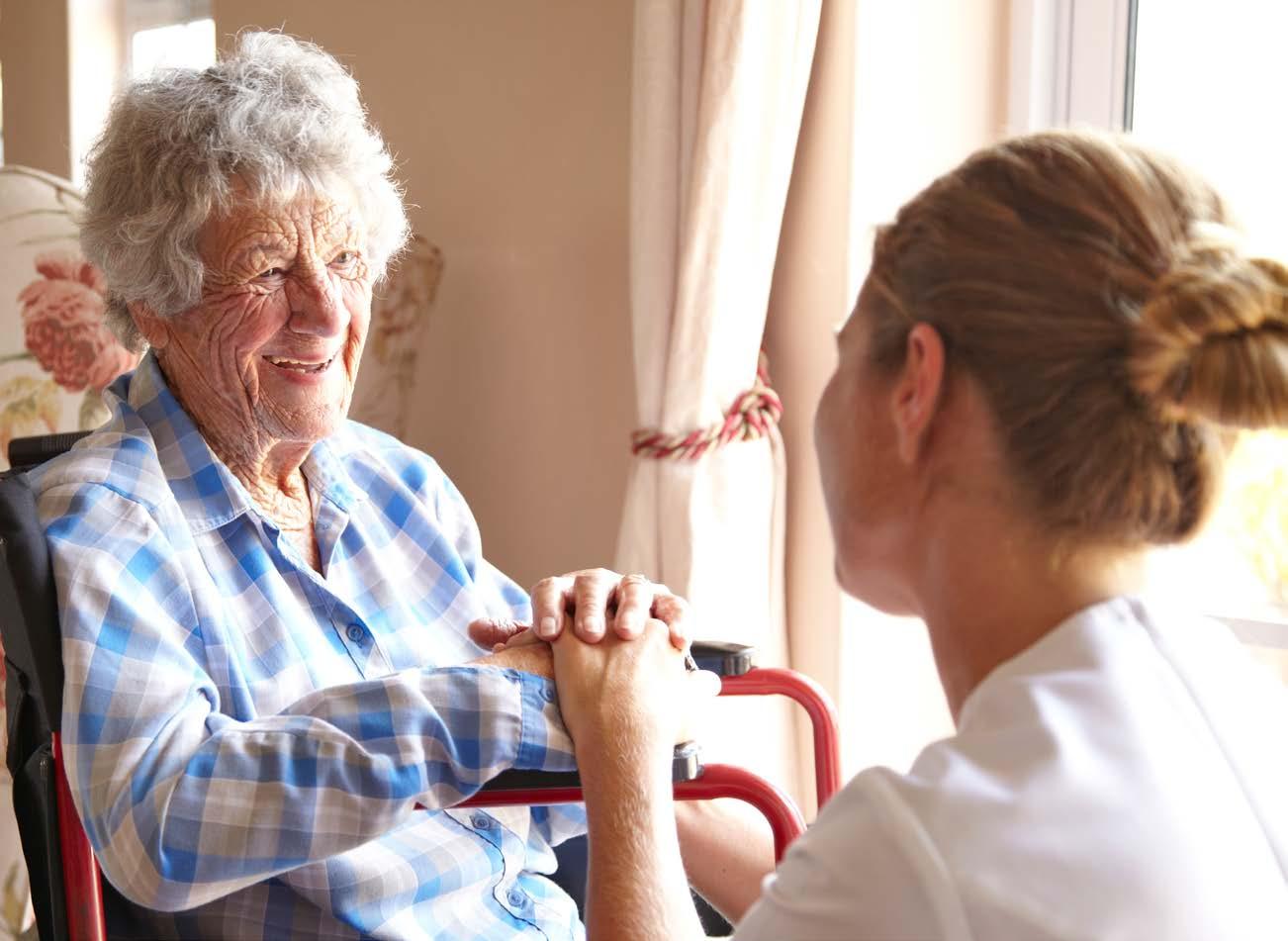
We embrace and support residents to live their day their way, with teams dedicated to their well-being.
People rarely expect to need aged care, but if your family does, we’ll guide you through the steps.
New residents welcome.
For more information or to book a visit, call 1800 954 125 and mention this ad to access the Australian Carers Guide Reader’s respite offer (Ts&Cs apply).*
*Offer details and Ts&Cs available at bupaagedcare.com.au/carer